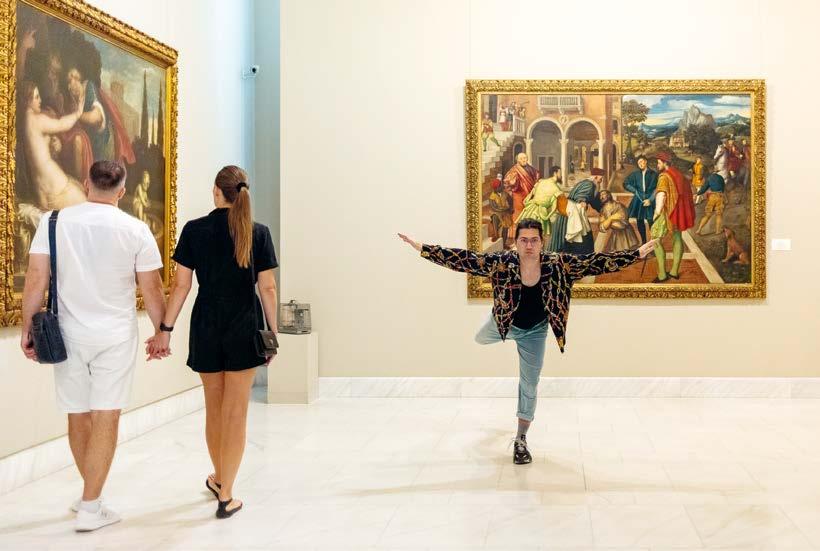
It’s a new dawn
It’s a new day
It’s a new life
For me
And I’m feeling good
Dragonfly out in the sun you know what I mean, don’t you know Butterflies all havin’ fun you know what I mean Sleep in peace when day is done
That’s what I mean
And this old world is a new world And a bold world
For me
From: Feeling Good (1964), written by Anthony Newley and Leslie Bricusse
2 Editorial
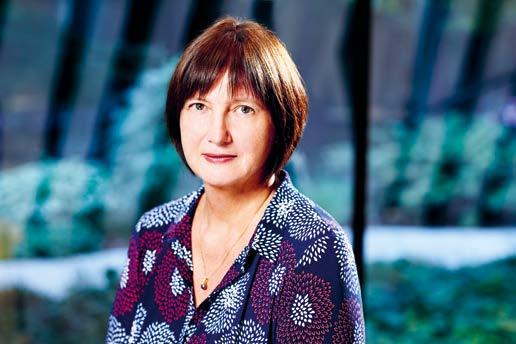
In its original meaning, the word crisis (which has the same Greek root as criticism) indicates a judgment, decision or escalation. A crisis-laden development intensifies a situation; it changes the direction and focus, and it threatens a loss of control. Depending on one’s perspective and interest, a crisis may turn into an opportunity or it may fill one with dread of an imminent catastrophe. Either way, an escalation demands a response.
ERSTE Foundation addresses today’s diverse crisis scenarios in multiple ways. Firstly, as an assertive core shareholder of Erste Group, one of the largest financial services providers in Central and Eastern Europe, with a responsibility for businesses and society that derives from its history. And secondly, as an active contributor to European social, democratic and cultural life. This annual report shows readers how we did this in 2023.
Our new visual identity aims to underscore the fact that ERSTE Foundation is repositioning itself in its various roles, and that it is growing and honing its strate
gic focus. The new design is a symbol of our desire to set out in a new direction. This design is more flexible, more open and can also prove itself in organisational constellations that the future has in store for us.
We invite you to flip through the report and discover how we responded to some of the escalations of the past year.
The bee has left its frame, it now flies outside the box and continues to lead our way.
Maribel Königer Director of Communications, Journalism and Media
3
-
Photo – Peter M. Mayr
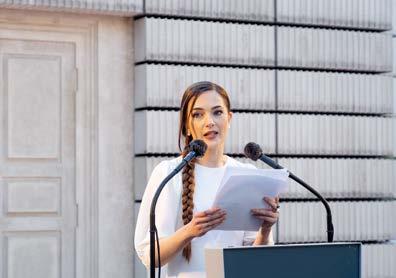
Ukrainian human rights lawyer Oleksandra Matviichuk delivered A Speech to Europe at Vienna’s Judenplatz in 2023.
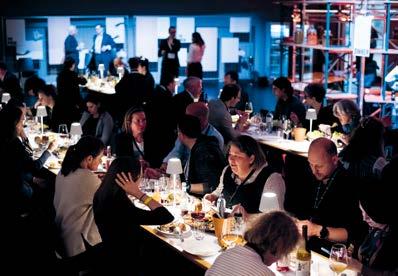
Bee Day 2023: To mark World Bee Day, ERSTE Foundation invited its stakeholders to its first-ever community meeting on Erste Campus.
The cover image shows an artistic intervention from »Collective Exhibition for a Single Body – The Private Score – Bucharest 2023«, curated by Manuel Pelmuş and photographed by Serioja Bocsok. More on page 93.

The fifth edition of the Kyiv Biennial went international. Vienna was the main exhibition venue.
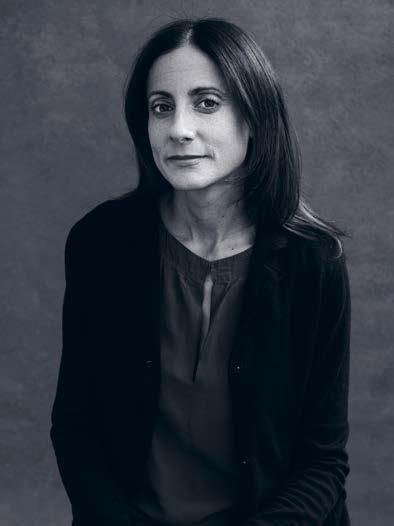
Nathalie Tocci, one of Europe’s leading political scientists and Europe’s Futures Fellow 2022/2023, describes how Russia’s full-scale invasion of Ukraine transformed Europe in her essay of the same name.
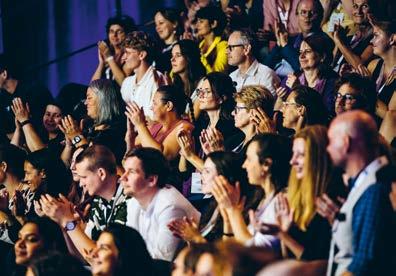
Ten years NGO Academy! Since day one, it has offered opportunities for dialogue and learning for civil society organisations in Central and Eastern Europe.
4 Content
18 24 80 42 66
A Year of Orientation
There's Always a Tomorrow
ERSTE Foundation: Core Shareholder With Social Responsibility
It’s a New Dawn, it’s a New Day Kirsten Dunlop: We Need to Change Our Notion of a Design for Life
A Speech to Europe by Oleksandra Matviichuk: Values Must Be Defended
A World Without Bees Is Uninhabitable: Bee Day 2023
Financial Health for All Erste Social Finance Holding: It's All About Scaling Up Now Social Impact Bond Helps Finding Meaningful Jobs
Empower Those Who Care
Ten Years NGO Academy: A Decade of Impulses for Civil Society
How Is Digital Respite and Care Counselling Working?
Hospice Umbrella Organisation: 30 Years in the Service of Humanity
Stand Up for a Democratic Europe
Pluralis: At Least One Independent Voice in Every Country Time to Decide Europe Summit 2023
Nathalie Tocci: How Russia's Full-Scale Invasion of Ukraine Transformed Europe Europe’s Futures – Ideas for Action: Fellows 2022/2023
European Forum Alpbach 2023
Create Spaces for Contemporary Culture Kyiv Biennial 2023: »Exhibition of the Year!« Omnia Communia Deserta
Collective Exhibition for a Single Body –The Private Score – Bucharest 2023
ERSTE Foundation Network What Happened in 2023? Talk Europe!
Jutta’s Choice: New Additions
Financial Statements 2023
Notes to the Financial Statements 2023 Status Report 2023
Association Members of »DIE ERSTE österreichische Spar-Casse Privatstiftung«
5
Boards and Team Publishing Details 6 8 12 16 18 24 32 36 42 48 50 56 60 66 72 76 80 88 93 96 102 108 113 121 134 140 143 144 Introduction Theme Financial Health Empowerment Europe Culture Network Library Financial Statements Association Teams
2023 began with so much hope! Europe was united in responding to the challenges posed by the Zeitenwende – the historic turning point announced in 2022: it was determined to support Ukraine to end the war and its terrible consequences as quickly as possible. At long last, the plan to enlarge the European Union truly regained momentum. Across Europe, politicians and business leaders were confident that the pressure of rising prices would soon ease again. The mammoth task of restructuring our energy system seemed less utopian as states and companies took greater steps in this direction.
A Year of Orientation

6
Introduction
Photo – Peter M. Mayr
By the end of the year, however, even the most optimistic of optimists were forced to realise that things often turn out differently than expected. Widespread disillusionment has set in.
If you wish for an economically strong, innovative, socially and geopolitically influential Europe, you can but view the future with scepticism. 2024 is a big election year. The sense of disillusionment that has taken hold could once again give a boost to populists. Will they renew the old continent so it regains its economic strength? Will they also protect its social systems, combat climate change, and help Ukraine defend freedom and peace for all of us?
The tasks Europe is facing are huge. It will have to address them, regardless of who wins the presidential election in the US: with courage and professionalism, with the will to cooperate, but, ultimately, also with consistency.
It is not always clear to everyone how far Europe’s economy has fallen behind the US over the past 20 years. And the social consequences this might entail are even less clear. Dependent on raw materials and energy, unable to defend itself on its own, Europe relies on its economy both to give it weight and to provide the foundation for its social systems. Prosperity for everyone is a dream that can still be dreamt in Europe.
The year 2023, however, gave rise to disillusionment. Europe continued to follow a pattern that has been in place for some time: big announcements are made, but it is almost surprising how little has been done to deliver on them. Not much remained of the German chancellor’s courage in proclaiming the great Zeitenwende when it came to providing rapid military support to Ukraine. The Green Deal, which the EU launched with the aim of setting the right course for the planet but also for Europe’s businesses, is still awaiting implementation. While a thousand plans for everything we could do to strengthen the EU community are ready and in place, nothing is being put into practice. If Europe does not want to dwindle into political insignificance, this must change.
In the years to come, we’ll have to look at what roles politics and civil society can play in this. You don’t have to be a determined optimist to know that it is often precisely those situations when all hope seems to be lost that prepare the ground for new ideas and the courage and energy to put them into action.
ERSTE Foundation is certainly not a place where general disillusionment has been able to take hold. Its confidence in the future is unshakeable, arising from the projects it supports. Where real impact is achieved, there is no room to fear the future. Where new solutions are being tried, there is no resignation. On the contrary: ERSTE Foundation is in the process of expanding. It is doing this with the conviction that Europe can and should hold a special position in the world due to its exceptional balance of political stability, cultural diversity, economic weight and societal security.
Erhard Busek passed away two years ago, followed by Karl Schwarzenberg last year. Two of the greatest Europeans of all time, they were both closely associated with our group. They left their mark on many of us and had a decisive influence on our work in the association, in the foundation and in our banks. Our obligation to carry on their ideas and dreams for the European continent arises from this connection.
Enshrined in our governing document is our commitment to work to create prosperity for ALL.
Andreas Treichl Chairman
Supervisory Board Members
Andreas Treichl (Chairman), Bettina Breiteneder, Maximilian Hardegg, Barbara Pichler, Johanna Rachinger, Philipp Thurn und Taxis, Markus Trauttmansdorff, Manfred Wimmer, Kurt Zangerle
7
There’s always a tomorrow. With one crisis after the other obstructing the prospect of a better future, this has almost become an empty phrase in recent years. Yet it is true: there is always another day, and another one after that, and we can prepare and shape these days. At least, we have to give it a try. Every day is a new opportunity to do that. We at ERSTE Foundation once again took this particularly seriously in 2023.
There’s Always a Tomorrow

8
Introduction
From left to right: Boris Marte (CEO), Eva Höltl, Martin Wohlmuth and Wolfgang Schopf (Deputy CEO). Photo – Peter M. Mayr
There was another day for the Speech to Europe, for example, a traditional event that returned in 2023 after a pandemic hiatus. Human rights activist and Nobel Peace Prize winner Oleksandra Matviichuk was insistent in explaining to a large audience in Vienna’s Judenplatz that it is also a peaceful and free Europe that is being attacked by Russia’s war of aggression against Ukraine and that Europe must not passively accept this. The war did not end in 2023; instead, a feeling of exhaustion has spread. The Ukrainians’ suffering has faded into the background. The pledge to provide them with military support is being called into question in Europe and the US.
At ERSTE Foundation, we did not let ourselves be drawn into that sense of exhaustion but continued to provide support. The 2023 Culture Policy Labs, launched in December 2022 in collaboration with the Ukrainian Ministry of Culture and Information, focused on »Culture, Social Resilience and Well-being« and »Creative Entrepreneurship for Ukraine’s Recovery«. Ukrainian and Austrian experts worked on very specific ideas concerning the cultural and creative industries for the time after the war. ERSTE Foundation also joined forces with the European Centre for Freedom and Independence to launch the Professional Integration HUB, which aims to help Ukrainians get internships in Austria that match their qualifications and can even enhance them – for a good, free, self-determined future.
Russia’s annexation of Crimea and the attack on the whole of Ukraine have shattered the long-established peace architecture in Europe, challenging Europe’s security, its economic resilience and its previous energy policy. Together with the Institute for Human Sciences (IWM), we therefore continued the Time to Decide Europe Summit in 2023, which gathered experts from across Europe in a large-scale, open format to discuss how to move forward. Austria’s Foreign Minister Alexander Schallenberg delivered the opening address on this day of open dialogue, while Frans Timmermans, then still Executive Vice President of the European Commission for the European Green Deal, gave his assessment of the situation via video message. Three major questions dominated the rest of the day: How does Russia’s war in Ukraine change Europe’s geopolitical position? What challenges is democracy facing? And how can Europe respond to inflation and the new energy policy situation?
The cacophony of 2023’s multiple crises almost drowned out one calamity: the threat that our planet faces from climate change and the decline in biodiversity. To bring that back to mind we organised our first Bee Day on 17 May. Every year from now on, around World Bee Day on 20 May, we want to gather people who are affiliated with ERSTE Foundation, offering an opportunity to get away from the daily grind and
to increase our awareness, stimulate our grey matter and inspire each other by sharing ideas. The first Bee Day focused on how to find good strategies for necessary changes. We ran through some possibilities, focusing on the future of food, for example. If we want there to be a tomorrow, we also have to look at how we eat. It was here that we learnt that change can also be fun, even something to relish. It all depends on how you do it.
Incidentally, this is a phrase we come across in everything ERSTE Foundation sets out to do: it all depends on how you do it. Continuous improvement was also the focus of TwoNext in 2023. Founded in 2021 by ERSTE Foundation, the start-up completed the first pilot phase of Alles Clara last year. The app, which gives family carers easy access to professional counsellors while ensuring information privacy, has already proven its worth and is now being developed further. All the major Austrian aid organisations are helping to ensure that people caring for family members in need of care can access support at precisely the moment when they need it. Smart and trustworthy technical solutions can make life so much better, so TwoNext is working to ensure that many more people can benefit from this. And TwoNext will grow. We all know that demographic change will considerably challenge our society and the care system.
Being part of civil society, at ERSTE Foundation we are aware that while individuals, companies and organisations often have excellent ideas for solving social problems, they frequently lack the financial resources to turn them into reality, and sometimes they also lack the know-how to make the most of their projects. Erste Social Finance, a joint initiative of ERSTE Foundation and Erste Group, provides both: the financial products to turn ideas into real impact and the financial literacy that is essential for individuals, companies and organisations alike to achieve personal and social goals. Erste Social Finance also broadened its expertise in 2023, laying the strategic groundwork it needs to reach its full impact in the coming years. This is true for the Erste Financial Life Park (FliP), whose financial education programme for schoolchildren successfully expanded into other Austrian states, as well as for social banking and social finance. The success of the Social Impact Bond, which was completed in 2023, gives us great confidence in looking ahead to future possibilities (more details starting on page 36).
Overall, ERSTE Foundation spent much of 2023 working on what should be possible in the future. We have increased our staff numbers, bringing new expertise, new perspectives and experience into the organisation. Not only did we strategically realign Erste Social Finance, but we also continued our three-year research project on financial well-being with the University of Tartu and started to contemplate how to
9
translate the experience gained into a lab model. We want to capitalise on the wealth of research data to flesh out initiatives and solutions. There is still so much that we do not yet understand well enough.
Together with the IWM, in 2023 we started to think about how we can lead Europe’s Futures, a large network of fellows we have been building for years, into the future. It is already an indispensable part of the European public sphere. Its expertise is listened to, whether it is about the momentum of European enlargement or reforms of EU institutions. The aim is to further enhance cooperation in future. Regardless of the outcome of the EU 2024 elections, it will be part of a scholarly based, humanistic tomorrow and strengthen European democracies.
In 2023 it also became clear that democracy is an achievement that is not self-sustaining. Anti-democratic movements made their voices heard in many places. This makes it all the more vital for us at ERSTE Foundation to boost independent journalism – the all-important fourth estate – in Eastern and Central Europe. This is also the aim of the first impact investment we made in this area: in Pluralis, a Dutch fund that invests in media that are at risk of being appropriated and losing their independence. Developments in Eastern Europe in recent years have shown just how quickly this can happen.
Freedom of the press leads us on to freedom of art and the freedom that art can create. November’s Kyiv Biennial showed us just how powerful this can be. The exhibition not only provided an opportunity to get to know Ukraine but was a genuine pan-European event. The tomorrow we are working for was clearly evident: a larger, united, social, innovative, free and peaceful Europe that looks to the future with confidence. Every day offers another opportunity to continue working towards this. At ERSTE Foundation, we also want to get better every day.
Boris Marte Wolfgang Schopf CEO Deputy CEO
Martin Wohlmuth Eva Höltl Board Member Board Member
10
Introduction
ERSTE Foundation is a private savings bank foundation under the Austrian Savings Bank Act. In accordance with its statutes, the foundation must perform two tasks in parallel: serving the common good and holding a permanent stake in Erste Group Bank AG.
Erste Group increases dividend payment
In order to serve the common good, ERSTE Foundation strives to invest part of its dividend from its stake in Erste Group Bank AG (Erste Group) in philanthropic projects. Each year, the bank’s managing board submits the proposed dividend payment for approval at the general shareholders’ meeting.
As Erste Group reported an operating result of almost EUR 4 billion (+16% compared to the previous year) in 2022, a dividend of EUR 1.90 per share was paid in May 2023, an increase of almost 20% compared to the previous year. ERSTE Foundation used this dividend income to finance ongoing operations and ERSTE Foundation grants and, on the other hand, to reduce foundation liabilities by EUR 50 million. In addition, ERSTE Foundation further increased its stake in Erste Group.
ERSTE Foundation: Core Shareholder With Social Responsibility
Increase of the stake in Erste Group
In accordance with the foundation statutes, ERSTE Foundation must have a permanent and qualified stake in Erste Group. The foundation increased its stake in Erste Group’s share capital by 0.15 percentage points to 11.7% during the 2023 fiscal year by acquiring shares on the stock exchange. ERSTE Foundation forms a syndicate, together with the savings bank group consisting of Austrian savings banks, numerous savings bank foundations and share management savings banks as well as Vienna Insurance Group/Wiener Städtische Wechselseitiger Versicherungsverein – Vermögensverwaltung. Since the savings bank group also bought shares in Erste Group in 2023, the syndicate’s stake increased by 0.65 percentage points to 24.5% of the voting rights in Erste Group. The contract that forms the basis for this syndicate was extended until 2032. The syndicate agreements entitle ERSTE Foundation to influence how contracting partners vote at Erste Group supervisory board elections. The savings bank group, which collectively holds a syndicate share of around 7.5%, has the right to nominate two members of Erste Group Bank AG’s supervisory board. In the past, ERSTE Foundation supported Erste Group in its regional and national investments and therefore repeatedly participated in Erste Group’s capital increases, consequently incurring liabilities. ERSTE Foundation’s debt at year-end 2023 stood at EUR 100 million. The foundation plans to use the expected dividend yield to pay back these liabilities by the end of 2027.
Erste Group share
After the setbacks suffered in the previous year, the Erste Group share posted significant gains in the year ended and closed the reporting period at EUR 36.73, up 22.8%. The Erste Group share marked its 2023 high at EUR 37.23 on 4 December and its low at EUR 28.19 on 24 March. The key factors driving the share price were a positive view of the industry, results beating analysts’ expectations as well as an upward revision of targets for the year 2023. The focus of market participants was also on forecasts for 2024, including the return on tangible equity (ROTE), future banking taxes and, last but not least, expectations about capital distributions.
12
Introduction
Shareholder structure as of 31 December 2023 by investors (in %)
Total number of shares: 429,800,000
Savings
and savings bank foundations*
* ERSTE Foundation controls 24.53% of shares in terms of the voting rights at Erste Group’s supervisory board elections (including 12.84% from the shares of the savings banks, the private savings bank foundations, Wiener Städtische Wechselseitiger Versicherungsverein and Erste Employees Private Foundation) and directly holds 11.69% of Erste Group.
Wiener Städtische Wechselseitiger Versicherungsverein* Employees*
Project implementations and grants 2023 115 implemented or supported projects
Performance of the Erste Group share and major indices (indexed)
** Start-up financing and share acquisitions were provided to Erste Social Finance Holding, TwoNext, Alles Clara, Erste Financial Life Park and Pluralis.
50 1 January 2023 31 December 2023 100
Direct project
EUR 0.9 m Funding for project partners EUR 9 m Start-up financing and share acquisitions** EUR 7.4 m
expenses
banks
ERSTE Foundation*
Private investors in Austria International institutional and private investors 8% 12% 4% 1% 68% 7% Erste Group Share Austrian Traded Index (ATX) DJ Euro Stoxx Banks Total EUR 17.3 m
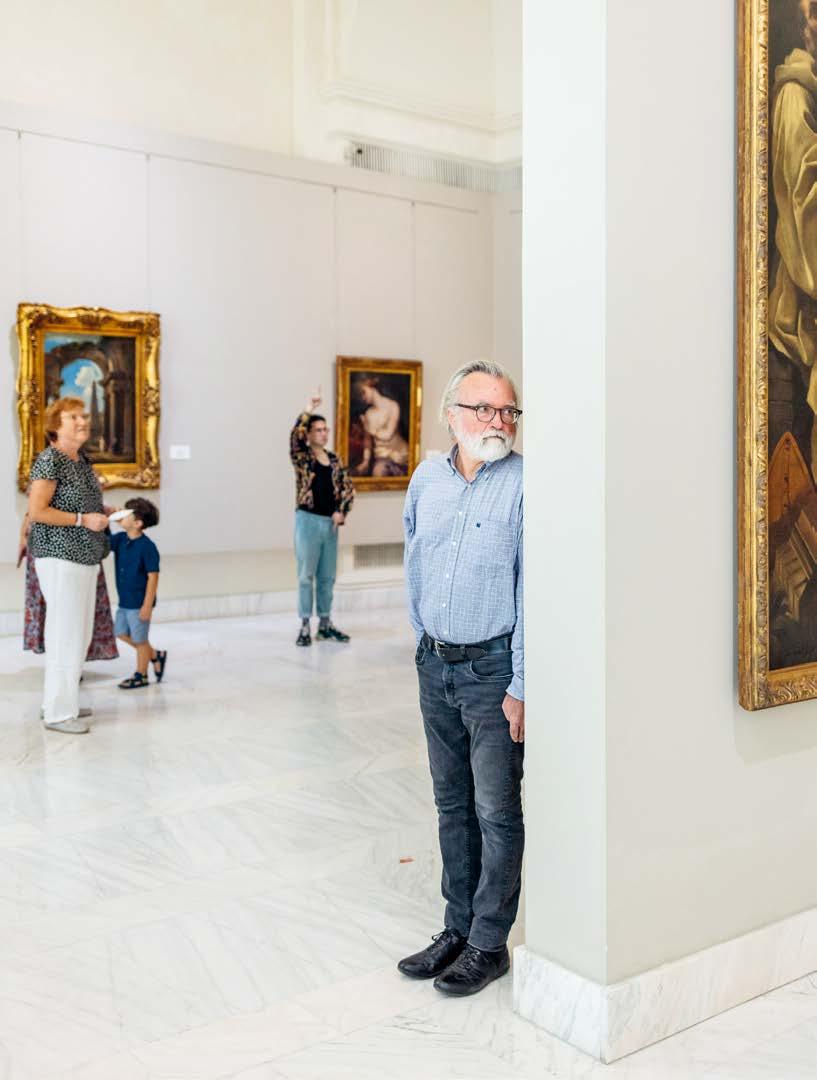
It’s
it’s
a New Dawn,
a New Day
We Need to Change Our Notion of a Design for Life

In an interview in the Talk Europe! series, Kirsten Dunst spoke to Jovana Trifunović about how Europe could develop an economy beyond the growth paradigm.
»There is an urgent need to depict diverse, multiplicitous images of a future in which living sustainably is equivalent to living well.«
See the video here:

Global economies, societies in Europe, indeed all of us are facing enormous challenges in tackling the urgently needed transition to a CO2-neutral world. Most of ERSTE Foundation’s programmes deal only indirectly with climate, the environment and sustainability issues. Our focus has (so far) been elsewhere. In 2023, we therefore turned to experts for some guidelines on how to act as an institution at a time when the climate crisis is hanging over everything else like the sword of Damocles. We invited Kirsten Dunlop, CEO of Climate-KIC, to Vienna on two occasions. Kirsten attended the Time to Decide Europe Summit 2023 in May (see p. 60) and gave a keynote speech at an internal workshop we organised for ourselves and our colleagues at Erste Group in November 2023: »Financial Health for a Changing World. Sustainable Strategic Innovation for ERSTE«.
16
Kirsten Dunlop (CEO Climate-KIC) aims to link the sense of global responsibility for our planet with the reality of our everyday lives.
Theme
Kirsten Dunlop’s message is clear: »We need to learn to consume less energy, fewer materials and fewer resources. This is not about how much further the world population can grow with renewables. It’s a shift in changing our demands and our set of expectations, and our notion of a design for life. It requires a willingness to embrace the possibility that living well has a new set of paradigms and forms.«
Her organisation, Climate-KIC, deals with the innovations that are necessary in this transformation process. »There is an urgent need to depict diverse, multiplicitous images of a future in which living sustainably is equivalent to living well. We have to counteract the current narrative which is about how living sustainably is going to mean giving up living well. Less meat or no meat. Not being able to fly and take holidays. Not being able to move about in a car. So there is something about a reframing for ourselves, culturally. Aspirational narratives are essential to inspire people to act.«
In a short interview in the Talk Europe series, she spoke to Jovana Trifunović about how Europe could develop an economy beyond the growth paradigm. Read the interview here.
Jovana
Trifunović
Kirsten Dunlop The short answer is: by a systematic investment in systemic change. Systematic in the fact that this is about policy coherence, it’s about creating an environment at all levels – subnational, regional, national and pan-European – that creates steady guidance towards the need for transformation of the economy. Not substitution of energy sources or materials, so twiddling the dials, but a full-scale structural transformation of the economy. Above all, this requires a shift in mindsets. One of the most interesting and challenging aspects but also a huge opportunity in the energy inflation situation at the moment is that it has really brought home for people the limits of resources. Abundance, the notion of infinite growth, is not something that we can continue to do. Europe has no chance of creating strategic autonomy entirely with raw materials. So, there is something positive about the sudden pressure on a sense of what poverty and limits mean, of how difficult this could get, the beginnings of understanding that energy is the first of many aspects. Water is about to follow this year. Food is following fast.
We may not be able to think about homes as places in which we heat the volume of air around us, because we simply don’t have enough raw materials to retrofit every single European home. And this kind of spike, a short-term crisis, suddenly concentrated attention and understanding that something has to shift structurally. It begins to be a litmus test for the way in which we understand that we have a collective problem, we need to find collective solutions, and that dialogue in times of crisis is the best possible way to work through that.
What is Europe’s approach? To be a role model? Is this the ambition?
The role Europe can play is one of role-modelling. I think we are all aware that there is significantly greater power than the mathematical footprint of emissions suggests. Europe leads in so many ways – on quality of life, (…) on cultural representations (…) taking care of social concerns – that are balanced, that are integrated, in which art, beauty, nature, aesthetics come together. There is something uniquely European about that kind of call for living differently. The European mission is about decarbonising 112 cities in Europe in seven years. That is a massive market-shifting signal.
What role does Climate KIC play here?
Climate-KIC (Knowledge and Innovation Community) has grown up under the umbrella of the European Institute of Innovation and Technology (EIT) to incubate and accelerate climate solutions for
Europe, all over Europe. What we’ve learned through that process is the critical importance of combining solutions, of thinking in terms of transformation of places, where people live, where they go to work, where they generate food, farming communities, landscapes, land-use in cities. Our role now is to occupy and to serve our partners, who are principally governments, in what I describe as the messy middle. The big, messy middle between the commitments that governments are making to climate, their understanding of commitments to citizens and to industry, and to a sense of global responsibility, and the reality of where we are now. And in that messy middle, Climate-KIC operates as an organisation.
For more information: www.climate-kic.org
17
How can Europe transform its economy beyond growth?
After a three-year pandemic hiatus, last year A Speech to Europe returned to Vienna for the second time. Launched by ERSTE Foundation in 2019, the event was held on 9 May. On Europe Day, renowned intellectuals are given the opportunity to provide the general public with food for thought on the future of the European project. An event venue and memorial site, Vienna’s Judenplatz reminds us that Europe can only be understood through its history. In 2023, A Speech to Europe also marked the beginning of the Wiener Festwochen programme.
A Speech to Europe 2023
Oleksandra Matviichuk: Values Must Be Defended
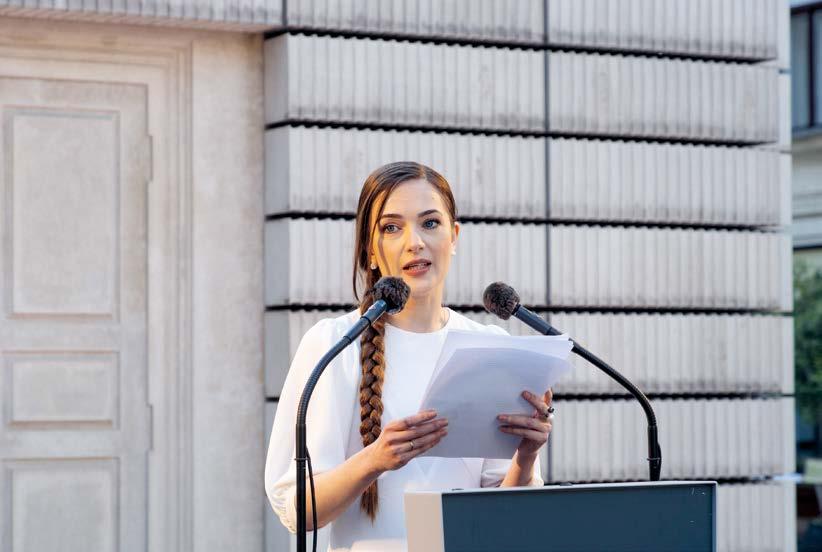 Photo – Richard Tanzer/APA
Photo – Richard Tanzer/APA
In her speech, Ukrainian human rights lawyer Oleksandra Matviichuk, whose organisation Center for Civil Liberties was awarded the Nobel Peace Prize in 2022, posed the all-important question for Europe: are we willing to accept that military power dictates the rules of the game? Or will we fight for our humanist values to protect people, the rule of law, democracy and our freedom?
Read A Speech to Europe 2023 in a slightly abridged version below.
Read the full speech here:

Watch the video of the event here:

18
Oleksandra Matviichuk during her speech in front of the memorial to the Austrian Jews murdered during the Shoah. The memorial was designed by Rachel Whiteread and is located in Vienna.
Theme
But evil cannot be vanquished once and for all. Each day we make a choice.
The Europe With a Future: Values Must be Defended
When you know history, it is impossible to idealise. The 20th century brought two devastating world wars, terrible colonial wars, millions of deaths, and the complete dehumanisation of humankind, which reached its most concrete form in the Holocaust and Nazi concentration camps. The horrific lessons of the past demanded decisive action. Responsibility for what had been perpetrated was codified in the slogan »Never again.« Governments created the United Nations system and signed international agreements. The Schuman Declaration inaugurated a unified European project. The idea that every person is free and equal in dignity and rights came to characterise the new postwar humanism. But evil cannot be vanquished once and for all. Each day we make a choice.
And democracy, the rule of law, and human rights were realised in practice in only part of Europe. Meanwhile the totalitarian Soviet Gulag was never condemned or punished. And thus evil keeps coming back: the Srebrenica massacre; the destruction of Grozny, a city of half a million people; the Russian bombardment of Aleppo; the firebombing of Mariupol and the bodies of people killed on the streets of Bucha. Now, in the 21st century, how will we defend people, their dignity, their rights, and their freedom? Can we rely on the law –or do only weapons matter?
I pose these questions not only as the citizen of a country that is defending itself against Russian military aggression. I pose these questions as a citizen of Europe. Europe must respond to the challenges of today’s world. Europe must fulfil its role in a globalised world that is seeing a standoff between authoritarianism and democracy, interests and values, might and law, quick profits and long-term perspectives. It is the determination to act that gives a society a future.
The Europe that succeeded
The European Coal and Steel Community was not only intended to provide a shared foundation for economic development. The efforts of those who worked to build a shared European project brought solidarity to countries whose relations had long been clouded by bloody conflicts. The European Union was able to overcome that history and ensure peaceful relations among member states. Governments’ ongoing efforts to uphold democracy, the rule of law, and human rights brought decades of stable growth. This is the Europe that succeeded in avoiding war. (…)
The generations that came after inherited the values of democracy from their parents. And they began to take rights and freedom as a given. People behave increasingly not as the bearers of these values, but as their consumers. They have begun to understand freedom as the choice between types of cheese at the supermarket.
19
And so they are ready to trade freedom for economic gain, for promises of security, and for personal comfort. It should come as no surprise that in developed democracies we see populist forces gaining strength, forces that cast doubt on the foundational principles of the Universal Declaration of Human Rights. (…)
The European Union does not encompass all of Europe. The EU is the part of Europe that managed to take the principle that peace, progress, and human rights are indelibly linked, and put it into practice. And then it found itself faced with the challenge of stagnation. The Europe that succeeded should support other countries’ movement towards European values. In an ever-changing world, it is open systems and transformational cultures that survive. And walls and borders will not save us from global challenges. To stop moving forward is to perish. (…)
It is one thing to be surrounded by countries that have also set the values of democracy, rule of law, and human rights as their guiding lights. It is an entirely different matter to be surrounded by countries who see these values as inimical. Once they are strong enough, they will seek to destroy you.
For a long time, the Europe that succeeded failed to take responsibility towards other countries in the region and made it possible for authoritarian regimes to become entrenched. This Europe forgot that states that kill journalists, imprison activists, and break up peaceful protests pose a danger not only to their own citizens. Such states are a threat to the entire region and indeed the entire world. Europe needed to respond to systematic violations of human rights. Human rights should play no less central a role in political decision-making than economic gain or security. (…)
One clear example is Russia, which destroyed its own civil society step by step. But for a long time, the developed democracies turned a blind eye to this. They continued to shake hands with the Russian leadership, building gas pipelines and carrying on business as usual. For decades Russian troops committed crimes in multiple countries. But there were no consequences. The world scarcely blinked at the annexation of Crimea by military force, which was unprecedented in post-war Europe. Russia believed that it could do whatever it wanted.
The Europe that failed
In February 2014 Russia began a war against Ukraine, occupying the Crimean Peninsula and part of the Donetsk and Luhansk regions. This was just after the Revolution of Dignity had ended in Ukraine. Millions of people had bravely stood up against a corrupt authoritarian regime. They took to the streets across the entire country, demanding that the regime continue moving towards Europe, towards genuine democratic values. They fought for the right to build a state in which the rights of each person are protected, in which the authorities
are held accountable, in which the courts are independent, and in which the police do not beat peaceful student demonstrators.
And some of them paid the ultimate price for this. The police shot more than one hundred peaceful demonstrators in the centre of the nation’s capital. People died under the banners of Ukraine and the European Union.
When the authoritarian regime fell, Ukraine got its chance for democratic transformation. And to stop Ukraine’s progress towards genuine democracy, Russia invaded. Russia began this war in February 2014, and then in February 2022 it expanded it into a full-scale invasion. Because it is not NATO that Putin fears, it is democracy. Dictators fear the idea of freedom.
Now Russia seeks to break Ukraine’s resistance and occupy the country by inflicting maximum pain on the civilian population. Russian forces are deliberately targeting residential buildings, churches, schools, museums, and hospitals. They are shooting at evacuation corridors. They are imprisoning people in filtration camps. They are forcibly deporting Ukrainians. They are kidnapping, torturing, and murdering people in the occupied territories. Europe failed to stop this.
This is a war of values. Russia is seeking to convince the Ukrainian nation that its choice in favour of European integration was a mistake. Russia is seeking to convince the entire world that democracy, the rule of law, and human rights are fake, that they are false values. Because in wartime they do not protect anyone. Russia is seeking to prove that a state with a powerful military and nuclear weapons can dictate the rules of the game to the entire international community and can even change internationally recognised borders.
So this is not a war between two countries, it is a war between two systems – tyranny and democracy. The war is already here. People only begin to understand this when the bombs are falling on their heads, but this war has dimensions other than the military one: it is an economic war, an information war, a war of values. Whether we are brave enough to admit it or not, this war has long since crossed the borders of the European Union.
Russia has declared war on Europe. Russia is fighting against the values that are Europe’s hallmark.
Europe must take responsibility. Democracy, the rule of law, and human rights cannot be fought for and won once and for all. We have to fight for them.
The Europe that is afraid Europe does not know how to stop the war. Some voices repeatedly call on Ukraine to accept peace.
People in Ukraine want peace more than anyone else. But peace does not come when the country that was attacked lays down its weapons. That’s not peace, that’s occupation. And occupation is just war in another form. Russia has introduced a reign of terror on
20
Theme
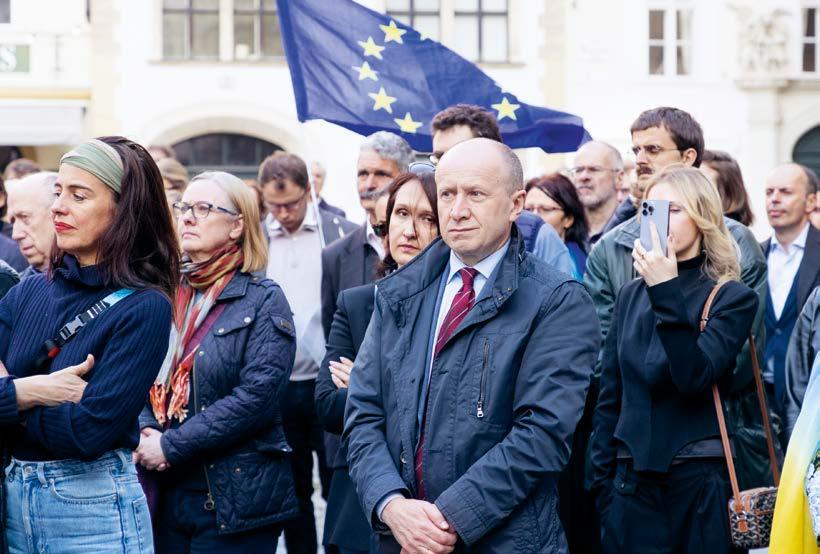
Ukraine’s ambassador to Austria, Vasyl Khymynets (centre), is among those listening to the speech.
Photo – Richard Tanzer/APA
Being aware of this responsibility brings honest people to take a stand against evil and call things by their names, even when it goes against prevailing public opinion.
the occupied territories, to keep them under control. This means that Russian troops and special forces exterminate local leaders –mayors, civil society activists, journalists, volunteers, priests, and artists. Without regard for age, sex, or health. People have no chance to defend their freedom, their property, their lives, and the lives of their loved ones.
Occupation is not a matter of exchanging the flag of one state for that of another. Occupation brings torture, deportation, forced adoption, denial of identity, filtration camps, mass graves. (…)
Sustainable peace means the freedom to live without fear, the freedom to make plans for the future. We need to stop disguising military threats as »political compromises.« Calls for Ukraine to stop defending itself just to satisfy Russia’s imperial appetites are not merely misguided. They are immoral.
People cannot be abandoned in the occupied territories to face death and torture. People’s lives cannot be a »political compromise.« Fighting for peace means not succumbing to pressure from the aggressor, it means defending people from its cruelty. Russia is a modern-day empire. The imprisoned peoples of Belarus, Chechnya, Dagestan, Tatarstan, Yakutiya, and others endure forced russification, the expropriation of natural resources, and prohibitions on their own language and culture. They are forced to give up their identity. Empire has a centre, but it has no borders. Empire always seeks to expand. If Russia is not stopped in Ukraine, it will go further. (…)
The Russian people will bear responsibility for this shameful page in their history and for seeking to resurrect their former empire by force. Being aware of this responsibility brings honest people to take a stand against evil and call things by their names, even when it goes against prevailing public opinion. In Russia today there are very, very few of these people, but it is precisely thanks to their courage that Russians will never be able to say that they simply did not know that killing people is wrong.
Since the full-scale invasion began, Ukraine has withstood thanks to the readiness of the people of Ukraine to defend freedom and democracy, but also thanks to the support of developed democracies. They said, »Let’s help Ukraine not lose«. Now they say, »We’re with you as long as it takes«. But the paradigm needs to be changed. Rather than helping Ukraine not to lose, these states need to think and act in ways that help Ukraine win. Quickly.
The Europe that is afraid is tempted to avoid tough decisions. Responsible decisions. The Europe that is afraid behaves as if global challenges will somehow just disappear one day. But in reality, they are only getting worse. We are just wasting time.
21

The Europe with a future War turns people into numbers. The scale of war crimes grows so fast that it is simply impossible to tell everyone’s stories. But I will tell you one. The story of Svitlana, who lost her entire family when a Russian missile hit her building.
»I heard them dying. My husband was breathing heavily, straining as if he was trying to throw the rubble off of himself, but he couldn’t. At some point he just went still. My grandmother and Zhenya died instantly. I heard my daughter crying. Then she also went quiet. As for my son, my mother told me that he called for me several times and then… nothing.«
As long as the military dimension of this war is confined within the borders of Ukraine, the Europe that succeeded can turn off the news of war crimes. They can avoid looking at the horrifying photos and videos. Millions of people in Ukraine cannot do this. We cannot just turn off the war. This horror is now our life.
People are not numbers. We must ensure justice for all people, regardless of who they are, regardless of their social status, regardless of the type of crime and violence they endured, regardless of whether foreign media and international organisations take an interest in their fate. We must give people back their names. And their human dignity. Because every person’s life matters. (…) It is up to us to break this cycle of impunity and change our approach to justice for war crimes. We must create an international tribunal and bring Putin, Lukashenka, and
Judenplatz, the heart of Vienna’s Jewish community during the Middle Ages, with its memorial to the Austrian Jews murdered during the Shoah, became the dramatic setting for the annual Speech to Europe.
Photo – Richard Tanzer/APA
The Europe that is afraid is tempted to avoid tough decisions. Responsible decisions. The Europe that is afraid behaves as if global challenges will somehow just disappear one day. But in reality, they are only getting worse. We are just wasting time.
22
Theme
Our future is undetermined and unguaranteed. 21st century Europe can become a world of humanism, or it can again shock the world with crimes of unprecedented brutality. Europe bears a shared responsibility to respond to global challenges and embark on a new path of mutual understanding.
other war criminals to justice. Yes, this is a bold step. But we must demonstrate that democracy is effective, that the rule of law works, and that justice prevails.
This is a job for the Europe that determines its own future. To be European means to demonstrate solidarity in this fight for the values of democracy, rule of law, and human rights. Not striking a pose, but taking an active part. (…)
The Europe that succeeded can help build a world that succeeds. Europe can play a key role in creating an international system of cooperation that brings together developed democracies and states that are on the path to democracy. This union should be determined not by a shared past, economic development, or geographical continent, but by common values and attitudes. (…)
We need a new humanistic movement that will work with society on the level of meaning, which will focus on education, which will shape mass support and inspire people to defend rights and freedoms. This movement should bring together intellectuals and civil societies from many countries, since the ideas of freedom and human rights are universal. (…)
Our future is undetermined and unguaranteed. 21st century Europe can become a world of humanism, or it can again shock the world with crimes of unprecedented brutality. Europe bears a shared responsibility to respond to global challenges and embark on a new path of mutual understanding. Europe is less about geography than about the values of modern society. We live in a world where values have no national borders. And only by spreading the idea of freedom can we make our world secure.
A Speech to Europe is a joint event organised by ERSTE Foundation, Wiener Festwochen and the Institute for Human Sciences, in cooperation with the Jewish Museum Vienna.
23
To mark World Bee Day, ERSTE Foundation invited its stakeholders to its first-ever community encounter on Erste Campus.
A World Without Bees Is Uninhabitable: 2023 Bee Day

A world without bees is uninhabitable. As an institution whose symbol is a bee, we are painfully aware of this. To ERSTE Foundation, the bee’s message, however, carries yet another special meaning: the insect lends purpose and form to our actions as a philanthropic organisation. It makes sure we never forget that everything we do has an impact and is connected. It reminds us of the importance of finding the right balance in life. Genuinely successful enterprises need a soul. And for us, the organisations, partners and all the people with whom we cooperate now and in the future are soulmates.
The United Nations has proclaimed 20 May as World Bee Day. To mark this occasion, we organised the first ERSTE Foundation Community Encounter on 17 May 2023, an event that is to be held each year around World Bee Day on Erste Campus: 2023 Bee Day.
Even before our 250 or so guests entered the Grand Hall on Erste Campus, all their senses were stimulated as they walked through a forest tunnel made of earth and fir needles and scented with pine into an open-plan room equipped with several cooking stations and a stage. As a start, guests were invited to taste honey and propolis served with fresh bread and different types of butter.
24
Conversation Inspiration Metabolic Kitchen
Theme
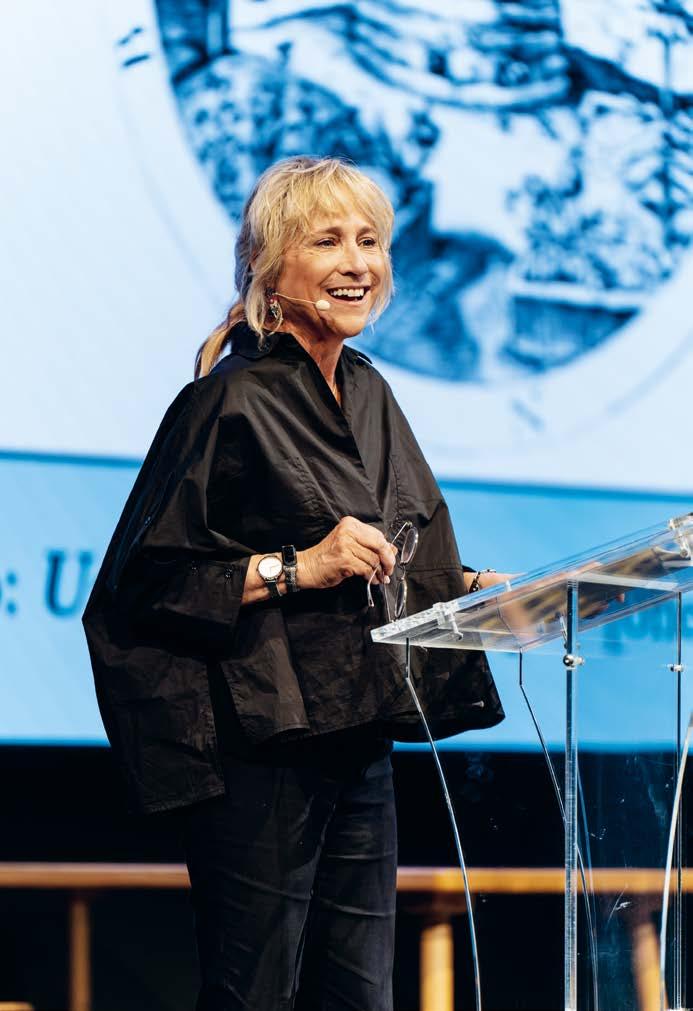
The bee and the Metabolic Kitchen
The world around us is changing at a breath-taking pace. The things we eat, taste, smell and feel make these transformations immediately tangible to us. On 2023 Bee Day, we talked about the way people think and act, about how to enable the green transition and about new perspectives for the way society as we know it is developing. The event encouraged attendees to jointly contemplate visions of the future, to cook and to reflect. Bee Day Instructors Boris Marte, CEO of ERSTE Foundation, and Marianne Schlögl, Strategic Partnerships Manager at ERSTE Foundation, guided participants through the Bee Day.
As the bee is the historical »heraldic animal« of the savings banks and has also been the logo of ERSTE Foundation since 2005, the day began with deciphering the metaphorical meaning of this small animal, whose existence is so crucial to our environment. Claire Preston, professor of Renaissance literature at London’s Queen Mary University and author of the book Bee, delivered the first keynote speech. She clarified what bees can tell us about the state of the world. And, most importantly: a single bee is no bee. Bees can only exist en masse.
Subsequently, food trend expert Hanni Rützler wondered what the future would taste like. Food is a complex and diverse cultural practice. It helps shape a sense of community, and mirrors values, lifestyles and traditions in the way it is grown, produced and prepared. How is the way we see the world influenced by the way we eat? Hanni Rützler provided a glimpse of how our habits must shift and our diet change if we want to secure our future. As a foretaste of a possible future, she brought along edible insects to sample.

25
Claire Preston is a professor of Renaissance literature in London and a bee expert.
Photo – eSel.at / Robert Puteanu
One of the culinary surprises was a bee-pollen tasting.
Photo – eSel.at / Robert Puteanu


26
Above and right: Jars of different types of honey, and a diverse ERSTE Foundation community cooking and eating together at the first Bee Day in 2023.
Photos – eSel.at/ Robert Puteanu und eSel.at/Joanna Pianka
Food trend expert Hanni Rützler talked about what the future would taste like.
Theme
Photo – eSel.at / Robert Puteanu

After lunch at the Metabolic Kitchen, which the participants helped prepare, the day continued with several rounds of discussions.
»What Is Social Impact? And How Can We Change Social Norms?« This topic was discussed by Uli Grabenwarter, director Equity Investments at the European Investment Fund (EIF), behavioural economist Gerhard Fehr and transformation psychologist Irina Nalis. The aim of achieving a social impact is at the heart of organisations such as the EIF. One of its approaches is to provide funding for potentially innovative initiatives. But what does »social impact« really mean? What role does our human behaviour play in this? What role is played by the social norms that determine the behaviour of individuals, societies or even states? And finally, how can these norms be influenced to contribute to social justice in this world? We need to ask and answer these questions if we want to achieve sustainable change.
Migration expert and political activist Gerald Knaus and journalist and TV producer Ivana Dragičević, both Europe’s Futures fellows of different generations, engaged in a lively debate about the »Rule of Law & Next Gen: Who Will Decide About the Future of Our Democracies?«. A new generation is growing up in Europe that has its own ideas about participation, trust and convictions. How will these developments shape the future of Europe and our democracies? Gerald Knaus gave his daughter Francesca Knaus a chance to speak, and Ivana Dragičević presented a TV project she realised for the European Parliament not about but with young people all across Europe.
»What
Is Social Impact? And How Can We Change Social Norms?«


27
Gerhard Fehr, Irina Nalis and Uli Grabenwarter talked about social impact.
Photo – eSel.at / Joanna Pianka


Olivia Lazard, specialist on the geopolitics of climate and the risks of conflict and fragility associated with climate change, activist and climate action adviser Johannes Naimer-Stach and Boris Marte discussed the biggest issue of our time: »From Sacrifice to Metamorphosis: What Does the Green Transformation Entail?« They talked about the race against time as companies, despite struggling to be part of the solution rather than being part of the problem, are not gaining ground fast enough. The final question was how well equipped Europe is to secure important resources for the green transition in the midst of major geopolitical forces.
An unusual, exciting day concluded with a dinner party prepared by the participants themselves. They fetched the tables, benches, place settings and food, thus completely remodelling an existing structure, with everyone lending a hand and accompanied by the music of Rupert Huber.
In the end, participants and guests alike agreed that this could only be the beginning. We’ll do it again. 2024 Bee Day will take place on 24 May 2024.
Maribel Königer
Bee Day 2023 was certainly not a boring community meeting.
Photo – eSel.at / Robert Puteanu
28
Bee Day Instructors (from right) Boris Marte, CEO of ERSTE Foundation, and Marianne Schlögl, Strategic Partnerships Manager at ERSTE Foundation, guided participants through the Bee Day.
Theme
Photo – eSel.at / Joanna Pianka
Boris Marte, Johannes Naimer-Stach and Olivia Lazard discussed the biggest issue of our time, climate change, voicing concern that businesses are not adapting quickly enough.
Photo – eSel.at / Joanna Pianka
Ivana Dragičević and Gerald Knaus talked about the generation with the most future ahead of them: the Next Gen.
– eSel.at / Joanna


The final question was how well equipped Europe is to secure important resources for the green transition in the midst of major geopolitical forces.
A new generation is growing up in Europe that has its own ideas about participation, trust and convictions. How will these developments shape the future of Europe and our democracies?
A long community day concluded with food, drinks and lively discussions.
– eSel.at / Joanna Pianka
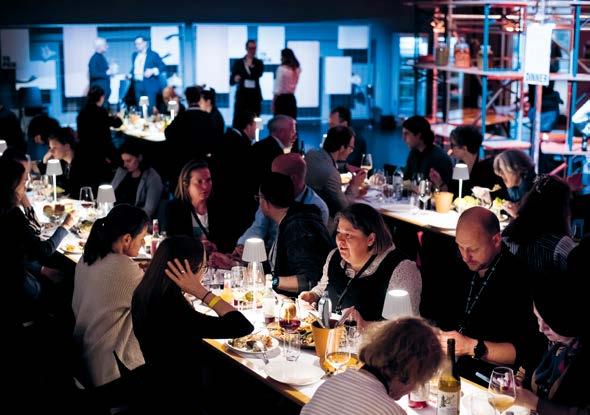
29
Photo
Photo
Pianka

Financial Health for All
Interview Social enterprises and NGOs often have excellent ideas for how to solve social problems. Those ideas can be realised more easily with the right training and the right financing. Erste Social Finance Holding (ESFH) supports such organisations as they turn great passion into even greater impact. Societies in CEE need that now more than ever.
It’s All About Scaling Up Now
Martina Bachler spoke with Florian Bauer, Director of Social Finance, Sustainability and Innovation at ERSTE Foundation since February 2023, and Ana Maria Cretu, Social Impact Investment Lead at ERSTE Foundation since November 2023.
Before joining ERSTE Foundation, Florian Bauer worked in the NGO & Social Entrepreneurship sector for over 13 years. Ana Maria Cretu has been responsible for the design, development and implementation of ERSTE Foundation’s Social Impact Investment Strategy since November 2023.
Photos – ERSTE Foundation
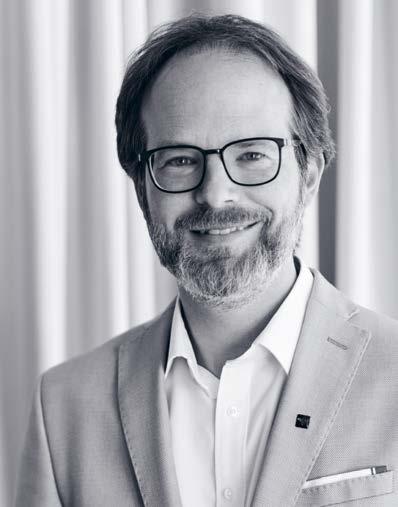

32
Financial Health
Martina Bachler What do you expect the future to look like?
Ana Maria Cretu We mustn’t fool ourselves; people who are already struggling to get by now will find it even more difficult in the years to come. Our region and the whole world will face major challenges in the next few years. They relate to climate change, technological development, profound changes in society and a loss of trust in institutions.
Florian Bauer We can already see that in some CEE countries, the state is no longer able or willing to take on certain tasks, particularly in the social sphere. These are political decisions that have an impact on people’s lives. The impact can be even worse when governments have to make cuts. It is not getting any easier to live a good life for poorer members of the population.
NGOs and social enterprises usually lack financial resources and entrepreneurial thinking, while companies often lack a clear, ethical mission or purpose.
Can civil society pick up the slack in such situations, and should it?
Ana Maria Cretu I worked in social banking at BCR [a Romanian financial group and a member of Erste Group] for seven years, and many of our projects in Romania showed that it can be done and all the possibilities it offers. Social banking units have had the same experience in other countries where Erste Group operates. What we need now is to bring all these experiences together, learn from each other and scale it all up to increase the positive effects for these societies.
But how are social banking and social finance, of all things, supposed to solve social problems? Isn’t that mainly what NGOs and charitable foundations do?
Florian Bauer All those approaches exist, and they are all needed. I have worked in NGOs, with social entrepreneurs and in a conventional company. Each form has its strengths, but each one is always missing something. NGOs and social enterprises usually lack financial resources and entrepreneurial thinking, while companies often lack a clear, ethical mission or purpose.
Ana Maria Cretu Civil society can achieve good outcomes, especially when it comes to social services. We have seen this in social housing, for example. Strict financial returns are not very big there, but social banking also has room for social returns,
meaning the impact that a project has. We are looking for a double bottom line.
Why do returns still matter?
Ana Maria Cretu Because to be truly sustainable, projects need to deliver a return on investment – for everyone involved. A business mindset can lead to better solutions, even within NGOs.
Florian Bauer That is why we at ESFH focus on getting organisations, companies and projects to the point where they are capable of being financed in the first place. We are currently setting up a capacity building programme for social entrepreneurs. The pilot will run in three countries in 2024 and then probably in seven countries starting from 2025.
So you’re saying that to advance important social projects in the region, we need more than just the financial resources that are available through ESFH shareholders, ERSTE Foundation and Erste Group. But wouldn’t other institutions be better at offering training, further education and advice to social organisations and companies?
Ana Maria Cretu The social banking units at the country level have good experience in their local markets so they know exactly what kind of support is needed. That enables us to work in a very targeted manner. The structure of the training programme, for example, is well coordinated.
Florian Bauer And the great advantage of ESFH is that it has the financial resources and financial products. Plus the staying power of the foundation and the full conviction that investing in financial education always pays off, even when it takes time. The aim is to transform the financial infrastructure in the region, after all.
What is wrong with the financial infrastructure in CEE?
Florian Bauer If we want to combat climate change and enable a stable society, we need to find new ways to finance those things.
Ana Maria Cretu It can be done when the impact plays a greater role and it’s not just financial returns that count. At ESFH, we are innovators in financial education and social finance, and our strength is the superstructure where we can pool the experiences of the individual countries.
That sounds good in theory. But what does it mean in practice?
Ana Maria Cretu In Romania, initially, we found it difficult to stay in touch with people who were experiencing financial problems. And who needed help to get those problems under control. But social banking in Slovakia
33
Erste
This social enterprise is a joint venture between ERSTE Foundation and Erste Group. It offers innovative social finance instruments to enable social business models and makes its own investments aimed at spreading prosperity in Central and Eastern Europe.
Since 2016
600 million euros in loans granted
47,000 customers provided with social banking services
Our Approach to Social Banking
We foster starting entrepreneurs
with working-capital loans start-up loans
~100,000 jobs created and secured

2/3 of its customers have improved their financial situation
to create new jobs
We support micro businesses to create and preserve jobs in rural areas
We empower social organisations to expand their social impact
and provide business training mentoring with working-capital loans investment loans and provide cash flow assessment financial advisory with quasi-equity financing funding via SIBs* bridge and investment loans
and facilitate capacity building networking with special accounts housing micro loans and provide debt advisory financial education
We stand by people in financial difficulties to improve their financial health and housing
34
Social Finance Holding
* Social Impact Bonds No poverty Good health and well-being Quality education Gender equality Decent work and economic growth Sustainable cities and communities Reduced inequalities Climate action Partnerships for the goals 1 5 10 13 17 11 3 8 4
support United Nations Sustainable Development Goals:
We
already had a history and strong expertise in this area when we started. We´ve learned a lot from them. It has helped us to improve in what we are doing. They have concepts that Erste Group, but also social enterprises, can roll out in several countries.
Florian Bauer It would be even better for society if ESFH wasn’t the only one making such projects and social enterprises large and successful. We need other investors to recognise that this sort of thing has a future and generates returns.
Why aren’t they on board yet?
Florian Bauer Because the risk of losing money is too great for many of them, and in some cases, they don’t have the right financial products.
Ana Maria Cretu Banks and investors are still very profit-orientated and often want to see quick results. However, this requirement is more common among start-ups than in the realm of social innovation. Investors in social innovation are interested in people who have ideas and can secure entire regions in the long term even if those people can’t achieve everything right away.
Is the situation really that bad?
Ana Maria Cretu You just need to have a realistic view of things. The youth in Romania’s rural regions believe they have no future. We shouldn’t underestimate the rolemodel effect that social enterprises can have there by creating not just jobs but hope.
Florian Bauer People in general often underestimate how profitable seemingly small approaches can be. One company that we supported with quasi-equity employs people in Austria who are affected by burnout or mental illness. They are not quite able to work a regular job, but they can do light work that would otherwise be outsourced to low-wage countries. The company has had to expand its production facility in Lower Austria because there is high demand from other companies in the region and many applicants. It’s not a cloistered facility; they do real, meaningful work and receive support from psychologists and social workers in the process. Everyone in the region benefits from it. And it’s making a difference. Half of the people who work at this social enterprise end up finding their way back into the primary labour market.
Would that enterprise be too risky for a traditional bank to finance?
Florian Bauer Usually, yes. However, we have a way of combining various financial instruments with innovative approaches that enables us to do it. The focus is always on achieving a positive social impact.
In our region, 14.5 million people are at risk of falling below the poverty line and becoming socially excluded. If we help ensure that the right solutions can be implemented, we contribute to the resilience of these societies.
One problem that many social enterprises and NGOs have is that they have incredibly good ideas and a lot of passion, but they don’t know how to move forward. But they must move forward if they want to attract investors.
ESFH wants to invest in high-impact companies in the future. When will it start?
Ana Maria Cretu For now, we are investing in the ecosystem by increasing financial and economic knowledge, offering capacity building programmes and quasi-equity as a financial product. We will not make actual investments in social enterprises until the next phase.
How much potential is there for such programmes and investments?
Ana Maria Cretu The potential is huge because there are so many challenges to overcome. In our region, 14.5 million people are at risk of falling below the poverty line and becoming socially excluded. If we help ensure that the right solutions can be implemented, we contribute to the resilience of these societies.
The turnaround in interest rates has caused venture capital to shrink considerably for start-ups in Europe. Is the same true for high-impact companies?
Florian Bauer It has never been easy for them to obtain capital, but it has certainly become more difficult recently. This is another area where ESFH can stand out given the staying power of ERSTE Foundation. This gives us the opportunity to continue supporting social entrepreneurs with loans. And we can be more patient than traditional banks when it comes to projects financed with microloans, for example.
Ana Maria Cretu For individuals living in poverty who rely on microloans, even slight increases in interest rates can have a disproportionate impact compared to other social classes. As a lender, adopting a compassionate approach by not penalising them for missing a payment can make a significant difference. It’s essential to remain empathetic, and we fully endorse such practices.
How has ESFH developed in 2023?
Florian Bauer To have a real impact, you need to position yourself well. We have worked a lot on how we position ourselves. It is incredibly inspiring to see what is already happening in the social banking units of Erste Group’s subsidiary banks. They are really making a difference. We can amplify their impact by scaling it up.
Ana Maria Cretu It’s not so much about the quantity but the quality of the projects and ensuring they work sustainably. There are so many possibilities. In one project in Romania, a company developed a software solution that connected Ukrainian refugees with Romanian companies. The software proved to be so effective that some of the companies ended up using it for all their recruitment needs, extending beyond hiring refugees from Ukraine.
So the desire to make a social impact can lead to good business solutions?
Ana Maria Cretu When people have the right mindset and the right support, definitely.
35
The social impact bond (SIB) initiative aimed to tackle longstanding social issues through innovative digital solutions, and it has achieved that.
Social Impact Bond Helps Finding Meaningful Jobs

The COVID-19 crisis intensified Austria’s care-giver shortage. At the same time, the employment rates among women in Austria are below the EU average. This underscored the need to support women in accessing the labour market, especially those with a weak educational background following maternity leave or a break to care for a family member. The task was to use digital technology to develop an innovative approach that would address this systemic social challenge.
In late 2023, Erste Social Finance Holding, in partnership with the Austrian Federal Ministry of Social Affairs, Health, Care and Consumer Protection, successfully completed the social impact bond initiative aimed at tackling long-standing social issues through innovative digital solutions.
Erste Social Finance Holding collaborated with atempo, an established nonprofit organisation to leverage its expertise in care assistance and its social matchmaking platform ava. The platform provides matchmaking services for people with disabilities who are looking for care personnel. It also offers online care assistance training, practical know-how and mentoring for people looking for a care assistance job.
The initiative’s success is evident in its achievement of key milestones, including beating hourly targets and confirming completed assistance hours. Not only did 52 unemployed women work for almost 30,000 paid hours during the life cycle of this impact bond initiative, a substantial number of unemployed women also trained and prepared for care assistant jobs. Moreover, the project has attracted funding from public authorities to scale up its activities in other parts of Austria, which is always the ultimate goal of any SIB initiative.
36
Care assistant Melanie Wango and her client Meli have both benefited from the social impact bond’s job initiative.
Photo – Erste Social Finance Holding
Financial Health
Transfer pre-financing plus success fee
Intermediary Erste Social Finance Holding
Service provider atempo
What is a social impact bond?
Although the name implies otherwise, this is not a bond. It is a financing tool that aims to attract private investments to support social innovation. Private investors provide funding to a service provider for a project that addresses a particular social problem. The predefined social outcome is externally evaluated, and, if it is achieved, an outcome payer (often a public body) repays the investor along with a success premium. A selected intermediary manages the process.
For this project, Erste Social Finance Holding is the intermediary that set up and managed the project on behalf of the Austrian Ministry of Social Affairs. ERSTE Foundation is the social investor that pre-financed the initiative and will get the money it invested back from the ministry, including a success premium, as the project reached its agreed impact goals.
Commissioner Ministry of Social Affairs
Erste Social Finance
Erste Social Finance acts as a social finance investor and intermediary in the region of Central and Eastern Europe. It was established as a joint venture between ERSTE Foundation and Erste Group Bank AG. As a social enterprise, it does not distribute dividends but reinvests all profits in new social projects. Its main activities include investing in financially sustainable social business models and developing and launching innovative social finance instruments.
People in need
Evaluator
37
Investor ERSTE Foundation Pre-financing 2 1 7 6 3 Set up and deal management Deliver services Achieve impact 4 Evaluates impact 5
Repay pre-financing plus success fee only if impact goals are achieved
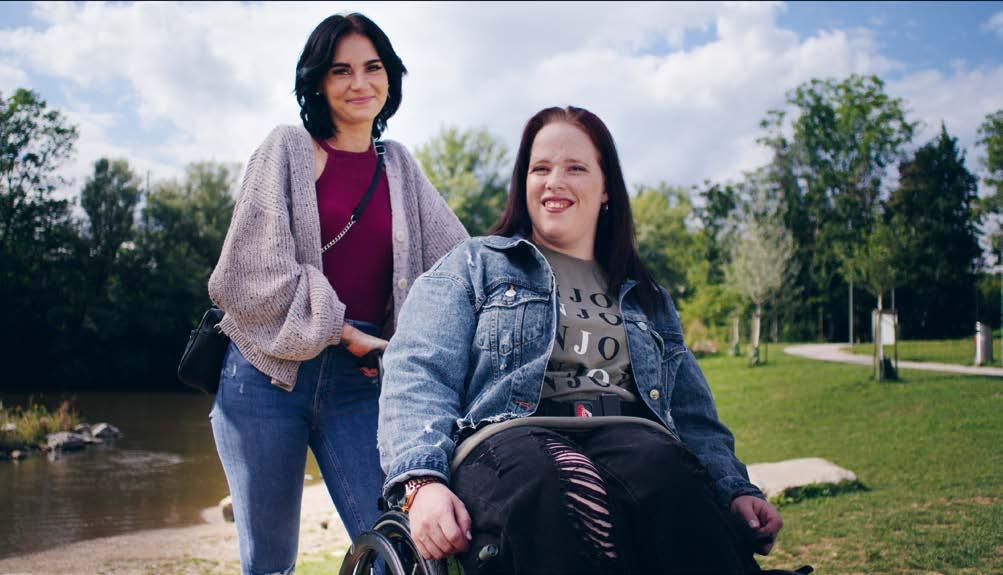

Peter Šurek, CEO of Erste Social Finance Holding, is convinced that »social impact bonds can shift the typical focus of financing for social interventions from defining deliverables to the social impact they make. I’m excited to see that the social innovation that our SIB pre-financed has achieved the defined impact targets and gotten additional financing to expand into other states in Austria. I’m happy for every woman who received training and a fulfilling job and every individual with disabilities who got the assistance they need in their daily life.«

An SIB is unthinkable without an organisation – a social service provider that has a solution for the specific social problem. atempo’s CEO Walburga Froehlich is pleased that her organisation was able to convince the Ministry of Social Affairs more than three years ago to commission an initiative with atempo and ERSTE Foundation to invest in it. »We are even more pleased to have successfully completed the first SIB in Austria. We highly recommend using an SIB for testing and implementing social innovations.«
What about the women who participated in the initiative? How do they see it?
»I lost my job as a hairdresser due to the lockdown. Then I was given an opportunity to train to become an assistant to people with disabilities. I’m a mum of two little girls. The training was perfect for me because it was online, and I was able to choose when and where I wanted to study. I assist my client Meli in her day-to-day life. I help her around the house and with visits to government offices. And we go for walks together.«
Melanie Wango, an assistant
»For me, having assistance means gaining control, because it simplifies my life in so many ways. Doing all the things I do now. That wouldn’t be possible without assistance.«
Meli, her client
Melanie Wango and her client Meli can be seen in this video (in German):

38
Financial Health

Empower Those Who Care
Time flies! We marked ten years of the NGO Academy in September 2023! Since day one, the NGO Academy has offered opportunities for dialogue and learning for civil society organisations in Central and Eastern Europe (CEE).
Ten Years NGO Academy: A Decade of Impulses for Civil Society
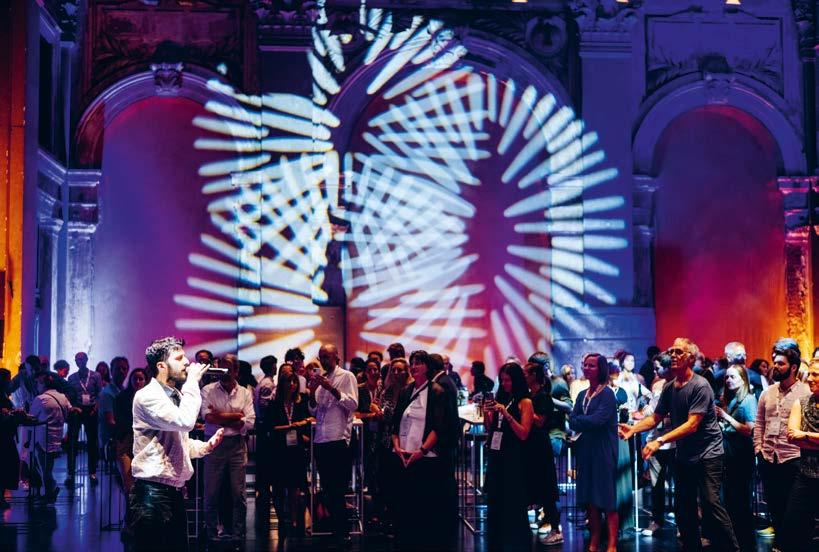
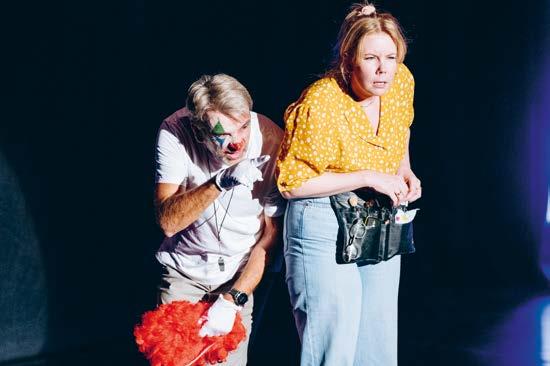
This anniversary was an occasion to celebrate. The evening’s musical highlight was a performance by Viennese hip-hop duo EsRAP.
Many other contributors had the mic before them.
Photo – Igor Ripak

Above: Uli Grabenwarter from the European Investment Bank was one of the TEDx Donauinsel speakers.
Photo – TEDx Donauinsel
Left: ERSTE Foundation
CEO Boris Marte was barely recognisable when he first took the stage.
Photo – Igor Ripak
42
Empowerment
The joint initiative of ERSTE Foundation and the Vienna University of Economics and Business (WU Vienna) was established in 2013. Its mission is to strengthen civil society in CEE by providing management development and training opportunities. The NGO Academy offers a range of highquality capacity-building programmes, tailored specifically to NGOs and social enterprises. By sharing knowledge, imparting skills and helping participants to build up networks, the NGO Academy supports the organisations themselves and indirectly, their beneficiaries. Programmes target leadership, executives and managers from a pool of outstanding civil society organisations within 14 countries in Central and Eastern Europe.
The NGO Academy’s tenth anniversary was a great opportunity to thank again all those who supported this important initiative to achieve its goal. Without the commitment and perseverance of our partners Porticus and WU Vienna, the faculty members, the dedication of an amazing team, many helpful facilitators behind the scenes and – of course – the organisations and their participants, all of it would not have happened.
In a big celebration in Vienna, we honoured the many devoted people who have used the knowledge, skills and connections they gained at the NGO Academy to make a real difference, addressing inequality, poverty, and environmental and social issues. It was a joyful thank-you to everybody for being part of this story. We are looking ahead of another ten years, determined to empower excellent civil society organisations, cultivating a culture of empathy, compassion and innovation.

Franz Karl Prüller (ERSTE Foundation) and Reinhard Millner (Vienna University of Economics and Business), right, were among the founders of the NGO Academy, as were Nicole Traxler (ERSTE Foundation) and Peter Vandor (Vienna University of Economics and Business), below.
Photos – Igor Ripak
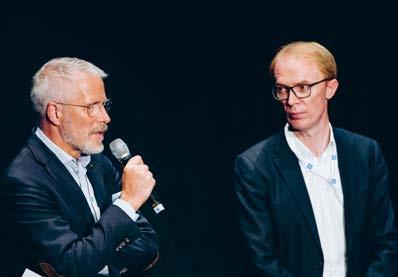

»The NGO Academy began as a start-up – a small team with a profound belief in the idea, with total commitment and high ambitions. We have diligently built open structures and collaborative processes through which to offer our programmes. Today, the NGO Academy exists through the interactions of many people and organisations and has established itself as an important educational institution.«
Nicole Traxler, ERSTE Foundation
43
4 programmes
The NGO Academy is a place where experts can interact.
For the last ten years, the NGO Academy has developed many different programmes that help civil society actors, based on their specific desires and requirements. The NGO Academy provides short online webinars, multi-week offline programmes and all kinds of options in between. The Regional Programme offers tailored workshops and addresses the local context in local languages. In total, 290 of these short interventive workshops were conducted as well as ten editions of the Social Innovation and Management Programme, which – unlike the Regional Programme – consists of three modules during a five-month period.
Ten highlights from our journey of supporting civil society leaders in CEE
6,063 participants
The NGO Academy is diverse. As of August 2023, the NGO Academy has welcomed a total of 6,063 participants to their programmes. 4,910 participants took part in the Regional Programme and 240 participants completed the Social Innovation and Management Programme. In addition, 76 participants took part in a Community-Led Event and more than 800 people attended our NGO Academy keynotes. The member network consists of 595 outstanding civil society organisations in 14 countries, covering a variety of different fields of activity.
84.6% improved their organisational capacity
The NGO Academy offers knowledge that can be applied. Overall, more than four out of five members agree that their NGO Academy membership supports the development of their respective organisations.
258 faculty members
The NGO Academy is about sharing.
Over the past decade, the NGO Academy’s faculty of over 250 experts has played a vital role in the Academy’s success. Their commitment to sharing their knowledge, expertise and experience has been instrumental in shaping the growth and development of our participants.
9 out of 10 benefit from new knowledge
The NGO Academy creates knowledge and skills.
In general, 90.0% of all participants agree that attending NGO Academy programmes increased their overall knowledge about nonprofit management. And the knowledge participants acquire is not just academic but practical, too. 85.1% of respondents say that they sometimes refer to materials or concepts they learned about at the NGO Academy.
3.92 new connections for each member
The NGO Academy fosters connection.
At the NGO Academy, our mission is not only to provide options that help to build capacity, in the form of programmes, workshops and webinars. On average, each NGO Academy member is regularly in contact with almost four other members. 52.1% of these contacts cross national borders, and 45% cross fields of activity.
44
Empowerment
77.3% of member organisations feel empowered
The NGO Academy creates realworld impact.
Supporting member organisations is our mission. We are proud that our 595 current members do extraordinary work: amongst much else, they run schools in war-torn regions, drive ecological innovation, and work with society’s most mar ginalised groups. Through our work, we aim to increase the effectiveness of these organisations.
69.7% agree that the NGO Academy strengthens civil society
The NGO Academy is one part of the puzzle.
Considerable effort is needed to create a strong civil society sector, including external support and robust funding possibilities, as well as leadership skills and management know-how. Focusing on these latter, the NGO Academy aims to equip civil society actors with the competencies and tools necessary to bring the sector forward.
9 out of 10 express a high degree of appreciation
The NGO Academy is appreciation and trust.
An overwhelming majority of participants say that they are happy with our programmes. In fact, 93.4% of participants say that they are highly satisfied with the NGO Academy, and 86.7% would strongly recommend the NGO Academy to their colleagues.
83.3% would have trouble finding similar programmes
The NGO Academy meets a need, and that need remains.
At the NGO Academy, we aim to support positive developments by providing organisational capacity building within Central and Eastern Europe, and by keeping barriers to participation as few as possible. In fact, 79.9% of our survey respondents would find it financially difficult to take part in other capacity-building options. Similarly, 83.3% would have trouble finding comparable provision of a similar quality in their region. Overall, a vast majority of 81.3% of members would be disappointed if the NGO Academy did not exist.
The highlights are taken from the NGO Academy’s Impact Brochure. Download all statistics and the brochure here:

45

The carefully prepared TEDx Donauinsel Impact Salon talks were a key moment for several recent NGO Academy graduates.

46
Ștefania Neagoe from Bucharest’s Ateliere Fără Frontiere won over the audience at the TEDx Donauinsel Impact Salon with her talk »Poverty Is Not Inevitable!«
Photo – TEDx Donauinsel
Ivana Separović and Henrieta Belegišanin from the Blue World Institute in Veli Lošinj spoke about endangered dolphins in the Adriatic Sea.
Empowerment
Photo – TEDx Donauinsel
Mirela Nemtanu from the Romanian hospice Casa Sperantei, which runs centres in Bucharest, Brașov and other cities, compassionately recounted what she had learnt from dying people about the things in life that really matter.
Photo – TEDx Donauinsel


Dijana Pejić puts her heart and soul into leading the Genesis Project, which aims to protect children from marginalised families in Banja Luka, Bosnia-Herzegovina.
Photo – TEDx Donauinsel
47

How is Digital Respite and Care Counselling Working?
Olena Auner opens her laptop. She is a qualified nurse and has been working with people in need of care and their families for around 20 years. Today she is working from home. Using the app »Alles Clara«, she’s advising family carers in an asynchronous chat or by phone. (An asynchronous chat allows participants to send and receive messages at different times. They don’t need to wait for an answer before asking another question or giving an explanation). She plays the role of a knowledge mediator, shares her experience, recommends steps to take and provides virtual guidance for people who are caring for loved ones in challenging situations. And all virtually from home. This is new for Olena Auner and it’s unusual in the care sector too. That’s why »Alles Clara« focused on two questions in particular in 2023: »How does care counselling work in the digital space? And what impact does ›Alles Clara‹ have on family carers and counsellors in the app?«
What works for whom, under what circumstances and how?
This question was addressed by Hanna Mayer, Professor and Head of the Division of Nursing Science specialising in Person-centred Care Research at Karl Landsteiner University of Health Sciences, and her research team. Their assessment of »Alles Clara« followed an approach known as realist evaluation. It involves harmonising methods for collecting and analysing data with a sound theoretical understanding of the assumed mode of action. Mayer and her team developed the initial impact model based on data in the first phase of the evaluation and published it in an internationally recognised journal. They subsequently tested their impact hypotheses using quantitative and qualitative surveys. Then they combined the findings to refine and develop the impact model.
48 The effectiveness of »Alles Clara« was evaluated in 2023.
Olena Auner is a healthcare and nursing professional who works as a counsellor for »Alles Clara«. She helps people seeking advice on the app, and she assisted Hanna Mayer’s research team with their evaluation of »Alles Clara«.
Empowerment
Person-centred counselling has a big impact
Every counselling session in »Alles Clara« is unique and specifically tailored to the situation and needs of the person seeking advice. »There are no standard answers. It’s all personalised,« says Olena Auner.
As a result, »Alles Clara« has an impact at multiple levels. In general, however, the researchers saw three main mechanisms by which »Alles Clara« helped family carers:
1. Being invisible: The counselling takes place in a private one-on-one chat, and the counsellors are required to maintain confidentiality. Only those seeking advice and their counsellors have access.
2. Being recognised: Despite being invisible, relatives feel recognised and validated by the counsellors. They are no longer on their own with their questions and fears.
3. Person-centred counselling and supp ort: The counselling is personal, builds trust and responds individually to the wishes and needs of the person seeking advice.
For counsellors like Olena Auner, working in »Alles Clara« helps develop a sense of pride in their work and profession. As with the family carers, this effect can be seen through:
1. Being invisible: Not being seen while in the digital space brings many advantages for counsellors too, such as a better work-life balance, less physical strain, etc.
2. Recognition and emp owerment: Counsellors in »Alles Clara« are perceived as experts in their field and can enhance their skills (such as digital skills).
3. Person-centred counselling: Counsellors feel that their work for »Alles Clara« is meaningful and that it’s achieving something worthwhile.
4. Being able to show what care giving is and what it can do: The counsellors demonstrate their expertise. As a source of knowledge and expertise, the app enables recognition for their role. This also refreshes society’s image of nurses and carers.
What next?
Olena Auner will be busy again in 2024. She will not only be advising family carers on »Alles Clara« but will also continue to be involved in the research conducted by Hanna Mayer and her team in order to generate findings on digital care counselling and its impact. This is relevant not only for »Alles Clara«, says Hanna Mayer, but also for the field in general, because »›Alles Clara‹ shows a way to introduce the concept of person-centredness in the digital space,« she explains. »We will be building on this in the new year. We are already very excited about the new findings.«
Jana Lutz

Hanna Mayer and her team investigated the theoretical effectiveness of »Alles Clara« , the secure messenger tool for online counselling. Based on qualitative interviews with people seeking advice and counsellors from »Alles Clara«, as well as quantitative surveys, the research team was able to develop a model. This model depicts the impact of »Alles Clara« on the different target groups.

Pilot phase until 31 Dec 2023
24

2,443
718
13
counsellors
21 healthcare and nursing staff
2 clinical and health psychologists
1 therapist app downloads advice seekers care organisations: Arbeiter-Samariter-Bund
Caritas Austria

Caritas der Erzdiözese Wien Caritas Diözese St. Pölten
Diakonie Österreich
Diakonie de la Tour Evangelisches Diakoniewerk Gallneukirchen
Hilfswerk Austria
Hilfswerk Styria Hilfswerk Carinthia
Austrian Red Cross
Volkshilfe Austria Volkshilfe GSD Upper Austria


Hospiz Umbrella Organisation: 30 Years in the Service of Humanity
»No one can confidently say that they will still be alive tomorrow.«
Euripides
»Lovingly letting someone go is probably the greatest and most difficult gift to give to a loved one. It can be just as painful to lovingly leave someone behind.«
Claudia Bausewein, president of the German Association for Palliative Medicine (DGP)
50
Its long-standing supporters, ERSTE Foundation and Sparkassen Group, celebrated the Austrian organisation with an exhibition in 2023.
Empowerment
»This support is a primary concern to the entire savings banks group. No one likes to talk about this topic and we all too easily ignore the fact that as people live longer, the need for care –and, in the final stage, also for hospice and palliative care – is increasing.«
Franz
Portisch, Secretary General of the Austrian Savings Banks Association
»It is as natural to die as to be born; and to a little infant, perhaps, the one is as painful as the other.«
Francis Bacon
From 19 September to 14 October 2023, quotes from famous and not-so-famous people displayed in the ERSTE Foundation window gallery prompted passers-by on Vienna’s Erste Campus to reflect on something that affects us all, but that we don’t like to think about: dying and our own death.
Eighty to ninety per cent of people in Austria die at home, in hospitals or nursing and care homes, cared for by doctors, therapists and mobile services. In around 20 per cent of cases, however, more complex situations call for specialised hospice and palliative care services.
Health professionals and ethicists are beginning to realise what has long been known to those affected: when suffering from terminal illness, the primary goal is no longer to prolong life but to live as well as possible, with the greatest possible autonomy, and to be able to die with dignity. High-quality hospice and palliative care provides care and relief from pain and other symptoms that impair a patient’s quality of life.
These services focus on terminally ill and dying children, adolescents and adults, their needs, and their relatives and carers. A multi-professional, specialised team provides holistic care and support that attends equally to physical, psychological, social and spiritual needs – and, if possible, in the desired environment. If required, support for relatives and carers extends beyond the patient’s death to help them cope with their grief.
In 1993, Sr. Hildegard Teuschl CS founded the Hospiz Österreich umbrella organisation. From the very beginning, one of the principles of Austrian hospices was that treating people with humanity and warmth in the last stage of their lives is indispensable. Thirty years later, in 2023, 173 hospice teams for adults and twelve for children, with around 3,850 hospice volunteers, provided humane end-of-life care in all Austrian federal states.
ERSTE Foundation and Sparkassen Group have been supporting the Hospiz umbrella organisation since 2007. Barbara Schwarz, president of the Hospiz Österreich umbrella organisation, emphasises the importance of this support. »Their long-standing cooperation helps us in so many ways: to educate and train our volunteers and support them in their work. Being there for the terminally ill and dying, not flinching from the difficult work and bringing a bit of normality to them and their families and loved ones is a priceless gift.«
Due to the continuing lack of standardised funding for hospice and palliative care services throughout Austria, cooperation partners, sponsors, private investors and donors constitute an essential pillar of the entire structure. While the voluntary work itself is unpaid, application procedures, education, selection, further training, coordination of assignments, supervision and support as well as information and networking events require resources that are not covered by conventional funding.
»We finance the initial and further training of volunteers, as well as brochures, information events and workshops organised by the Hospiz umbrella organisation. In doing so, we enable further training and networking for people who do not turn a
51
blind eye to the importance of end-of-life care but care for others. Societal cohesion is also reflected in how we treat each other at the end of life,« says Boris Marte, CEO of ERSTE Foundation, also pointing out that while ERSTE Foundation’s funding of the extension of the Caritas Vienna day hospice service is important for improving primary care, it is also necessary for the public sector to take on more responsibility.
To mark its 30th anniversary, an exhibition about the Hospiz umbrella organisation and its cooperation with ERSTE Foundation, Erste Bank and Sparkassen opened on Erste Campus in September 2023, and later travelled to the Upper Austrian Sparkasse branches in Andorf, Mauerkirchen and Ried-Haag.
»Being there for the terminally ill and dying, not flinching from the difficult work and bringing a bit of normality to them and their families and loved ones is a priceless gift.«
Barbara Schwarz, president of the Hospiz Österreich umbrella organisation
»It’s too bad we only die once –by the tenth time it would be much easier.«
Zarko Petan
»As a savings banks group, we define ourselves by living up to our social responsibility and using it effectively,« says Franz Portisch, Secretary General of the Austrian Savings Banks Association. »One example of how we do this is the Hospiz umbrella organisation. This support is a primary concern to the entire savings banks group. No one likes to talk about this topic and we all too easily ignore the fact that as people live longer, the need for care – and, in the final stage, also for hospice and palliative care – is increasing. Looking back, as we celebrate this anniversary, we see how much has been achieved and how much human kindness we have been able to support. I would like to thank the umbrella organisation and all the volunteers from the bottom of my heart.«
52
Empowerment
»It’s not that I’m afraid to die. I just don’t want to be there when it happens.«
Woody Allen
»Prepare yourself for the big exit. And also prepare those who will later carry you in their hearts.«
Emanuelle Bercot from Peaceful (De son vivant)
HOSPIZ ÖSTERREICH
Hospiz Österreich is the non-partisan and non-denominational umbrella organisation of around 390 hospice and palliative care facilities for adults, children, adolescents and young adults. The umbrella organisation is convinced that dealing openly with terminal illness, dying, death and grief is part of life. It is a member of EAPC (European Association of Palliative Care), WHPCA (World Hospice and Palliative Care Alliance) and icpcn (International Children’s Palliative Care Network). ERSTE Foundation and Sparkassen Group have been supporting the Hospiz umbrella organisation since 2007. ERSTE Foundation specifically supports the initial and further training of volunteers, information events as well as training and networking workshops. We also finance the extension of the Caritas Vienna day hospice service. Day hospices comprise multi-professional teams, assisted by volunteers, offering therapies, counselling and support to palliative patients. hospiz.at
53
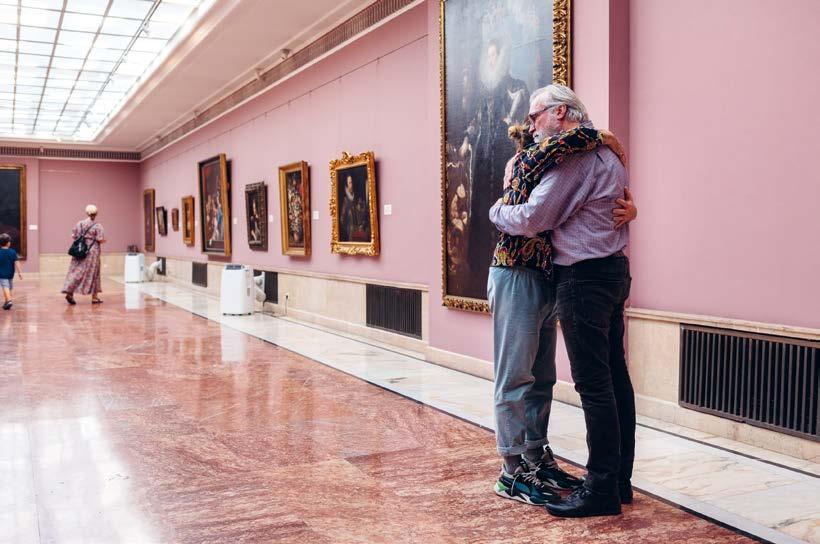
Stand Up for a Democratic Europ e
In 2023, ERSTE Foundation made its first investment in a fund with a social purpose: Pluralis. The Dutch limited liability company aims to preserve media diversity in Eastern Europe by making targeted investments in media. It sees strong owners who do not pursue their own interests as the best prerequisite for guaranteeing editorial independence.
At Least One Independent Voice in Every Country
ERSTE Foundation invests in media diversity in Eastern Europe

Mariusz Blaszczak, former Polish defence minister and member of the Law and Justice Party (PiS), speaks to journalists as he enters the headquarters of the Polish public television broadcaster in Warsaw on 20 December 2023, following the new government’s announcement that it had sacked those responsible for the state media. The state media were widely regarded as the government’s mouthpiece when the right-wing populists were in power.
Photo – Wojtek Radwanski / AFP
56
Europe
In the non-profit sector, Pluralis is a completely new approach to media funding. Thus far, foundations seeking to support media freedom and independent journalism were limited to investing in not-forprofit organisations or funding the training and networking of journalists (for example by covering conference costs) via NGOs. ERSTE Foundation, too, has been working with various NGOs and foundations to promote investigative journalism in Eastern Europe ever since it took up its philanthropic work. Reporting Democracy, for instance, a collaborative project with the Balkan Investigative Reporting Network (BIRN), is our largest journalistic project to date aimed at strengthening Eastern European democracies. Along with other European foundations, ERSTE Foundation is also an active partner in the Civitates network, which provides a funding programme that supports young European media companies with organisational development and improving their business models. Nevertheless, funds provided by the foundation sector to this area are still moderate.
Pluralis, on the other hand, was founded in 2021 with the aim of raising around 100 million euros to invest specifically in Eastern European high-reach media at risk of capture. Rather than establishing new media, the goal is to protect traditional publishers with well-known titles from being taken over or discontinued and mak ing them fit for the digital future. Around 50 million euros in mixed capital (shares, bonds and funding from other foundations that secure the returns on the investment) have been raised to date. In 2023 ERSTE Foundation invested in Pluralis by acquiring common shares worth 2.5 million euros.
The aim of the investments is to ensure that at least one independent media outlet can survive in every European country. Speaking during an event in Vienna on 13 November 2023, Boris Marte, CEO of ERSTE Foundation, officially announced the investment in Pluralis, explaining the reasons why the core shareholder of Erste Group has taken this unusual step: »Ever since we started to support the strengthening of democracies in Central and Eastern Europe, from the very beginning, we have also invested in independent journalism, primarily in the training and further education of journalists. Now we find that these highly trained media professionals have fewer and fewer media outlets where they can publish. Yet we absolutely need trustworthy news sources. Without trust, there is no courage to shape the future. And we need that more than ever in these times of multiple crises. The loss of media freedom has consequences for each and every one of us.«
Marte was particularly impressed by Pluralis’ concept of being funded by a variety of investors: »There is no majority shareholder. We are in the good company of other non-profit foundations, major European publishers who can contribute ex-
»Since the election, the new government has already blacklisted the daily SME. The prime minister refuses to answer our questions; instead, the government accredits conspiracy media, invites people from Russian propaganda sites to press conferences and favours them over my journalists...«
Beata Balogová
pertise, and other impact investors. Pluralis is not a kind of ›good oligarch‹ but an investor group with a diverse supervisory body that ensures that the impact goal of strength ening the editorial independence of media in Eastern Europe will always be the focus.«
Indeed, Pluralis has a wide range of funders and investors, from philanthropic foundations to leading European media houses. This blended finance approach means that investee companies benefit from a highly diverse ownership structure that prevents any perception of bias or external influence, which is crucial for maintaining their reputation for integrity and impartiality. Moreover, the funded companies can draw on the extensive strategic and technical knowledge of Pluralis investors, which helps them optimise the investment and take advantage of emerging opportunities. Foundations and media companies that have invested in Pluralis up until the end of 2023 include the King Baudouin Foundation, Oak Foundation, MDIF, Soros Economic Development Fund, Tinius Trust (the non-profit main shareholder of Norwegian media group Schibsted), Mediahuis, GLS Bank, VP Capital and various family offices. Other speakers at Vienna’s Concordia press club were Patrice Schneider, CFO of Media
57

Investment Development Fund (MDIF) and Secretary General of Pluralis, and Beata Balogová, editor-in-chief of Slovak daily SME. Currently, Pluralis has three media companies in its portfolio: the Polish publishing house Gremi Media, which publishes, among other things, the daily newspaper Rzeczpospolita, Slovak publishing house Petit Press, publisher of the daily newspaper SME, and the Croatian news platform Telegram.hr. Further investments are being planned.
Being a member of the EU does not guarantee independent journalism
Beata Balogová did not merely offer glimpses into the everyday life of a daily newspaper that was controlled by a vested owner for many years but is now part of the Pluralis portfolio. Her very personal report from Bratislava, a few weeks after Robert Fico and his SMER party were reelected, was bleak. »Since the election, the new government has already blacklisted the daily SME. The prime minister refuses to answer our questions; instead, the government accredits conspiracy media, invites people from Russian propaganda sites to press conferences and favours them over my journalists. Unfortunately, belonging to an EU country does not ensure independent journalism. That’s why we need media owners with integrity and good journalists who are interested in good journalism.«
MDIF’s Patrice Schneider said that the premise of Pluralis is simple: stable ownership guarantees independent newsrooms, independent newsrooms produce balanced, trustworthy news, which in turn has a positive impact on society. He emphasised that Pluralis is explicitly non-partisan. »Pluralis invests in independent, successful news companies that practice responsible high-quality reporting, regardless of their editorial orientation.« Democracies thrive on the social and political diversity of their populations, which should be reflected in the broad range of opinions and available media. A free market can ensure competition between providers of different media content, he said.
Should independent media be a matter of public good?
Discussants from Austria included Oscar Bronner and the managing director of the Austrian Press Agency (APA), Clemens Pig. Pig published an entire book on media and democracy in 2023: Democracy Dies in Darkness . He believes that state subsidies are an inadequate solution. The many state news agencies, for instance, are, in fact, not free from interference. He sees a way out of the dilemma in a cooperative approach by the sector and clever use of technical developments, especially with regard to the opportunities that artificial intelligence opens up.
Beata Balogová, editor-inchief of Slovak daily SME, which is part of the Pluralis portfolio.
Joanna Pianka

58
Patrice Schneider, Chief Strategy Officer of the MDIF and Secretary General of Pluralis, is one of the inventors of this new instrument to protect media diversity in Eastern Europe.
Photo – eSel.at / Joanna Pianka
Europe
Photo – eSel.at /
ERSTE Foundation CEO Boris Marte and Der Standard publisher Oscar Bronner talk about business models for independent media.
Photo – eSel.at / Joanna Pianka
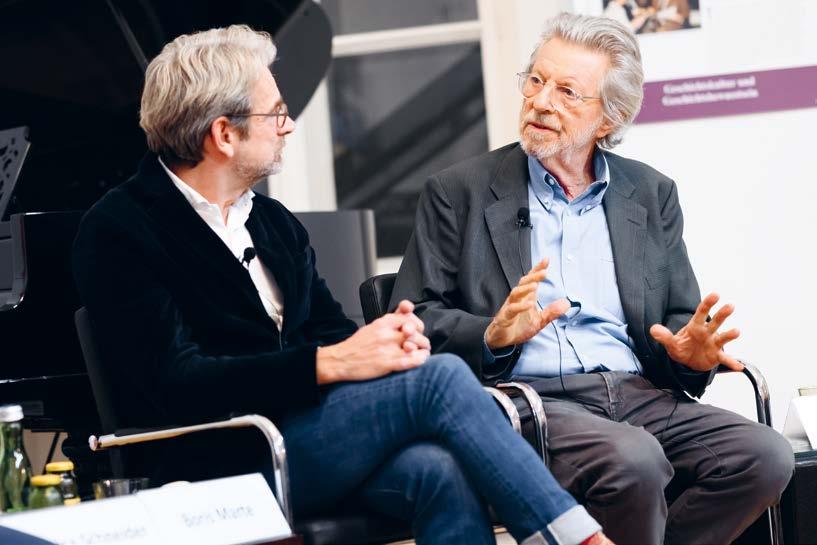
One of Austria’s media owners of integrity is certainly Oscar Bronner – the founder and former editor of Austrian magazines Trend and Profil and the daily newspaper Der Standard, of which he remains publisher. He pointed out how difficult it is today, even in wealthy countries, to produce economically successful media. He said that Austria was well on the way to becoming »a media world similar to that of Orbán«. Media financing requires a radical systemic change. There is currently no business model for good journalism. According to Bronner, we ought to consider whether to categorise independent reporting in future as a matter of public good in the public interest.
For ERSTE Foundation, Pluralis is certainly a good opportunity to gain experience with impact-oriented investment and the next logical step towards promoting independent journalism and media diversity in Eastern Europe.
Maribel Königer
There is currently no business model for good journalism. We ought to consider whether to categorise independent reporting in future as a matter of public good in the public interest.
Pluralis
Pluralis invests in high-reach, independent media companies in Central and Eastern Europe to ensure media diversity and prevent any form of appropriation. Pluralis is managed by the Media Investment Development Fund, which has over 20 years of experience in impact-oriented financing of independent media worldwide. ERSTE Foundation has invested in Pluralis since 2023.
pluralis.media

59
On 16 May 2023, ERSTE Foundation convened a group of scholars for its Time to Decide Europe Summit 2023, a one-day conference to address urgent questions raised by the return of war to Europe.
Will Europe Learn the Language of Power in Times of Polycrisis?
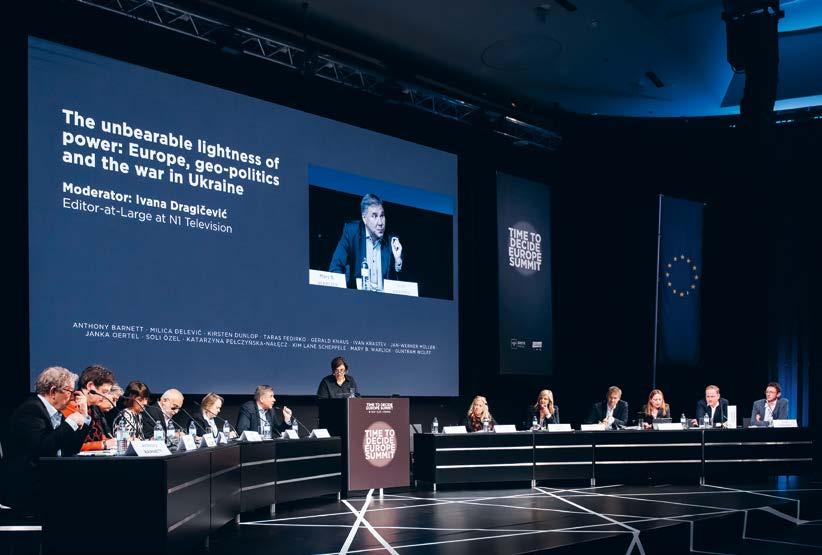
2023 was the first time that the Time to Decide Europe Summit was held in the Grand Hall on Erste Campus. As in the previous year, the event featured a panel of many experts, whose discussions were inspired by the keynote addresses.
Photo – eSel.at / Joanna Pianka
This followed the previous year’s inaugural Time to Decide Europe Summit, organised in the immediate aftermath of Russia’s springtime offensive. Again, the 2023 event featured an enormous panel of two dozen economists, journalists and political scientists spread across a wide stage. The day was divided into three sessions: the geopolitical implications of war, the state of European democracy, and the continent’s energy and environmental strategy.
The conversation was intended to be actionable, not academic. ERSTE Foundation CEO Boris Marte kicked off the summit by entreating participants to roll up their sleeves (he demonstrated this, literally, alongside co-host Ivan Vejvoda of the Institute of Human Sciences/IWM). If successful, the dialogue would serve as a call to action for policymakers, bankers and other civil society leaders in the audience.
Marte’s imperative to act, rather than simply reflect, speaks to an uncomfortable truth: Europe has turned a blind eye to war inside its borders for almost a decade. It’s become commonplace to mark the invasion of Ukraine as occurring on 24 February 2022. But the reality is that the war has simmered since Russia’s invasion and illegal annexation of Crimea in 2014, instigating a war that Europe learned to live with despite flagrant violations of national sovereignty, territorial integrity and grave threats to the continent’s energy security.
The recent escalation of war exposed the terrible cost of passivity. Twelve million people have been displaced, and entire cities destroyed. Over five million refugees have entered Poland alone (compared to about a million refugees across all of Europe in 2015), the most significant influx since the Second World War.
European leaders have pledged sweeping changes, including energy diversification, hikes in military expenditure, and expansion of the EU and NATO. Some actions, such as a painful decoupling from the Russian energy sector, have already
60
Europe

made remarkable progress. But others, such as shoring up democratic values across the continent, or raising military budgets as a percentage of GDP, are easier said than done and will require discipline, commitment and extraordinary levels of cooperation over the longer term.
Ultimately, the war presents Europe with a choice between determining its own future or having it decided by others, such as Russia, China or the United States. In his opening address, Austrian Minister of European and International Affairs Alexander Schallenberg called the return of war to Europe »an ice bucket thrown in our face, tearing us from our daydreams of a post-national and post-historic Europe«.
As the shock wears off, how will Europe respond? Will the continent »learn the language of power,« as called for by Josep Borrell, High Representative for Foreign Affairs and Security Policy, and chart its own course, or will it regress to a more reactive role on the world stage? As war once again normalises and fades from the headlines, the stakes are considerably higher with this second summit.
Of course, the conference could not provide all the answers. Perhaps the most popular word of the conference was »polycrisis,« coined by historian Adam Tooze, to describe the confluence of interrelated crises today’s decision-makers face, including the pandemic, climate change, economic and political polarisation, inflation, food and energy insecurity, and yes, geopolitical conflicts such as the war in Ukraine or mounting tensions in the Taiwan straits. This is a lot to take on, even for six hours of discussion.
But the summit delivered on its promise when panellists went beyond framing the issues to venture a substantial debate about Europe’s role in the world.
ERSTE Foundation CEO Boris Marte and Ivan Vejvoda, head of the Europe’s Futures programme, symbolically rolled up their sleeves to underscore their commitment to solving geopolitical problems during the discussions.
Photo – eSel.at / Joanna Pianka
Ultimately, the war presents Europe with a choice between determining its own future or having it decided by others, such as Russia, China or the United States.
Taras Fedirko (top right) is a lecturer in organised crime and corruption at the University of Glasgow. Milica Delević (bottom right) is the Director of Governance and Political Affairs at the European Bank for Reconstruction and Development.
Soli Özel (to her right) is a professor of international relations at Istanbul’s Kadir Has University and a columnist for the Turkish daily Habertürk.
Photo – eSel.at / Joanna Pianka


61
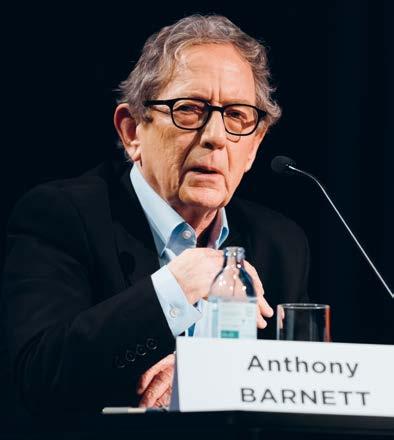
Antony Barnett (above) is an award-winning British investigative journalist. Next to Soli Özel (below) is Mary B. Warlick, Deputy Executive Director of the International Energy Agency.

»Europe’s collective history, memory and capacities ought to offer the world something constructive… but whether it has the agency to offer that, I don’t have an answer.« Soli Özel
It’s not as simple as »The West and the Rest«
Janka Oertel, Director of the Asia Programme at the European Council on Foreign Relations, kicked off the first session by rebuffing the Minister of External Affairs of India, S. Jaishankar, contesting his viral remarks at the Munich Security Conference that »Europe has to grow out of the mindset that Europe’s problems are the world’s problems, but the world’s problems are not Europe’s problems.«
»For once Jaishankar was wrong on two levels,« Oertel said. This conflict was not simply Europe’s concern: democracies and authoritarian governments alike would understand the war’s implications for their own national sovereignty and territorial integrity. Likewise, Europe is not isolated from the far-reaching impacts of the war, such as reductions in economic output, food security, food prices, fertiliser supply, fiscal space to finance the green transition, or climate adaptation and mitigation measures. The conflict unearthed a shift in the global balance of power that impacts everyone.
»The China-Russia cooperation has brought the notion that China is a security challenge much closer to Europe’s shores,« Oertel continued. »Those that believed that Taiwan would be Asia’s problem and Europe could stay out of it are much more contested.«
While Time to Decide may have been catalysed by Russia’s war in Ukraine, its true preoccupation – across geopolitics, democracy, economics and the environment – was actually China, which dominated much more of the conversation. Would China and Russia be able to able to forge an alternative order, undermining decades of Western and US-led hegemony?
A new rival comes into focus
It’s evident that the war has shored up the Western alliance in many respects, drawing new members into NATO and resuscitating moribund EU enlargement negotiations. But Chinese-Russian cooperation forces much more difficult questions for Europe, especially regarding its trade relationship with the world’s largest exporter of goods. Will Europe join the United States in instituting more protectionist measures, aligning itself to the »New Washington Consensus« as defined by US National Security Advisor Jake Sullivan? Or should it insulate itself from an unreliable transatlantic partnership, the turmoil of the US political system, and deepen economic ties with China?
Soli Özel, Senior Lecturer at Istanbul Kadir Has University, highlighted the precarity of navigating such decisions in a geopolitical landscape of asymmetric multipolarity. »The old rulers no longer have the power to impose their will. But the rising powers, including China, do not yet have the capacity to offer us an order and rules we can live by,« he said. »Europe’s
62
Photo – eSel.at / Joanna Pianka
Europe
collective history, memory and capacities ought to offer the world something constructive… but whether it has the agency to offer that, I don’t have an answer.«
Neither, frankly, did anyone else, leaving it unresolved if Europeans were even capable of collective decision-making in many areas.
Jake Sullivan’s New Washington Consensus speech provides one vision of what a more coherent (and decisive) Europe might look like. Perhaps intentionally, it makes reference to only one European leader: European Commission President Ursula von der Leyen, who makes an ideal pan-European representative as a politician both of the EU and the continent’s largest economy. Sullivan beckons Europe (as well as G7 countries and other allies) to decouple economic interests from an ascendant China, suggesting the »friend-shoring« of clean-energy manufacturing via protectionist trade policies such as the Inflation Reduction Act.
But some participants challenged the notion that Europe could, or should, speak with one voice. Gerald Knaus, Chairman of the European Stability Initiative (ESI), vehemently rejected the vision of Europe as a liberal empire. »I don’t see Hungarians, Slovenes, Austrians, Irish, Dutch, ever wanting to have a European Union that is a power in the rest of the world because it’s not going to be a state. The Union can’t even send one policeman to Poland or Hungary to enforce its laws,« he said. »It’s based on invitation and voluntary association, and that’s its strength, not its weakness.«
While it may not be a weakness per se, it’s unclear how a Europe – increasingly defined by the rising nationalisms of its members –could effectively assert geopolitical influence without more state-like features.
EU enlargement: not so fast
While most participants agreed on its virtues and necessity, EU enlargement was another area that surfaced unresolved questions about Europe’s place on the world stage. Enlargement is seen as an effective security strategy. Knaus went as far as to suggest the EU’s stalled process, which has seen no countries join since Croatia in 2013, was to blame for the war.
Whether that is true or not, Russia’s invasion of Ukraine may have accelerated the country’s accession to the European Union, a prospect that would add as many as 40 million new people and fundamentally change the composition of the European Union.
Milica Delevic´, Director for Competitiveness, Governance and Political Affairs at the European Bank for Reconstruction and Development, pointed to a revitalisation of enlargement efforts after 20 years of »a bureaucratic exercise in the exchange of hypocrisy between accession countries in the process and the European elites themselves.« But the war »basically integrated Ukraine dramatically without any change of
Janka Oertel is Director of the Asia Programme and Senior Policy Fellow at the European Council on Foreign Relations.
Photo – eSel.at / Joanna Pianka

methodology or technical process,« seeing a directive allowing Ukrainian citizens to live, work and use social services in Europe, which normally would be delivered at the end of the enlargement process. Europe suspended tariffs and quotas on Ukrainian imports, and a rapid process of real integration happened.
Is this an approach we can make work for others like Moldova, or candidate countries in the Western Balkans such as Albania, Bosnia and Herzegovina, Montenegro, North Macedonia or Serbia? Formal accession for these states will be difficult. Even putting aside political disputes in the Balkans, accession will be stymied by the more stringent admission process instituted in 2020, and the fact that none of the candidates are close to fulfilling all 35 »chapters« of EU law necessary to join.
And that’s not all. Serious impediments exist beyond the bureaucracy itself.
Katarzyna Pełczyńska-Nałęcz, Director of the Institute for Strategies 2050, pointed to social factors that threaten to disrupt accession, despite the near-universal popularity of expansion in principle. For example, rural farmers in Poland, otherwise supportive of Ukraine, restricted Ukrainian agricultural exports in April 2023 in order to protect local markets. (This also occurred in Bulgaria, Hungary, and Slovakia.)
Pełczyńska-Nałęcz warned that »if we focus exclusively on the political process and forget the social sentiment, we will fail.« Opposition could emerge from other quarters, considering that the distribution of EU funds would be radically rearranged if Ukraine joined. Considerably poorer than other states – the GDP per capita of Ukraine is four times lower than that of Poland, which is still below the European average –and a fifth of the Union’s farmland, it would suck up billions in funding through regional aid programmes and the Common Agricultural Policy (CAP). Where today 18 of the EU’s 27 members are net beneficiaries of EU funding, Ukraine’s accession would shrink that number to four or five, according to informal EU estimates.
Without serious reforms to the CAP and unanimity rules, even expansion seems out of reach for Europe. Does de facto European expansion in war zones, as seen by temporary measures for Ukrainians today, represent a path forward? Ursula von der Leyen has suggested Balkan countries might integrate into the digital market before full membership. But these steps don’t exactly compare with the inspiring and hard-fought efforts to bring 13 new members to the EU between 2004 and 2013.
63

Democracy in the crosshairs
At this point, I was getting a little despondent looking at my rolled-up sleeves. But thankfully, some topics outside of geopolitics proved less intractable. The second panel grappled with the rise of the far right and populist movements, as exemplified by Prime Minister Viktor Orbán in Hungary since assuming office in 2010, Vladimir Putin’s complete capture of the Russian state, or Donald Trump’s hostile takeover of the Republican Party in the United States.
»The precedent of catalysing unprecedented change using emergency measures, of beginning to act together, does open up a very interesting space for action.« Kirsten Dunlop
»Democracy is not dying a natural death, it’s being murdered,« said Kim Lane Scheppele, a Princeton professor specialising in authoritarian political systems. She explained that aspirational autocrats typically come to power by taking advantage of some sort of disproportionality in the election system, such as the electoral college in the United States. Once instated by democratic means, they subsequently manipulate election and judicial rules to consolidate and entrench their power. Strongmen like Orbán maintain democratic legitimacy by focusing voter attention on culture war topics, using media properties, think tanks and even universities in Hungary and beyond to extend their influence. (Scheppele noted that the private Modul University in Vienna was recently bought by the Hungarian Mathias Corvinus Collegium, widely considered to be Orbán’s propaganda organ.)
Jan-Werner Müller, a political scientist at Princeton University, argued that changes in elite behaviour, rather than those of »irrational« voters, are to blame for the popularisation of right-wing beliefs such as the Great Replacement Theory, which posits that a ruling class has conspired to replace whites in the West. In Müller’s estimation, coalition governments that have opened themselves to far-right parties, such as the Freedom Party in Austria (FPÖ), ultimately normalise corruption, bigotry and the destruction of the rule of law. Businesses and media can play a role by underwriting or platforming far-right politicians in exchange for influence or profit.
It follows that the responsibility to protect democracy falls to those with political influence. »If it’s about elites, some of us have a chance to talk to some of the relevant actors,« Müller explains to the crowd composed largely of bankers, politicians, journalists and academics. »If the liberal story – that the masses hate democracy –were true, it’s much less obvious what could really be done.«
64
Kirsten Dunlop is Chief Executive Officer at EIT Climate-KIC, Jan-Werner Müller teaches political theory and the history of political ideas at Princeton University.
Europe
Photo – eSel.at / Joanna Pianka
War and the Green Transition
Last but not least, the group took on the triad of European economics, energy and environmental policy. Speakers reminded us of Europe’s successful efforts to decouple from Russian oil and gas after a decade of strategic complacency, defying early predictions that this could cost over ten per cent of German GDP. This was a triumph for European cooperation, marked by resilient, open markets, and fast-tracked the continent’s green energy transition. Hopefully, it signalled Brussel’s capacity to move quickly when needed.
But here too, the pressing decisions revolved around China. Would it be a cooperation partner, competitor or rival when it comes to economic and climate policy? Guntram Wolff, CEO of the German Council on Foreign Relations (DGAP), believed China must necessarily be considered a rival, given that it’s now the world’s largest contributor to climate change, with per capita emissions equalling the European Union, and has exported high-polluting development models, such as coal power plants, in the context of its Belt and Road Initiative.
In order to reach ambitious decarbonisation goals, the European Union must extend its influence abroad and provide an alternative model.
»We are underinvesting in third countries,« said Wolff. »We need to find energy transition partnerships and support them with real money… and only then can we compete with China.« He also noted that Europe must foster its own climate tech industry to keep pace with China’s booming market for electric vehicles, sodium-ion batteries and renewable energy infrastructure.
How does this come about? On its surface, the solutions are clear: the European Commission has put forward its impressive Green Deal Industrial Plan in response to American IRA subsidies, and public and private attention is shifting to sourcing critical raw materials necessary to bring it to life.
But Ivan Krastev, Permanent Fellow at the IWM, warned that the politics of financing the transition will not solve everything. Could we really count on the support of Dutch farmers, or Eastern European voters wary of climate politics with war on their borders? »Now you have elites in Europe who understand this is an existential crisis,« he said. »But how can we solve multiple crises where there is not one silver bullet? This is the problem with Time to Decide Europe: time to decide on what?«

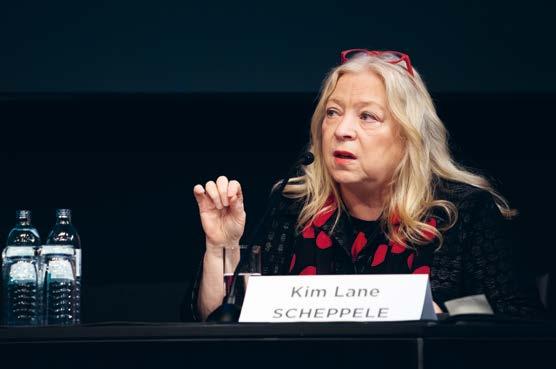
Timmermans
Indeed, it’s hard to imagine most Europeans can rally behind »plural, polycentric, networked action« to save our planet, as described by Kirsten Dunlop, Chief Executive Officer at Climate-KIC. What could we do to shore up democracy to walk this tightrope? How could technology play a positive role here? The summit didn’t substantially address these questions, which might merit all-day conferences of their own.
In the meantime, I left with a mixture of hope for Europe and concern that it took a cataclysmic war to come to terms with its future. As Dunlop said, »The precedent of catalysing unprecedented change using emergency measures, of beginning to act together, does open up a very interesting space for action.«
Alexander Whitcomb
Watch the video of the event:

sent a video message. He was the first Executive Vice President of the European Commission for the European Green Deal and European Commissioner for Climate Action in the von der Leyen Commission. Kim Lane Scheppele (below) is Laurance S. Rockefeller Professor of Sociology and International Affairs in the Princeton School of Public and International Affairs and the University Center for Human Values at Princeton University.
65
Frans
(above)
Photo – eSel.at / Joanna Pianka
How Russia’s Full-Scale Invasion of Ukraine Transformed Europe

Nathalie Tocci was Europe’s Futures Fellow 2022/2023. She wrote this essay as part of that programme. Tocci is the director of the Istituto Affari Internazionali (IAI) in Rome, honorary professor at the University of Tübingen and adjunct professor at the EUI’s School of Transnational Governance, where she focuses on peace and security.
66
An Essay by Nathalie Tocci
Europe
Photo – Richard Pilnick
When Ursula von der Leyen moved into the Berlaymont four years ago, she declared that hers would be a »geopolitical« Commission. No longer was it just a »political« Commission, like her predecessor Jean-Claude Juncker had dubbed his executive power. Given the growing rivalry between great powers and the exquisitely transnational nature of the major challenges of our age, Europe had to become a »geopolitical« player worthy of the name. Little did we know in 2019 that the years that followed would be marked by a global pandemic and a nuclear-armed power’s brutal invasion of its neighbour: by far the two greatest geopolitical earthquakes since the end of World War II. With the pandemic over and Russia’s invasion of Ukraine well into its second year, as the EU enters the last lap of its political-institutional mandate and heads towards European elections, what can be said of the Union’s geopolitical ambitions?
Political unity and leadership
Let’s begin with the good news. Any observer of Europe’s role in the world is quick to finger-point the EU’s age-old problem castrating its global ambitions: divisions between member states. Political division between members coupled with unanimity in decision-making in foreign and security policy, underlie the most often cited slogans belittling Europe’s global ambitions. How many times have we heard that Europe is a »player but not a player,« or that while being an economic giant, it remains a »political pygmy«? Underlying these – by now unimaginative stereotypes –is always the same virus of disunity between member states and their unwillingness to give up sovereignty in the most jealously guarded fiefdom of foreign policy.
Russia’s invasion of Ukraine brought back to the fore the question of unity. Russia is a particularly divisive issue for the EU. Northern and Eastern European countries have traditionally pushed for a tougher stance, while Western and Southern states used to press for cooperation. The tension between these two camps explains why Russia’s annexation of Crimea and military intervention in Eastern Ukraine saw the EU take a two-track approach of sanctions and selective engagement.1 When the fullscale war began, many feared that divisive forces would eventually gain the upper hand. They may have anticipated that moment of unity at the outset, when the shock of Russia’s invasion and awe at Ukrainian resistance galvanised joint European action, but feared that this would dissipate as the months dragged on and as Europe reeled under the economic, energy and humanitarian costs of war. Indeed, by the summer of 2022, the concern was the growing European rift between the »peace« and »justice« camps, with countries further away from the frontline pressing for an immediate ceasefire, and those closer to the heat of war convinced that peace cannot be achieved at the expense of justice. 2 It is this latter group that argue that Ukraine should be supported until it has fully liberated its land and its people. However, despite this political divide, the EU has mustered and maintained a united
1 Tocci. Framing the EU Global Strategy. London: Palgrave, 2017.
2
Tocci. »Can Russia Divide Europe?« August 2022. https://www.foreignaffairs. com/europe/can-russia-divide-europe ; Krastev, Leonard. »Peace versus Justice: The Coming European Split over Ukraine.« European Council on Foreign Relations, 15 June 2022. https://ecfr.eu/publication/peace-versus-justice-thecoming-european-split-overthe-war-in-ukraine/
3
Operational Data Portal. Refugees from Ukraine recorded across Europe. www.data.unhcr.org/en/situations/ukraine
»However, despite this political divide, the EU has mustered and maintained a united policy response, which is becoming more unified, not less, as the war progresses.«
policy response, which is becoming more unified, not less, as the war progresses. EU member states unanimously agreed on eleven packages of sanctions on Russia. The most significant one came in the early months of the war, and, as time passed, the time lag between one package and the next increased. This is because after having sanctioned finance, technology, coal and oil, seized Russian public and private assets, banned responsible individuals, capped energy prices, and reduced the import of Russian gas to a trickle, there is little left to sanction. Rather than adding many more sectors, the bulk of the work on sanctions now concentrates on closing loopholes and tightening the implementation screws. This brings the EU into even more politically complex territory, especially when this means agreeing on how to handle powerful third states like China that facilitate the circumvention of Russia sanctions. Should the EU sanction third states, including China? Would this imply extra-territorial sanctions that the EU so vehemently condemns the United States for? And if punitive measures are to be foreseen against such third states, how is the EU going to equip itself to face eventual retaliation? China has already hinted rather explicitly that it would not stay quiet, were the EU to proceed on this course of action. Over the months, some disagreements have surfaced
and remain to be ironed out. However, as regards the most politically toxic case – Victor Orbán’s Hungary – the Union has developed ways of containing the damage. Orbán’s manoeuvrings have broadly failed, in fact, with the European Commission using a novel form of economic conditionality linked to the rule of law. In December 2022, the Commission held back 22 billion euros in cohesion funds for Hungary until it fulfils conditions related to judicial independence, academic freedom, LGBTQI rights and the asylum system. Another area that could have proved Europe’s political Achilles heel is asylum. Alongside the eight million internally displaced persons within Ukraine, there are over eight million Ukrainian refugees in Europe, almost five million of whom have received temporary protection in the EU, with the right to live, work and travel across member states. 3 When the war broke out, European publics were overwhelmed by a wave of solidarity. The brutality of Russia’s invasion, the heroism of Ukrainian resistance and a shared sense of destiny with Ukraine converged in explaining Europe’s unprecedented humanitarian response to the war. Europe’s solidarity with Ukrainian refugees was as inspiring as its closure and indifference to the plight of those from elsewhere is shameful. However, here too many believed
67

Ukrainian President Volodymyr Zelenskyy (centre), European Commission President Ursula von der Leyen (right) and European Council President Charles Michel during the EU-Ukraine summit in Kyiv on 3 February 2023.
4 Tocci. »Putin versus Monnet: European Resilience, Energy and the Ukraine War.« IAI Papers, September 2022. www.iai.it/sites/default/files/ iaip2225.pdf
5 International Energy Agency. »CO2 Emissions in 2022.« Report. Paris: March 2023. www.iea.org/reports/co2-emissions-in-2022
that time would take its toll as Ukrainian refugees would outstay their welcome. While it is true that some tensions are surfacing, especially in countries like Poland that host the lion’s share of Ukrainian refugees, in the end, the fear that they would wear out their welcome has proved unjustified. Millions of Ukrainians continue to live in the EU, and with their refugee status extended. All in all, it is remarkable how the EU has been able to absorb the second largest wave of refugees worldwide (after Syria) without this causing major socio-economic and political disruption.
To date, the EU is standing firm politically. Divisions have not grown. In fact, they have narrowed. In the early months of the war, West European countries – notably France – spoke of the need for negotiations and infuriated North and East Europeans by insisting on the need for Russia not to be humiliated. But there are few in Berlin, Paris or Rome who now believe in the potential for negotiations, ceasefire, let alone a peace agreement with Russia. This unity is not limited to the EU. Russia’s invasion of Ukraine has put the poisonous post-Brexit EU-UK relationship on a different footing; it has ushered in unparalleled transatlantic unity, notwithstanding acute differences over trade and industrial policy, and it has gelled cohesion within the G7 and other like-minded countries, such as Australia and South Korea.
This has happened alongside another significant political development. A corollary of the criticism of Europe’s political divisions is that the Union is accused of not having a »single voice.« While Henry Kissinger does not recall having made the joke, one of the most cited phrases on Europe attributed to him is that there is »no telephone number to call to speak to Europe.« Partly as a consequence of Angela Merkel’s exit from German politics and partly due to the absence of other European leaders of her stature, today there is a telephone number that springs to mind and it’s in Brussels. Commission President von der Leyen has navigated both the pandemic and the war remarkably well. Not only does she outsize other institutional figures in EU institutions, like European Council President Charles Michel and High Representative Josep Borrell, but she has also become a familiar face in European and global politics writ large. She is well respected in Washington and has made her voice and views heard across the world. She has taken a strong stance on Ukraine, enlargement, the energy transition, defence and industrial policy.
This does not mean she has been successful all around. Specifically, the war has revealed a deep chasm that divides Europe (and the West) from the so-called Global South. Although there are only seven countries that openly stand with Russia in the UN General Assembly, 32 others abstain from votes. Of these, setting aside China, which backs Moscow in all but name regardless of European attempts to nudge Beijing into exerting its influence on Moscow, the rest are more genuinely neutral concerning the war, although for different reasons. While there may be some anti-European sentiment, it is interests rather than ideas that are driving the ambivalence. In most cases, especially in
relatively small, distant and poor countries in Africa, Asia, and Latin America with challenges of their own, the war is either viewed as a »European war,« and/or what matters are its consequences, beginning with food security. What they are more interested in is ensuring that the war ends quickly, even if this costs Ukraine its independence, sovereignty and territorial integrity. Alongside a »poor Global South,« there is also a »power Global South«: a smaller group of mid-sized powers that do not want to passively stay clear of the war and its consequences, but rather wish to exploit their neutrality to serve their interests and increase their power. They have opportunistically leveraged their neutrality to extract gains from both sides. Countries like India stand out in this respect, as well as Turkey, Saudi Arabia and the UAE. These countries have condemned Russia at the UN General Assembly, but they have also used their relations with Moscow and Kyiv to present themselves as mediators, send weapons to Ukraine, and increase their trade and energy imports from Russia. When it comes to many countries in Africa, Latin America and South and South-East Asia, Europe has a long way to go to establish trust, redeem its reputation and build win-win relationships. But successes or failures aside, when it comes to voice and visibility, the EU, perhaps for the first time in its history, has a face vis-à-vis the rest of the world.
Economic and energy resilience
If Europe has scored relatively well politically in terms of unity and leadership, it is largely because it has weathered the storm of the energy crisis remarkably well. This averted what could have been a devastating economic recession on the continent. In late spring 2022, the International Monetary Fund had predicted a contraction of three to five per cent in countries like Germany, Italy, Hungary, Czech Republic and Slovakia. When the war began, few would have bet on the fact that with Russian gas closed off to Europe, the EU would have survived energetically, and therefore economically and politically. Vladimir Putin expected Europe to bend and eventually break over their need for energy, which is precisely why he turned the taps off at the cost of hurting Russia, too.4 Europe was partly aided by exogenous factors like a warm winter and sluggish Chinese growth, but the EU and its member states also put in place a set of key measures that ought to be credited. They diversified their gas supplies by increasing imports from Norway, the US, Qatar, Azerbaijan, Algeria, Angola, Mozambique and the Republic of Congo. They met their targets for the refilling of gas storages and developed a European Energy Platform to aggregate gas demand ahead of next winter. They coordinated the reduction of gas and electricity consumption and met the targets they set themselves. And they accelerated the development of renewables, with these now representing the primary source of electricity generation in Europe. Notwithstanding the fuel switch from gas to coal and oil, overall emissions in Europe fell by 2.5 per cent in 2022. 5 All this has meant that Europe, so far at least, has averted the risk of recession, and, albeit slug-
68 Europe
Photo – Press Office of the Ukrainian President via AP
gishly, its economy continues to grow. This does not mean that the energy crisis is over and that the EU has squared the circle of energy security and the energy transition through deeper integration. Plenty of challenges remain. These include short-term ones concerning Europe’s energy and economic resilience next winter, especially if China’s growth picks up, while a hot summer could lead to higher-than-expected gas consumption and lower renewable energy production in Europe. Meanwhile, new-born instruments like the European Energy Platform still need to fully prove their worth. Moreover, there are even greater longerterm challenges. While energy prices have dropped in Europe from a peak of 340 euros/ MWh to around 30 euros/MWh, they are still double what they used to be before the energy crisis and four times as high as in the US. Coupled with the potential impact of the US Inflation Reduction Act that could lure European companies to the other side of the Atlantic, the risk is Europe’s deindustrialisation. China aggravates the problem. Beijing’s market dominance in areas like renewables, critical minerals and batteries, alongside Europe’s heightened awareness of the vulnerability generated by energy dependences, push Europeans to re-shore, near-shore or friendshore green technologies and industries. Yet doing so is not easy and certainly comes at a high cost that will strain public budgets further. There is no silver bullet to address these problems, and as the EU scrambles for a solution, it could fall into the trap of protectionism and debt unsustainability. It remains to be seen whether the EU’s Net Zero Industry Act will strike the right balance between security, affordability and sustainability and above all whether in the next political-institutional cycle the EU will succeed in putting more flesh on the bones of its nascent industrial strategy. At the moment, discussions over a new economic security fund are rather unimpressive, with figures hovering in the double digits at most. This connects to the political landscape that will emerge after the European Parliament elections in 2024. There is already a green backlash ongoing in Europe. Dutch farmers complaining about the EU’s stringent nitrogen targets, the German automotive industry lobbying for an e-fuel exemption to the ban on combustion engines, the related Italian push in favour of biofuels, the heated German debate over the phase-out of gas boilers, President Macron’s call for a moratorium on the EU’s green legislative agenda, the Polish insistence on extending coal subsidies until 2028, and the EP’s difficulties in moving forward on the biodiversity agenda are only some examples. The question is whether this green backlash is the natural consequence of a decarbonisation trajectory in Europe that is finally getting real, or whether, by contrast, it indicates the beginning of a slowdown or perhaps even halt and reversal of the EU’s green momentum. The outcome of the 2024 EP elections, and the political majority that will emerge as a result, will be critical in this respect. If there were a slowdown or even a reversal of the European Green Deal, the corollary question is how this would impact the EU’s
industrial and investment policies. Will Europe find itself increasingly playing green (and digital) catch-up with both the US and China? EU institutions and member states are aware of the trilemma of efficiency, affordability and sustainability as they search for solutions. It remains to be seen whether they’ll succeed in finding the right equilibrium as they confront contrasting political, social and economic forces in the months and years ahead.
The challenges ahead: enlargement and defence
The challenges do not stop here, however. In two other areas, the tasks ahead of the EU are just as daunting. The first is enlargement. While never formally halted, the EU’s enlargement process gradually ground to a halt after the big-bang eastern enlargement of the early 2000s. With the exception of Croatia in 2013, no country has entered the EU for almost two decades. The accession process has formally continued with the Western Balkans and Turkey, but it has been increasingly characterised by a double farce: candidate countries have largely pretended to reform, and the EU has pretended to integrate them. The outcome has not been ideal: democracy and rule of law have faltered, economic development has languished, peace processes have stalled, and powers like Russia and China have increasingly made their presence felt. But the Union was absorbed by its successive existential crises, and by and large thought that stability in its neighbourhood would hold. The results were not great, but they were believed to be good enough.
 European Commission President Ursula von der Leyen with US President Joe Biden (right) and Indian Prime Minister Narendra Modi at a Partnership for Global Infrastructure and Investment event during the G20 Summit in New Delhi on 9 September 2023.
European Commission President Ursula von der Leyen with US President Joe Biden (right) and Indian Prime Minister Narendra Modi at a Partnership for Global Infrastructure and Investment event during the G20 Summit in New Delhi on 9 September 2023.
69
Photo – REUTERS / Evelyn Hockstein / Pool
That illusion was shattered by Russia’s invasion of Ukraine. Suddenly it became obvious that stability, while guaranteed within the EU and NATO, cannot be taken for granted on the other side of the »frontier.«6 Unsurprisingly, Ukrainian President Volodymyr Zelensky applied for EU membership three days into Russia’s large-scale invasion of his country. Now, Ukraine and Moldova are recognised as candidate countries, while Georgia given its government’s authoritarian turn despite public backlash – is a potential candidate. In the Western Balkans, Albania and North Macedonia have opened accession negotiations, Bosnia-Herzegovina has been recognised as a candidate, and the change of leadership in Podgorica could revamp momentum for enlargement in Montenegro. All this does not yet amount to a decisive revival of the EU’s accession policy, and plenty of problems remain to be solved. The most urgent of them is the dramatic deterioration of relations between Serbia and Kosovo, with the renewed eruption of violence in the region. Alongside, deep reforms await both candidate countries as well as the EU, as it will need to grapple with reforms of its institutions, decision-making procedures and policies in key areas such as agriculture and cohesion.7 However, it is becoming increasingly obvious – to EU member states and candidate countries – that there is potentially an extremely high cost to non-enlargement: the status quo is an intolerably high-risk gamble for European security.
This brings us to a final set of challenges that pertain more directly to security and defence. Russia’s invasion of Ukraine has created a contradiction. Europeans finally take security and defence more seriously. The war has led to more defence spending across Europe, from Germany’s defence Zeitenwende of 100 billion euros additional spending on defence, to the more diffuse uptick in defence expenditures across mostly Northern and East European states. European countries have spent approximately an additional 75 billion euros per year on defence since the war began, bringing NATO’s two per cent of GDP in defence spending finally within reach. 8
EU institutions that traditionally considered defence a dirty word have now mobilised a European Peace Facility to support Ukrainian defence. They have also approved a military training mission for the Ukrainian armed forces. Collectively, the EU and its members have provided 12 billion euros in military assistance to Ukraine as of March 2023 (and a total of 67 billion euros if economic assistance is included). The EU has also developed a mechanism for the procurement of ammunition for Ukraine, committing a first 2 billion euros instalment to the endeavour.
In times of peace, this would have been read as hard evidence of European strategic military autonomy in the making. In times of war, paradoxically, the opposite is true. Russia’s invasion of Ukraine is leading to a dramatic increase in European defence dependence on the US. This is true in operational terms: without US military support for Ukraine, Kyiv would have likely fallen, putting at an unprecedented risk
the entire European continent. It is also true in terms of defence capacities. As Europeans are depleting their stocks, they spend to replace them with what is available: this is often American, not European. This does not mean that European defence industrial projects have stalled altogether. There are several that are promising, including: the European Patrol Corvette, including France, Italy, Greece, Spain and Norway, as an observer; European space projects, including the Commission and the European Space Agency; the first steps in a European helicopter project including France, Germany, Italy and the UK; and – provided ways are found to partner also with West European countries – Germany’s missile defence initiative with East European countries. However, in times of war, the bulk of European defence spending is being targeted not to future projects but to short-term fixes, which means that, in relative terms, European dependence on US defence industry is increasing.
This is bad news for Europe. Transatlantic relations have not been as strong as they are currently in many years, but this could reverse quite soon. If a Republican candidate were to win the 2024 US presidential elections, the US’s commitment to Ukraine and to European security could be scaled down. This would leave Europeans at massive risk. Moreover, aside from the question who will win the next US presidential election, Europe’s greater dependence on the US will most likely translate into its reduced ability to chart its way in the world. Especially regarding China, while European and US views are broadly convergent – with European views having distinctly hardened since the pandemic – they are not identical. There is, in fact, a substantial difference between the US drive for a decoupling of the Chinese and US economies, and the EU’s calls for de-risking. This is because Washington’s view is essentially competitive in nature. By decoupling in sensitive technological areas, the US aims to slow down China’s rise. Whereas Europeans also talk about China as an economic competitor and systemic rival, it is not really competition they are most worried about. What Europeans fear is China’s ability to exploit European vulnerabilities to gain strategic gains and interfere in European systems. Against the backdrop of Russia’s weaponisation of energy, by »de-risking« their relationship with China, the EU seeks protection and wants to avoid making the same mistake twice. In short, US and European views on China overlap but are not the same. Yet Europe’s growing defence dependence on the US may well mean that its ability to chart its own way vis-à-vis China has been significantly reduced. Europeans cannot reverse this situation in a matter of months, it should have been addressed many years ago. A sense of impotence may be part of the reason why, politically, this question continues to be avoided, although it does not make the problem disappear.
Finally, whereas European security and defence vulnerability are an existential challenge for Europe, they are a problem for the United States as well. When the US was an unrivalled global hegemon, it could afford to Europe
6 Tocci. »Russia’s War in Ukraine Turned Europe’s ›Buffer States‹ into Frontier States.« Foreign Policy Magazine, 2023, 14 March.
7 Delcour, Wolczuk. »Ukraine and the EU at the Time of War: A New Paradigm.« LibMod Policy Paper, Zentrum Liberale Moderne, 2022.
8 Grevi. »Shockwaves: How Does the War in Ukraine Impact the EU’s Grand Strategy?« Centre for Security, Diplomacy and Strategy. CSDS in Depth, March 2023. www.prodb4156475194d8706-vub.paddlecms.net/sites/default/ files/2023-03/CSDS%20 In%20Depth%205%20Shockwaves%20March%202023.pdf
70
The international container terminal in the port of the northern Chinese city of Tianjin on 2 February 2024.
Located on the coast of the Bohai Sea, the port of Tianjin is the largest port in northern China, the main maritime gateway to the Beijing region and one of the largest ports in the world.
Photo – Zhao Zishuo Xinhua / Eyevine / picturedesk.com

have relatively weak and dependent allies. Given that no power seriously challenged US supremacy on the global stage, there was no real price to be paid for European weakness. Europe’s defence dependence on the US benefited American defence industry and foreign policy given that European allies were generally drawn into US foreign policy adventures, notably in the wider Middle East. That era is gone. Today the US is challenged by China, and it knows it. It has an interest in having partners and allies that are capable and strong, at the very least in order to look after themselves. The potential costs of a vulnerable Europe in security and defence terms far outweigh the economic and strategic gains of a dependent Europe on the US. This realisation is beginning to dawn in Washington, but it is yet to trickle down across institutional and policy practice.
Conclusions
Russia’s invasion of Ukraine is profoundly transforming Europe, and in many ways it has forced the EU to live up to von der Leyen’s promise to be and act more »geopolitically.« Europe has reacted politically, energetically, and in terms of enlargement and defence. Crisis has not paralysed the Union into inaction, nor have the solutions found represented a lowest common denominator. Unprecedented sanctions, the first ever activation of the temporary protection mechanism, energy diversification, efficiency and accelerated transition, the revival of enlargement policy, greater defence spending, the development and use of the European Peace Facility, de facto representing an EU defence funding and procurement mechanism –all of these are ground-breaking developments. Some, like the steps forward made on energy, will certainly make the EU stronger and more strategically autonomous than what it was before the war. On other issues, like enlargement, it remains to be seen whether the EU will truly revive the enlargement process while reforming itself. With respect to European defence, the challenge is even greater, given that notwithstanding the significance of the EU’s moves, these are insufficient to reverse the trend of greater dependence on the US. And for a Union that wants and must play a stronger role on the global stage, this is bad news. The EU is a geopolitical player coming of age. For this it should be credited. Yet the age we live in is such that this may still be woefully insufficient.
The text was first published on 14 September 2023 on the Europe’s Futures Blog:

71
Europe’s Futures is a cooperation between ERSTE Foundation and the Institute for Human Sciences (IWM) to develop new perspectives for a restrengthened, united and democratic Europe by engaging liberal-democratic voices from Central, Eastern and South-Eastern Europe in high-level academic, social and political debate on the future of the European Union.
Europe’s Futures –Ideas for Action
Europe is living through its most dramatic and challenging period since World War II. The European project is at stake, and its liberal democracy is being challenged from both inside and outside. There is an urgent need from all quarters of state and non-state actors to address the burning problems, to buttress what has been painstakingly achieved through the political peace project.
Since 2018, each year six to eight leading European experts take up an engagement at the Institute for Human Sciences in Vienna. Europe’s Futures creates a platform of voices presenting ideas for action whose goal is to reinforce and project forward a vision and reality of Europe. The programme is an endeavour based on in-depth research, concrete policy proposals and encounters with state and civil society actors, public opinion and media. It is directed by Ivan Vejvoda.


72
Europe europesfutures.eu
Europe’s Futures Fellows 2022/2023



Veronica Anghel is a prominent academic and policy analyst from Romania. She is a lecturer in risk in international politics and economics at the Johns Hopkins School of Advanced International Studies. Previously, she was a Max Weber Fellow and assistant professor in political science at the European University Institute (EUI). Her research centres on the process of democratisation of Central and Eastern European countries, with a focus on the tension between formal and informal institutions in determining regime outcomes. She currently holds a visiting fellowship at the Robert Schuman Centre for Advanced Studies at the EUI. Her work has been published in the Journal of European Public Policy, East European Politics and Societies, Government & Opposition, and Survival as well as in edited volumes with Oxford University Press, Macmillan and ECPR Press. She is an editorial fellow for Government & Opposition. In Romania, Anghel worked as a foreign affairs advisor to the presidential administration and the Senate. Topic of her Europe’s Futures fellowship: »Wartime EU: Consequences of the Russian-Ukrainian War on the Enlargement Process«
Kristof Bender is an experienced analyst of the political economy of South-Eastern Europe and deputy chairman of the European Stability Initiative (ESI). He is a board member of the Kosovo Civil Society Foundation and an advisory board member of Institute Alternativa in Montenegro. Part of the ESI team since early 2000, Bender has lived and worked in Bosnia and Herzegovina, North Macedonia, Montenegro and Serbia. Previously, he was attaché for humanitarian affairs in the Austrian embassy in Belgrade. He was a researcher for the International Centre for Migration Policy Development and worked as a consultant for various institutions. Topic of his Europe’s Futures fellowship: »Bringing Back Meritocracy to the EU Accession Process«
Thomas de Waal is one of the principal European experts on the Caucasus. A British citizen, he is a senior fellow with Carnegie Europe, specialising in Eastern Europe and the Caucasus. He is the author of numerous publications about the Caucasus. The second edition of his book The Caucasus: An Introduction was published in 2018. He is also the author of Great Catastrophe: Armenians and Turks in the Shadow of Genocide (2015) and of the authoritative book on the Nagorny Karabakh conflict, Black Garden: Armenia and Azerbaijan Through Peace and War (2003). He co-authored (with Carlotta Gall) Chechnya: Calamity in the Caucasus (1998), for which the authors were awarded the James Cameron Prize for Distinguished Reporting. From 2010 to 2015, de Waal worked for the Carnegie Endowment for International Peace in Washington. Before that he worked extensively as a journalist in print media and for BBC radio. From 1993 to 1997, he worked in Moscow for The Moscow Times, The Times of London and The Economist, specialising in Russian politics and the situation in Chechnya. Topic of his Europe’s Futures fellowship: »Dealing With a Weaker Russia: Analysis and Implications«
Essay:

73
Europe’s Futures Fellows



Ivana Dragičević is a Croatian award-winning journalist and editor-at-large at N1 Television, the CNN affiliate for South-Eastern Europe. At N1 she also hosts the multimedia project Global, which highlights key international developments in TV shows as well as monthly podcasts and weekly columns. Previously, she worked at the Croatian public broadcaster HRT, where she reported on foreign policy, authored numerous current affairs documentaries such as the award-winning Anima Hotel Europe (2014) and served as correspondent from Belgrade. She is the author of the documentary series Voters 2024 and Future of Europe, produced in cooperation with the European Parliament, and of the acclaimed book Unequals (2018, in Croatian) on globalisation, global governance and inequality. Topic of her Europe’s Futures fellowship: »Voters 2024: Who Is the Future? On the young Europeans that will go and vote for the first time in the next EU elections«
Oksana Forostyna is a Ukrainian editor, author, translator, and an expert on Ukrainian politics and on the impact of disinformation on societies. She currently holds the position of Opinion Editor at Ukraina Moderna. Lately she has contributed to The European Review of Books, The Liberties and, as a Marcin Król Fellow, to Visegrad Insight. In 2015, she started her independent publishing agency TAO Publishing and was a co-founder of Yakaboo Publishing in 2016. She is the former executive editor for Krytyka Journal in Ukraine. Previously, Forostyna covered national politics in the Lviv daily Lvivska Gazeta and was the local correspondent for Voice of America (20042007). Topic of her Europe’s Futures fellowship: »Ukraine on the European Path and Its Adversaries«
Heather Grabbe is a top British political scientist and a distinguished advocate for democratic pluralism and open societies. She is a non-resident fellow at Bruegel, a visiting professor at University College London and senior advisor to the Open Society Foundations. She was the director of the Open Society European Policy Institute from 2009 to 2022. From 2004 to 2009, she was senior advisor to European Commissioner for Enlargement Olli Rehn, responsible for EU policy on the Balkans and Turkey. Previously, she was deputy director of the Centre for European Reform, where she wrote extensively on EU enlargement, EU external and neighbourhood policies, and the evolution of new policy agendas in climate, digital issues and the rule of law. Her columns appear in The Financial Times, Politico and other quality media. Grabbe was ranked highly among »the women who shape Brussels« by Politico, gave a TED talk on the importance of critical thinking and mindful engagement with post-truth politics, and has written recently on how climate change and technology are affecting the quality of democracy and economic and social justice. Topic of her Europe’s Futures fellowship: »The Politics of Creating a Resilient, Independent and Green Europe«

Video:

Essay:

74
Essay:
2022/2023
Europe



Balázs Jarábik is an award-winning analyst and decorated diplomat with 20 years of experience in managing large-scale international development projects in his native Slovakia and Eastern Europe. Currently, he is the team leader for the USAID-funded Rule of Law Project in Central Europe at Dexis Consulting. Between 2019 and 2022, he was head of the Political, Analysis and Coordination Department at the European Union Advisory Mission to Ukraine, seconded by the Ministry of Foreign Affairs of Slovakia. Prior to that, he was a scholar at the Carnegie Endowment for International Peace where he managed the award-winning »Reforming Ukraine« project, providing rigorous monitoring of central aspects of the reform process for key Western policymakers. Jarábik also worked with Pact, Inc. in Ukraine to build its presence as one of the largest international nongovernmental organisations in Eastern Europe. Topic of his Europe’s Futures fellowship: »Implications of Russia’s War on Ukraine and on the Neighbourhood«
Essay:

Nathalie Tocci, one of the leading political scientists in Europe, is the director of the Istituto Affari Internazionali (IAI) in Rome, honorary professor at the University of Tübingen and adjunct professor at the EUI’s School of Transnational Governance with a focus on peace and security. She was special advisor to the EU high representatives for foreign affairs and security policy Federica Mogherini and Josep Borrell. In that capacity, she wrote the book Framing the EU Global Strategy. A Stronger Europe in a Fragile World (2017). Tocci has been Pierre Keller Visiting Professor at the Harvard Kennedy School and an independent board member of Edison and Eni. She has held research positions at the Centre for European Policy Studies, Brussels, the Transatlantic Academy, Washington, and the European University Institute, Florence, and she has taught at the College of Europe, Bruges. Her recent major publications include the monographs A Green and Global Europe (2022), Framing the EU’s Global Strategy (2017) and Turkey and the European Union (2015, co-authored with Senem Aydin-Düzgit), as well as The EU, Promoting Regional Integration, and Conflict Resolution (2017, co-edited with Thomas Diez). She is a frequent media commentator and a columnist at Politico Europe and La Stampa. Topic of her Europe’s Futures fellowship: »Implications of the Russo-Ukrainian War for European Integration«. See also her essay on pages 66–71.
Ivan Vejvoda is head of Europe’s Futures at the Institute for Human Sciences (IWM) in Vienna. Before joining the IWM as a Permanent Fellow in 2017, he was Senior Vice President for Programs at the German Marshall Fund (GMF) of the United States. From 2003 until 2010, he served as executive director of GMF’s Balkan Trust for Democracy. He came to GMF in 2003 after distinguished service in the Serbian government as a senior adviser on foreign policy and European integration to Prime Ministers Zoran Ðjinđjić and Zoran Živković. Prior to that, he served as executive director of the Belgrade-based Fund for an Open Society. Ivan Vejvoda was a key figure in the democratic opposition movement in Yugoslavia during the 1990s, and has published widely on the subjects of democratic transition, totalitarianism and post-war reconstruction in the Balkans.
75
In 2023 the European Forum Alpbach once again reinvented itself. After envisioning the New Europe in 2022, this time the event centred on courage: A Bold Europe. As one of EFA’s three main partners, ERSTE Foundation again augmented the programme with its own events.
Alpbach’s Vision of a Bold Europe

with its beautiful Tyrolean landscape, awaits a multitude of Europe enthusiasts.
Photo – ERSTE Foundation
Returning to Alpbach in full strength after the pandemic, the Forum reinvented itself in 2023, the second year of Andreas Treichl’s presidency (who is also chairman of ERSTE Foundation’s supervisory board). The event was very well attended, with more than 4,200 participants gathering in the Tyrolean mountains.
EFA’s programme was clear: Europe must reduce dependencies while remaining open to the world. Climate change must be tackled actively and decisively. Europe’s economy needs to become more competitive by investing in technology and innovation. The times call for a new security architecture for our continent. And we must defend our democratic values against authoritarian influences. Europe needs to become bolder in shaping the world.
»Europe must be united, fast and bold. The annual theme, Bold Europe, means acting courageously: What do we need to make Europe energy-independent and capable of defence? How can European industry regain competitiveness?« said EFA President Andreas Treichl. He called upon those who gathered in Alpbach in the summer of 2023 to discuss the solutions to these and many other challenges.
As in the previous year, the EFA followed four thematic tracks: Rallying for Climate Action, Fighting for Europe’s Economic Sovereignty, Securing Europe in a Multipolar World, and Reinforcing Democracy and the Rule of Law in Europe. Technology and innovation were also considered as cross-cutting topics. A total of ten members of the European Parliament personally attended the Forum’s programme, taking an active part: Eva Maydell, Othmar Karas, Lukas Mandl, Reinhard Bütikofer, Sergey Lagondinsky, Niklas Nienaß, Monika Vana, Katalin Cseh, Anna Donáth and Hannes Heide.
76
Alpbach,
Europe
New modules
Renewed formats in 2023 featured the Euregio Days, Alpbach Seminars and Lab Days. Innovative minds searched for solutions to a specific topic in different settings. Stages, chats and hikes invited all participants to exchange ideas in the afternoons.
During the Lab Days (24–27 August), 30 to 40 selected experts worked on specific issues in a total of ten labs. ERSTE Foundation invited fellows from its Europe’s Futures network to Alpbach to share their expertise – and witnessed intense discussions, for example on EU enlargement. Participants in the lab on »Boosting the Entrepreneurial Growth Cycle«, which ERSTE Foundation was also involved in, discussed European capital markets along the financing cycle of companies. Thought leaders looked at best and worst practices, mobilising financial resources for innovation and financing traditional companies.
In its lab on youth and democracy, ERSTE Foundation sought to explore how to involve the next generation in participatory processes. Against the misconception that young people are apolitical, a lively discussion gave evidence that while they are highly motivated to shape their own future, young people do not always agree on the best methods to achieve this. The different generations in Alpbach were, however, unanimous in their view that there is not just one way to solve current problems. Only differentiated and diversely developed strategies can help overcome multipolar crises.

The President of the European Forum Alpbach and Chairman of the Supervisory Board of ERSTE Foundation, Andreas Treichl, opens the conference.
Photo – EFA / Andrei Pungovschi


The history of »Alpbach«
From the very beginning, the »international university weeks«, founded in 1945 and renamed the European Forum Alpbach in 1949, attracted numerous young people who were actively involved in the resistance against National Socialism. The founders »envisioned a comprehensive renewal of intellectual life in Europe. Together with a circle of like-minded people, they advocated a political unification of Europe, which was seen as the only way to exclude warlike conflicts between the European peoples in the future.«
ERSTE Foundation has been closely cooperating with the European Forum Alpbach for many years, using the event as an annual framework for its own community meetings from 2009 to 2016. Both have always shared a focus on social developments in Eastern and South-Eastern Europe. To the EFA’s guests from civil society, especially the younger ones, Alpbach, with its historic commitment to building a peaceful Europe, has always been the perfect location to shape a positive future together.
Dani Mühlbacher
EUROPEAN FORUM ALPBACH
The European Forum Alpbach was founded in 1945. Around 4,200 people from 98 nations attended the 2023 event, which took place from 19 August to 2 September under the theme Bold Europe. ERSTE Foundation has been a partner of the European Forum Alpbach since 2009.
www.alpbach.org

77
Boris Marte at a workshop organised by ERSTE Foundation.
Photo – EFA / Bogdan Baraghin
ERSTE Foundation’s Lab on Youth and Democracy
Photo – ERSTE Foundation
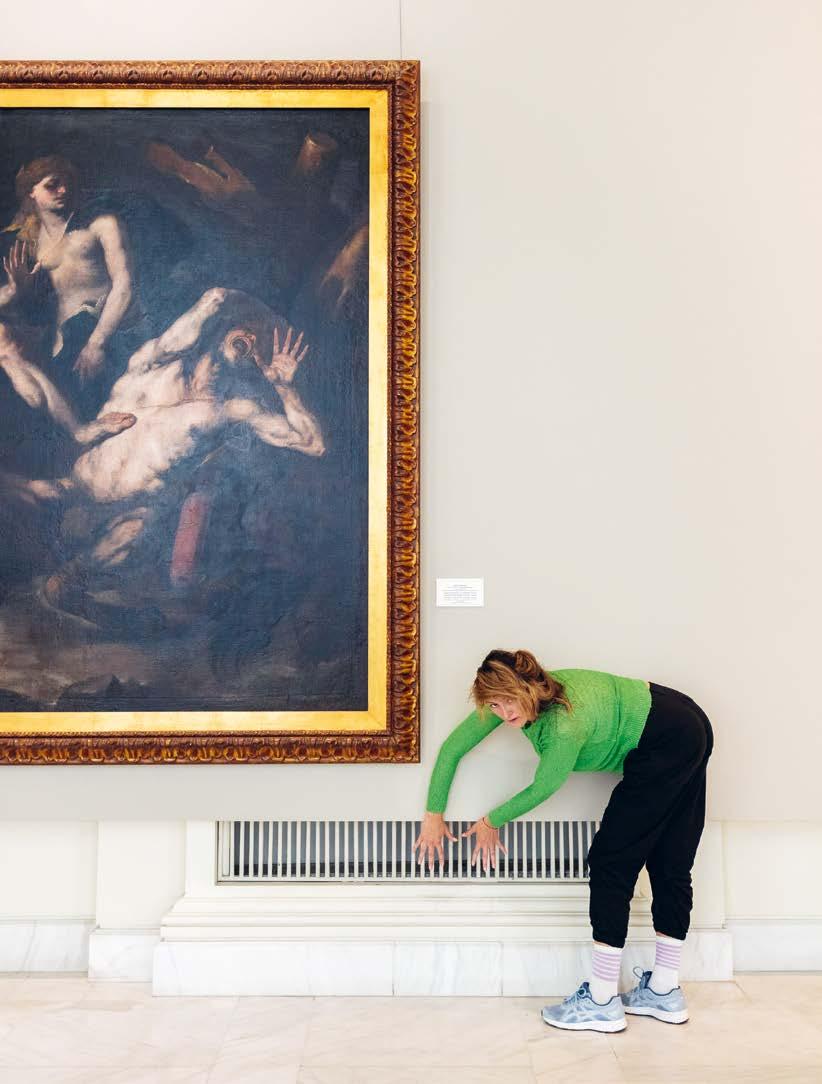
Create Sp aces for Contemp orar y Culture
The fifth edition of the Kyiv Biennial went international, taking place in Kyiv, Ivano-Frankivsk, Uzhhorod, Berlin and Warsaw, with Vienna as the main exhibition venue. It was much admired and highly praised.
»Exhibition of the Year«

With Russia’s brutal attack on Ukraine, staging a comprehensive biennial project in Kyiv long seemed highly uncertain, if not unthinkable. Yet in the end, the 2023 Kyiv Biennial did take place, kicking off in Kyiv and Vienna in October 2023, followed by a series of openings that ended in Berlin in early 2024. Conceived as a European event, the biennial was realised in partnership with leading European institutions in the field of contemporary art, featuring exhibitions, discussions and public programmes in a number of cities across Ukraine and the EU. Rather than abandoning the project and thus submitting to the logic of war, which attacks everything that is civil, the Kyiv Biennial drew upon its founding idea of being a multi-centric initiative in a European, interconnected form based on solidarity. Art institutions in Ukraine – in Kyiv, Ivano-Frankivsk und Uzhhorod – showcased presentations and events in their endangered yet working infrastructures. Although planning was delayed due to the war, museums and exhibition halls in European cities such as Berlin, Warsaw and Antwerp had freed up their spaces and platforms to host exhibitions and events with Ukrainian and international artists and enable discursive, performative and educational activities. Vienna was the main exhibition venue. All the institutions formed a curatorial consortium to jointly create a conceptual framework within which they autonomously developed their respective Kyiv Biennial projects.
80
Kyiv ‘23 Biennial Design – Stefaniia Bodnia & Alyona Ciobanu
Culture
How can a country at war address political, social, cultural and societal issues, and how can it do so by way of an art biennial?
The experience of artists and cultural workers in Ukraine today is profoundly marked by war traumas, displacement, lack of access to basic resources and, in many cases, life under military occupation or direct involvement in armed resistance. All these elements pose existential challenges to both present and future art and cultural production in Ukraine.
Aware of these challenges, the 2023 Kyiv Biennial primarily aimed to reconnect the Ukrainian artist community, divided by the war and displaced across Europe, and to enable its protagonists to team up with international colleagues and reflect on the cultural, social and environmental challenges Ukraine is currently facing. At the same time, they were encouraged to sketch out images and scenarios for an open and emancipatory future within a global context.
ERSTE Foundation has already supported the biennial’s four previous editions. The 2023 Kyiv Biennial, organised in a solidly united European spirit, is not intended to be merely a temporary event but rather the start of a long-running international project lasting over several years, a »Kyiv Perennial«.


Above: SUPERFLEX, There is an Elephant in the Room, 2023. Commissioned by RIBOCA3 & Kyiv Biennial.
Below: wall drawing, collage: Dan Perjovschi, Humanity, Solidarity, Power, 2023. Also shows works by Kateryna Lisovenko and Majd Abdel Hamid.
81
Exhibition views at Augarten Contemporary.
A selection of reviews in international media:

»The Kyiv Biennial, a key fixture of contemporary art in Eastern Europe over the past decade, … has a scholar’s ambition but a slacker’s style; it spans a continent even as it anchors itself in Kyiv. It’s the most energizing exhibition of the year.«
Jason Farago, The New York Times, 4 November 2023
Exhibition view at Augarten Contemporary. In situ installation on the floor: Mountaincutters, CONTROL C RESPIRATION / CTRL C BREATH, 2023. Textile installation on the wall: Mona Vătămanu & Florin Tudor, The Spread of Time, 2020
82
Culture
»A biennial with a geopolitical mission«
Ursula Maria Probst, dérive No. 94, 22 December 2023

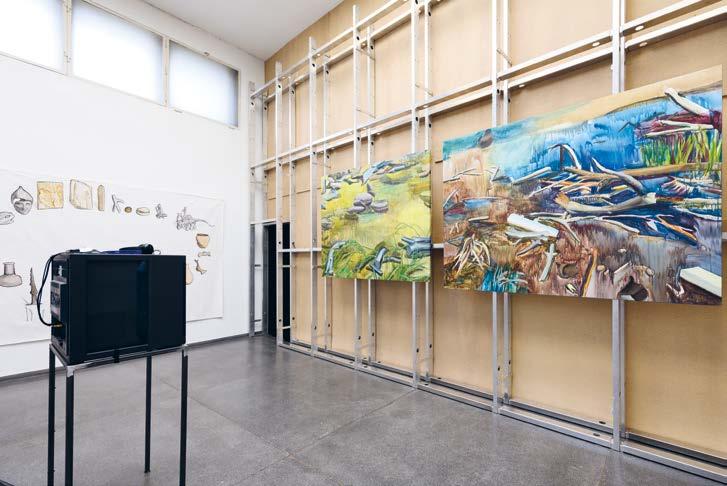
»Saxenhuber and Schöllhammer, together with their Ukrainian colleague Serge Klymko, succeed in creating a clever presentation that combines political topicality with aesthetic diversity.« Matthias Dusini, Falter 43/23, 25 October 2023
Exhibition views at Augarten Contemporary.
Above: Anca Benera & Arnold Estefan, Perpetual Harvest, 2023.
Left: Kateryna Lysovenko, Invitation to Discuss Who Owns the Past, 2023, Kateryna Aliinyk, Neglected Part of the Garden, 2022 and Ukrainian River, 2022; courtesy of Jednostka Gallery.
Below: Friedrich Bungert, from the series Versehrte, 2023
»The exhibition of the year«
Thomas Kirchner, Süddeutsche Zeitung, 1 December 2023

83
»The 2023 Kyiv Biennial is one of the most important and sustainable international art events of 2023.«
Ursula Maria Probst, Kunst forum Vol. 293, 22 December 2023
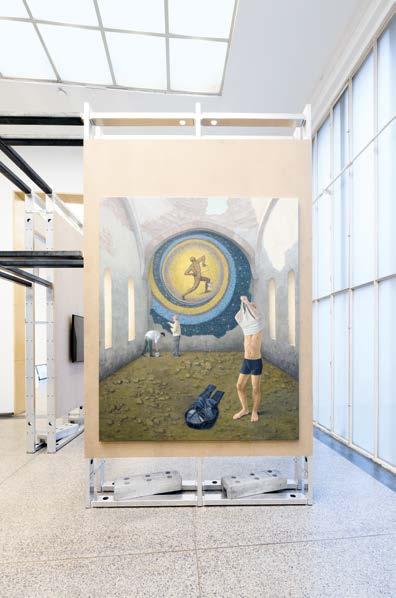
Exhibition views at Augarten Contemporary.
Above: Șerban Savu, The Plowman of the Universe, 2023.
Bottom right: De Ne De, multi-part installation, 2023.
Bottom left: Július Koller, Why? (Anti-Picture), 1969; courtesy of Kontakt Collection

»Art in defiance: the Kyiv Biennial travels to Vienna«
Michael Huber, Kurier, 18 October 2023

»The Kyiv Biennial’s cultural offensive« BeauxArts Magazine, 12 October 2023
84
Culture
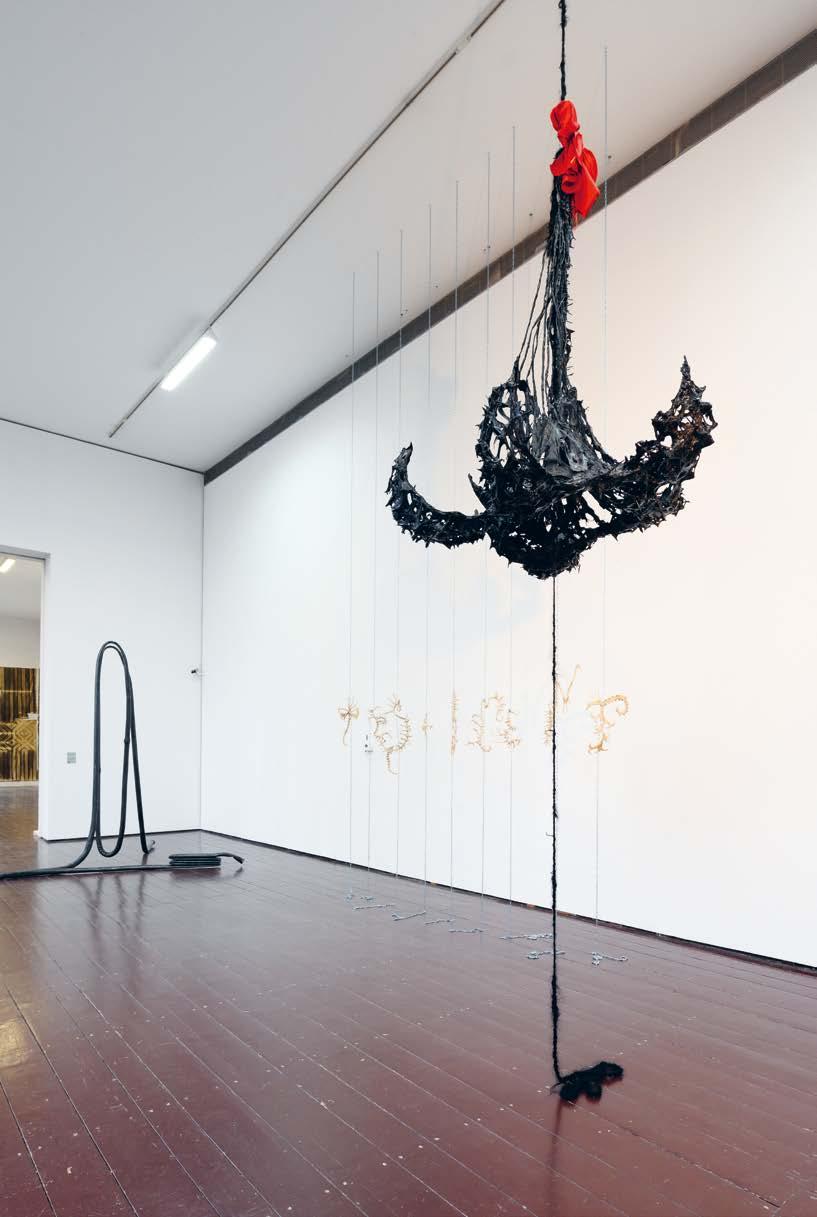
Alina Kleytman, Necessary Luxury or Luxurious Necessity – Nightmare Bell, 2023 and Testament – This Mystery Will Go With Me to the Grave, 2023. Also shows a work by Toni Schmale, schlauch #6 , 2023.
»First and foremost, the Kyiv Biennial is a struggle of resistance.«
Louise Steiwer, Kunstkritik, 24 November 2023
»The war concerns everyone: the Biennial as a European project.«
Katharina Rustler, Der Standard, 18 October 2023
»Along with the Biennial’s temporary spin-offs in Lublin and Antwerp, Vienna became the art capital of Ukraine for a few weeks… The gigantic list of participants gives an idea of the huge effort this involved. It must have taken at least as much effort, however – albeit for different reasons – to manage the Ukrainian part of the Biennial in the midst of war, taking place at as many as three different locations.«
Susanne Altmann, art – Das Kunstmagazin 01/2024, 15 December 2023
85
Exhibition view at Augarten Contemporary.

Above: exhibition view at Never At Home. Abdul Sharif Oluwafemi Baruwa, I am Free, 2023.
Centre: exhibition view at Never At Home. Nikita Kadan, Nicole Six & Paul Petritsch, On Protection of the Monuments, 2023.
Below: exhibition view at Waffen Franz Kapfer. Franz Kapfer, H.K.W. Armorer, 2023
»In an art world that is increasingly silent, censorious, and homogeneous, the urgency of cultural perspectives from locations of war and displacement bring about networks that celebrate tension, discussion, and discomfort, works that don’t necessarily need to agree in order to form a network of solidarity.«
Angels Miralda, BLOK, 12 December 2023
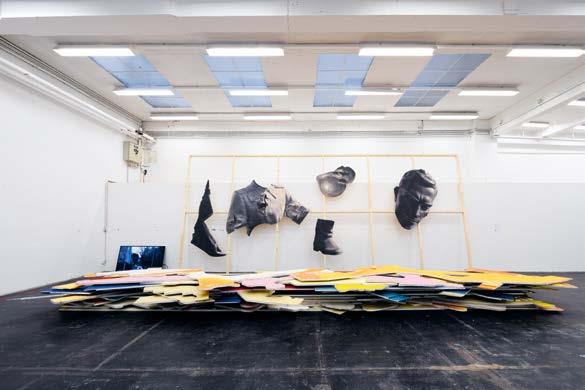

86
Culture

exhibition view at Neuer Kunstverein Wien. Yves Netzhammer, Das Kind der Säge ist das Brett , 2015.
Bottom right: exhibition view at hoast: Anna Zilahi, Missa Echologica , 2021.
Bottom left: exhibition view at Never At Home. Anton Shebetko, We Were Here , 2018
The 2023 Kyiv Biennial was conceived and organised by the Visual Culture Research Center Kyiv in collaboration with tranzit.at (Vienna), tranzit.org (Bratislava, Budapest, Bucharest, Cluj, Iaşi, Prague and Vienna), the Warsaw Museum of Modern Art, the Museum Crisis Center (Lviv), Other Edges, Dovzhenko Centre (Kyiv), Asortymentna Kimnata (Ivano-Frankivsk) and Sorry, No Rooms Available (Uzhhorod), acting as a curatorial consortium. Along with Ukrainian and Viennese cultural institutions, participants included Neue Gesellschaft für Bildende Kunst (Berlin), Station urbaner Kulturen (Berlin), Between Bridges and Prater Galerie (Berlin), Museum of Modern Art (Warsaw), Galeria Labirynt (Lublin) and MHKA (Antwerp).
Venues in Vienna: Augarten Contemporary (main exhibition), hoast, IG Architektur, Laurenz, Neuer Kunstverein Wien, Never At Home, Ve.Sch, Waffen Franz Kapfer.
The tranzit network used the ERSTE Foundation grant, initially earmarked for its 20th anniversary celebration, as a solidarity contribution to fund the Kyiv Biennial’s main exhibition in Vienna.
For more information see:



87
Above:
All exhibition views of the Kyiv Biennial in Vienna.
Photo – Joanna Pianka / esel.at
OMNIA COMMUNIA DESERTA

Above and on the following pages: Foyer of the Sala Omnia in Bucharest, now the National Center for Dance, with works from »Collective Exhibition for a Single Body – The Private Score – Bucharest 2023«.
Photos – Serioja Bocsok
In a video by Mona Vătămanu & Florin Tudor, the philosopher and cultural critic Ovidiu Tichindeleanu guides the viewer through the Sala Omnia in Bucharest, walking from room to room. In his lecture, he mentions the former function of the Sala Omnia and the symbolic value of individual architectural features. He explains the psychology behind the architectural structure, including staircases, corridors, choice of decor and materials, and thereby shows us the choreography of power exertion under Nicolae Ceauşescu’s dictatorial regime. The film investigates and analyses the theme of efficient modernity whose last consequence will be extinction. Ovidiu Tichindeleanu’s speech has as background and motif the post-apocalyptic present of the Sala Omnia, which thus acquires the meaning of a warning: we are again at the end of a road, that of the cult of production. We thank Mona Vătămanu, Florin Tudor and Ovidiu Tichindeleanu for allowing us to publish excerpts from the lecture in the video and to place it alongside the report
on »Collective Exhibition for a Single Body – The Private Score – Bucharest 2023«, which also took place in the Sala Omnia in 2023.
Watch a trailer of the film here: Omnia Communia Deserta, film, 29’, 2020

88
Culture
We have arrived at a place which both represents and embodies the point of utter degeneration of the communist project in Romania. I’m not following only Ceauşescu’s footsteps, however, but also the traces of our wider contemporary history – of the entire world.
Sala Omnia [The Omnia Hall] is a ruin – a ruin of the socialist civilization. At the same time, it is a ruin of efficient modernity, a modernity seemingly able to extract and harness resources from anything. We are living in times when the dissipation of the emancipatory horizons of modernity is apparent, when we know our ill-fated destination but are still heading anyway blindly towards the realisation that the ultimate consequence of our way of life is extinction.
(…) The building, caught as it was in a closed system of power, an ouroboros that eats itself, also carries elements from entirely different horizons or historical times, with signs of a life lasting millions of years. In fact, the entire building flips over the vertical axis into a horizontal axis. The walls with windows become ceilings and roofs. Such a revolutionary move could only originate from a certain familiarity with the real power of overturning relations of power that seemed immutable. By overturning the axis, the foundation and the fundaments are revealed; they are made visible and become the entrance gates, which thus establish the connection with other pasts, with communal pasts linked to the soil. The wooden radicles of the sculpture that delimits the two main areas of the ground-floor foyer are set in open soil. The soil reappears also on the first floor, in the planters framing the entrance into the main hall. And the elements of the sculpture are moveable, they are dancing. The foundations are dynamic; they connect to a dynamic past, one that could still be changed.
(…) By overthrowing the axis, the roots are brought to light. Thus, the entire building becomes a sort of metaphysical wheel turning and running through history, indifferent to the utopias clinging momentarily to it. The futurism of the Sala Omnia tells us that the desired organic future could only be a future that does not detach from the soil, from roots. The building’s name itself comes from omnia sunt communia , a saying used by Thomas Muntzer during the peasant wars, meaning »all are in common«, or »everything belongs in common«. During state socialism – which did not manage to become completely detached from the life of the oppressed that it was supposed to uphold – omnia sunt communia was an official truth, a self-understood and already realised truism. Like the name of this building.
The Sala Omnia is conceived like a honeycomb – a favourite metaphor of communists generally, and of the Party in particular.
However, in its socialist reality, the Sala Omnia represents the insinuation of a philosophy of power within state socialism. Ceauşescu had his own private place here. The lectern was set obliquely on one side of the stage, opening a perspective over both the public and the stage. The Sala Omnia was not made for the general public, for the people: its public was the party cadres. Thus, the party cadres are replacing the people as subject of the revolution, and as political subject.
(…) The Sala Omnia is conceived like a honeycomb – a favourite metaphor of communists generally, and of the Party in particular. In order to turn this contradictory idea into reality – a roof full of holes – complex industrial scaffolding was installed under the roof. Its horizontal windows and horizontal doors let the light enter the main hall through the cells of
89
Omnia Communia Deserta, Film, 29’, 2020

90 Culture
the honeycomb. The same geometrical structure was reproduced in the ground-floor foyer – with horizontal windows, watching from above the people entering the building. Actually, the entire main hall is a surveillance apparatus: invisible windows were installed all around the main hall, above the public, while the seat armrests were set up with audio equipment. Thus, the room is neither Bentham’s prison nor Tiwanaku’s sun gate, but rather a replica of the Versailles court. The latter’s opulence was built on the backs of the slaves from Haiti but was also an optical device for the surveillance of the court, for the convenience of the absolute monarch.
(…) In order to make the honeycomb, to represent the metaphor, an entire industry is necessary. The handymen who manipulated the windows and opened or closed the shutters, depending on the weather outside, in order to tame the natural light, and to bring it through the hexagonal cells of the honeycomb all the way into the Sala Omnia – the handymen remain invisible. They are no Icarus, they do not want to jump anywhere and are not building any wings. But they are the handymen of natural light, which is mediated by an industry towards the phantasm of the »golden future«.
And all this industry – what is it that it worked for? What is it that it works for? The materials and the elements on the ground floor, from the sculpture and the floor, which were used to delineate the different positions of protocol and the different degrees of power, – are already showing the itinerary of millions of years of life and geological processes moulding this matter, which was then transformed into construction material, into raw material.
We are at the end of a double disaster: the disaster of different historical periods and utopian attempts to emancipate mankind. We have arrived at a point beyond the honeycomb represented in the Sala Omnia – the moment when there are no more bees. Only the workers who try to maintain the utopian dream and maybe Icarus’s flight remain.
The structures maintaining utopian dreams are built by spending resources accumulated in millions of years. We probably know already how we will die in the next 40–80 years, if the temperature rises by three to four degrees; we likely know already who will die, which areas and regions will be the first victims. The fact that we know does not seem to matter very much.
(…) Until the possibilities of the next great transformation become visible, by overthrowing certain axes of modernity, the world appears to be one in which the commons are wasted. When what is in common is left defenceless, we are left just with the futility of waste in common: omnia communia deserta.
Ovidiu Tichindeleanu
91

92 Culture

Collective Exhibition for a Single Body – The Private Score – Bucharest 2023 In 2023, »Collective Exhibition for a Single Body« travelled to Bucharest. It was the fourth activation of this exhibition and performance project that Pierre Bal-Blanc realised for the first time in 2017 as part of documenta 14 in Athens and Kassel. The Kontakt Collection subsequently initiated a second version of this project entitled »Collective Exhibition for a Single Body – The Private Score – Bucharest 2023«. Since 2019, this version has been realised multiple times with project partners in Vienna (Austria), Leuven (Belgium), Paris (France) and Lisbon (Portugal). As with its previous iterations, the Bucharest activation focused on artistic gestures that arose in Eastern Europe during the 1960s and ’70s and resurface in various works held by the Kontakt Collection. These works included pieces by key figures of the Romanian neoavant-garde. Works by artists of the 1989 generation who reinvoked the emancipatory potential of their predecessors were likewise featured.
In Bucharest, the artworks’ activation took place in the European Wing of The National Museum of Art of Romania. This venue offers the perfect environment in which to put the Eastern European neoavant-garde in contact with Western European schools of painting from Italy, Spain, Germany, Austria and France.
To extend this dialogue between the cultural legacies of the former West and former East, an exhibition of artworks from the Kontakt Collection and other lenders was shown concurrently at the Sala Omnia. These works represented the starting point for the gestures that were performed at the National Museum of Art of Romania (see the picture series in this annual report on pages 14, 30, 40, 54, 78, and 94).
The Sala Omnia (Omnia Hall) was part of the former headquarters of the Central Committee of the Communist Party that then became the Romanian Senate’s post1989 home and is now to become the principal venue of the National Centre for Dance Bucharest.
Collective Exhibition for a Single Body – The Private Score – Bucharest 2023 13 Sept 2023 – 1 Oct 2023
Venues:
Sala Omnia, The National Center for Dance Bucharest
The National Museum of Art of Romania
Curated by Pierre Bal-Blanc
Choreographed by Manuel Pelmuş
Initiated and commissioned by the Kontakt Collection and co-produced by The National Center for Dance Bucharest and The National Museum of Art of Romania
With works by Milan Adamčiak, Brynjar Åbel Bandlien, Geta Brătescu, Anna Daučíková, VALIE EXPORT, Stano Filko, Tomislav Gotovac, Ion Grigorescu, Sanja Iveković, Anna Jermolaewa, Július Koller, Jiří Kovanda, Katalin Ladik, Simon Leung, Karel Miler, Paul Neagu, Manuel Pelmuş, Petr Štembera, Mladen Stilinović, Sven Stilinović, Slaven Tolj, Goran Trbuljak
Performances by Jack Hauser, Maria Mora, Nanci/Cristian Nanulescu, Adriano Vicente
Photographies by Serioja Bocsok
93

ERSTE Foundation Network
January
Eugen Arlov and Serge Klymko are artists in residence

The artist-in-residence programme at Vienna’s MuseumsQuartier (MQ AiR), a collaborative project of ERSTE Foundation and tranzit, aims to support contemporary art and strengthen the fragile situation of cultural workers, particularly in Central, Eastern and South-Eastern Europe. Since January, the programme has also been open to artists from Ukraine. The first residents are Eugen Arlov from Kyiv, a performer, sound artist and new media artist, and the curator and author Serge Klymko, who co-curated the 2023 Kyiv Biennial (see p. 80).
Valbona Zeneli receives Inspiration Award Europe’s Futures fellow Valbona Zeneli received the prestigious Inspiration Award at a gala event in London on 20 January 2023. The Inspiration Awards are designed to recognise the achievements of women who have made a significant impact in their respective fields and serve as role models for the next generation of women. The German-Albanian scholar Zeneli was a Europe’s Futures fellow in 2022/2023 and focuses her research on Chinese influence in the Balkans.
What Happened in 2023 in ERSTE Foundation’s Network?
February
Zweite Sparkasse and Schuldnerberatung Wien in Skopje

From left to right: Harald Fugger, Gudrun Steinmann, Ludwig Pfefferkorn and Günter Benischek.
– Zweite Sparkasse
Ludwig Pfefferkorn and Gudrun Steinmann from the Vienna Debt Counselling Service (Schuldnerberatung Wien) and Günter Benischek, chairman of the management board of Zweite Sparkasse, visited Skopje in North Macedonia from 31 January to 3 February at the invitation of the Ministry of Social Affairs. Opened by the Austrian ambassador, the event aimed to enable professional exchange with various social institutions. Schuldnerberatung Wien presented its services: debt counselling, financial education and managed accounts. North Macedonia’s biggest problems are the result of very low incomes, easy access to loans, and gambling debts. Moreover, many people are unable to read and write adequately. A pilot project of Betreutes Konto (managed account) in cooperation with local branches of Steiermärki sche Sparkasse is currently being planned in North Macedonia.
Academic publication by Niccolò Milanese (and Luke Cooper)
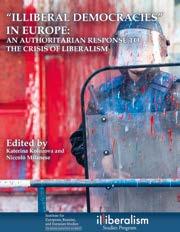
Niccolò Milanese, Europe’s Futures fellow 2019/2020, is co-editor of the academic volume Illiberal Democracies in Europe: An Authoritarian Response to the Crisis of Illiberalism, published by George Washington University (Washington D.C.). The volume summarises various research and project initiatives, including a case study on Hungarian authoritarianism by Luke Cooper, Europe’s Futures fellow 2018/2019.
The publication can be downloaded here:

March
Nathalie Tocci joins School of Transnational Governance Nathalie Tocci, Europe’s Futures fellow 2022/2023 (see p. 75 and her essay in this report on p. 66), joined the School of Transnational Governance of the European Union Institute, the leading institute for political governance in Europe, as adjunct professor focusing on peace and security. »At a time when war has returned to the European continent, shredding what was left of the European security order, I look forward to contributing to the School of Transnational Governance by adding greater focus on the EU’s role in peace and security in Europe, its neighbourhood and beyond,« said Tocci.
Erzen Shkololli appointed curator-at-large at Cukrarna

Erzen Shkololli, artist and curator of contemporary art, is the new curator-at-large at Ljubljana’s Cukrarna Gallery. Thus far, Shkololli has successfully managed several art institutions, including Albania’s National Gallery of Art (20182022) and the National Art Gallery in Kosovo (2011-2015), which were reorganised under his leadership to become central elements of their countries’ dynamic cultural scenes. He commissioned Kosovo’s first exhibition for the 55th Venice Biennale of Art in 2013, co-founded the EXIT Contemporary Art Institute in Peja in
96
Photo – Eugen Arlov
Photo
Photo – Atdhe Mulla
Network
the same year and was artistic adviser for documenta 14. Shkololli’s artworks have been exhibited in renowned museums such as the Stedelijk Museum in Amsterdam, Centre Pompidou in Paris, Tate Modern in London and MUMOK in Vienna.
Anna Sorokovaya is artist in residence at Vienna’s MuseumsQuartier
Anna Sorokovaya is a visual artist, curator and art practitioner from Ukraine. In March and April she moved into the artist-in-residence studio at Vienna’s MuseumsQuartier (MQ AiR). Anna is interested in interdisciplinary projects related to forced landscape transformations, the impact of political and economic factors on the urban and natural environment, public and private spaces.
Navalny wins the Oscar for best documentary film
The film Navalny (2022), co-starring Bulgarian investigative journalist Christo Grozev, co-founder of the Civitatesfunded research platform Bellingcat, won the Oscar for Best Documentary Feature Film at the 95th Academy Awards in Los Angeles on 12 March. Christo Grozev joined director Daniel Roher and the Navalny family on stage during the award ceremony at the Dolby Theatre. Navalny recapitulates the assassination attempt with a lethal nerve agent on opposition figure Alexei Navalny in August 2020 and the investigation by the international Bellingcat research team in collaboration with Navalny himself. Grozev was forced to leave Vienna, where he had lived for many years, in spring 2023 because Austria failed to ensure adequate protection.
Kathrin Rhomberg appointed to documenta 16 Finding Committee
On 30 March, the Kassel documenta supervisory board followed the proposal of former documenta artistic directors for the appointment of the d16 2027 Finding Committee. Catherine David (documenta 10, 1997), Roger M. Buergel (documenta 12, 2007), Carolyn Christov-Bakargiev (documenta 13, 2012) and Adam Szymczyk (documenta 14, 2017) proposed, among others, Kathrin Rhomberg, artistic director of the Kontakt Collection, to join the selection committee. Further members were Bracha Lichtenberg Ettinger, Gong Yan, Ranjit Hoskoté, Simon Njami and María Inés Rodríguez. In November, however, the committee resigned in stages. First, Israeli artist Bracha Lichtenberg Ettinger asked to slow down the selection process in view of the Middle East conflict and then left the committee. Then the Indian poet, curator and critic Ranjit Hoskoté resigned from the committee following criticism of his signing of an appeal by the BDS (Boycott, Divestment and Sanctions) movement in 2019. Finally, the remaining members of the committee also stepped down from the panel on the grounds that, in the current circumstances in Germany, there is no room for an open exchange of ideas and the development of complex and nuanced artistic approaches that documenta artists and curators deserve. Acceptable conditions could not be created in the short term and it would be disrespectful to the legacy of documenta to simply remain content with the current situation.

April
Inner Landscapes at ERSTE Foundation’s window gallery
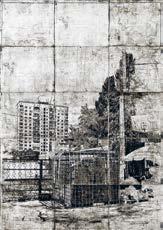
Taras Kovach, Vinogradar, etching, 2013
Balász Jarábik, Europe’s Futures fellow 2022/2023 (see p. 75), received an award from the Slovakian foreign minister. Rastislav Káčer commended him on Twitter (now: X) saying: »I appreciate the hard work and fruitful activities of analyst Balász Jarábik and his many years of expertise in Central and Eastern Europe, with particular focus on Ukraine. I’m pleased to award him the Silver Medal of the Minister of Foreign Affairs of the Slovak Republic for his contribution to our foreign policy.«
Entitled Inner Landscapes, an exhibition at ERSTE Foundation’s window gallery showcased works of Ukrainian artists who work with a range of media and formats and live in different places. The exhibits are the result of the artists’ exploration of liminal spaces and the uncertain existential situation of many Ukrainians. The exhibition, which was on display until 27 April, was curated by Office Ukraine.
97
Balász Jarábik receives award from Slovakian foreign minister
Photo – Rastislav Káčer »X« Account
Concordia Prize for Human Rights goes to andererseits
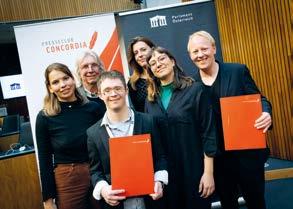
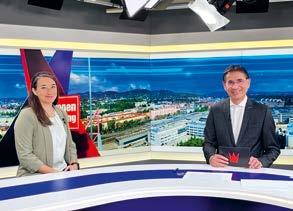
From left to right: Clara Porák (managing director, andererseits), Gerhard Haderer (caricaturist), Fabian Füreder (editor, andererseits), Lisa Kreutzer (editor-in-chief, andererseits), Katharina Brunner (editor, andererseits), Florian Skrabal (editor-in-chief, DOSSIER).
Photo – parliamentary administration/Ulrike Wieser
On Press Freedom Day, 3 May, the Concordia Prizes were awarded in the Austrian parliament. The award in the Human Rights category went to the andererseits team. The inclusive media project, where journalists with and without disabilities work together equitably, was founded in 2020. In autumn 2022, andererseits published the highly acclaimed documentary The Donation Problem, for which the team received the award. ERSTE Foundation financed this film. It sheds light on the criticism levelled against the Austrian broadcasting corporation’s fundraising campaign »Licht ins Dunkel« by many experts and people involved.
Nicole Traxler from TwoNext was a guest on Krone TV’s live show Krone nachgefragt on 11 May at 7:30 a.m. She spoke for 20 minutes with host Gerhard Koller about the app for family carers, »Alles Clara«.

June
Europe’s Futures symposium on Cres Europe’s Futures fellows (see p. 73) concluded the 2022/2023 programme at the annual symposium held on the Croatian island of Cres from 22 to 24 June. The symposium marked the culmination of the annual research cycle, during which the eight fellows presented their results and findings. Over 30 alumni of the Europe’s Futures network also attended the symposium, taking the opportunity to plan future joint activities. For more information on the event’s presentations and discussions go to:

Shapeshifters at window gallery
ERSTE Foundation’s window gallery showcased Shapeshifters, the second exhibition curated by Office Ukraine, from 27 June to 7 September. Shapeshifting has become an unavoidable way of life for many Ukrainian artists due to the constantly changing conditions and hyperreality they face on a daily basis. Shapeshifting in the sense of adaptability offers artists an opportunity to navigate through difficult life circumstances while altering themselves and their artistic practice in the process.
July
Erste Group wins Euromoney Award for social banking Erste Group won the Euromoney Award for being Central and Eastern Europe’s Best Bank for CSR thanks to its social banking and affordable and social housing initiatives. The award was presented in London on 12 July. »This award recognises our long-term efforts to promote prosperity in our region, which stand out from those of our competitors,« says Peter Šurek, CEO of Erste Social Finance Holding. It was the second time Erste Group had received the award after 2018.
exhibition by

Bartuszová, untitled, 1984, courtesy of Kontakt Collection, Vienna
London’s Tate Modern presented a retrospective of Slovakian artist Maria Bartuszová from 2022 to June 2023. The show then moved to the Museum of Modern Art in Salzburg from 21 July 2023, featuring eight loans from the Kontakt Collection. Lending has been a central task of the Kontakt Collection since its foundation in 2004. Around 3,200 artworks from the collection have been on loan to 230 institutions. For Bartuszová (who was born in Prague in 1936 and died in Košice in 1996), the retrospective at the Salzburg Museum of Modern Art is the first exhibition of her work in Austria.
98 May
Photo – Thomas Goiser
»Alles Clara« on Krone TV
Maria
First
Maria Bartuszová in Austria
Network
September
As an artist, she defined abstract sculpture in her own way using innovative methods of plaster casting. From raindrops and eggs to the human body, Bartuszová was inspired by organic forms and cycles in nature. The exhibition was on display until 7 January 2024.
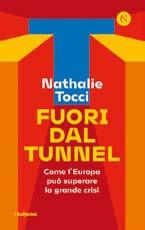
Europe’s Futures fellow 2022/2023, Nathalie Tocci (see p. 75), published her new book in Italy, Fuori dal tunnel Come l’Europa può superare la grande crisi (Out of the tunnel. How Europe can overcome the great crisis), in which she argues that the need to reconcile security and the energy transition is reviving the European Union’s integration process after almost twenty years of stagnation.
Ivan Krastev receives Princess Marina Sturdza Award

Ivan Krastev, permanent fellow of the Institute for Human Sciences, won the Princess Marina Sturdza Award in 2023. It is given to eminent individuals from Central, Eastern and South-Eastern Europe who have contributed to the region’s prosperity, science, culture and peace. The laureate is chosen
by the Emerging Europe Council, whose members are leading opinion formers, senior business executives, scholars and former senior representatives of international organisations, civil society, and the world of diplomacy and art.
Valbona Zeneli joins Atlantic Council
Following her commendable work at the US Department of Defense’s George C. Marshall European Center for Security Studies, Valbona Zeneli, Europe’s Futures fellow 2021/2022, joined the Atlantic Council, a leading US think tank, and its Scowcroft Center for Strategy and Security as senior fellow. She will be working on a range of transatlantic issues, including EU enlargement and the Western Balkans.
October
Karolina Wigura publishes new book
Karolina Wigura, Europe’s Futures fellow 2023/2024, published a new book with Suhrkamp: Posttraumatische Souveränität. Ein Essay. Together with political scientist Jarosław Kuisz, she describes how the Russian-Ukrainian war is reactivating historical traumas today, particularly in Poland, and causing Warsaw to take on a leading role in European defence policy. The book was written in German.
Erste Social Banking Hungary wins Effekt 2030 Award
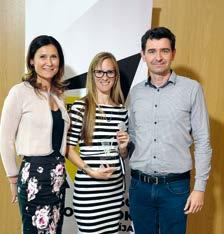
2023 winner of the Effekt 2030 Award in the »Everyone’s Society« category is Erste Bank Hungary’s programme »Professional Volunteering: New Ways«. From left to right: Csaba Bakó (Simpact), Rita Jeges (Erste Social Banking Hungary), Adrien Dudás (Simpact).
Photo – Effektteam
Effektteam, the Hungarian platform for CSR, economic responsibility and social sustainability, presented the Effekt 2030 Awards to companies with the best ESG solutions of the year at its »COMMUNITY. IMPACT.FUTURE« conference on 5 October. In the »Everyone’s Society« category, Erste Bank Hungary was awarded for its »Professional Volunteering: New Ways« project. The bank developed the project as part of the SEEDS (Social Enterprise Establishment and Development Support) programme, which is funded by ERSTE
99
Nathalie Tocci publishes new book
Photo – Markus Schwarze
Foundation to support civil society in Hungary. A joint initiative with the non-for-profit organisations IFUA and Simpact, the aim is to pass on organisational development expertise and skills to NGOs that work with volunteers.
tranzit.ro/Bucharest brings artists to biennial in Yogyakarta
The Jogja Biennale 17 ran in various venues across Yogyakarta, Indonesia, from 6 October to 25 November. As part of the project »Reclaiming Sociality around Land and the Rural«, which is co-financed by the Romanian Cultural Institute, tranzit.ro/Bucharest invited twelve participants and initiatives from Romania, Serbia, Ukraine and Slovakia to the biennial’s main exhibition. Invitees included Anca Benera & Arnold Estefan, Anca Bucur, Dan Vezentan, Eduard Constantin, Ilona Németh, Jelica Jovanović, Nikita Kadan, Ovidiu Țichindeleanu, Raluca Voinea, Raluca Popa and The Experimental Station for Research on Art and Life. Curator Adelina Luft: »Taking the multilayered understanding of decoloniality in Eastern Europe as their starting point, the works address processes of reframing values and practices which have been erased and absorbed by neoliberal forces in the past decades – of sharing, sustaining, repairing or reclaiming the commons and sociality around land, rural space and collective/communal forms of organisation.«
November
Heather Grabbe joins Bruegel

Heather Grabbe, Europe’s Futures fellow 2022/2023 (see p. 74), joined Europe’s leading political economy think tank, Bruegel, as a senior fellow. Her research at Bruegel focuses on the political economy of the European Green Deal and the question of how the climate transition will change the EU’s international relationships and external policies – the same topics that she investigated during her Europe’s Futures fellowship.
Erzen Shkololli appointed curator of Autostrada Biennale in Prizren, Kosovo
The Autostrada Biennale in Prizren, Kosovo, appointed Erzen Shkololli as curator of its 5th edition, which will take place from 5 July to 5 October 2025. The Autostrada Biennale was founded in 2014 with the aim of using contemporary art as a means to empower local communities and foster creativity for a more inclusive and sustainable future. Shkololli, curator-at-large at Cukrarna (see p. 96), is the first curator from Kosovo. As the only contemporary art institution in Prizren, the Autostrada Biennale serves both as an international exhibition of contemporary art, which has taken place every two years since 2017, and the Autostrada Hangar, an education, production and exhibition space in the former German KFOR military base
(now an innovation and training park). This enables the platform to use art production as a sustainable form of learning and exchange that addresses the needs of different communities.
Sonnwendgarten’s »Sunny Honey« gains an award On 10 November, the Wieselburg fair celebrated the »Day of the Golden Honeycomb«, honouring the winners of the honey and honey speciality product awards in a festive setting. As in previous years, the »Sunny Honey« from the Sonnwendgarten community garden was one of the premium products to gain an award.
December
Zsuzsanna Szelenyi’s book on Hungary’s democracy in best list

The book Tainted Democracy. Viktor Orbán and the Subversion Hungary by Zsuzsanna Szelenyi, Europe’s Futures fellow 2018/2019, was recognised by Foreign Affairs as one of the best books of 2023 in its list of top picks traditionally published in December.

Numerous irregularities during Serbia’s early elections in December triggered street protests by angry citizens. Srđjan Cvijić, Europe's Futures fellow 2020/2021, played a prominent role in the public eye as he lobbied for the integrity and fairness of the electoral process before and after the election. This culminated in a much-noticed speech he gave in front of tens of thousands of people at a protest in Belgrade on 30 December.
100
Srđjan Cvijić advocates fair elections in Serbia
Network
Photo – IWM
AmpliFY founded in Bucharest
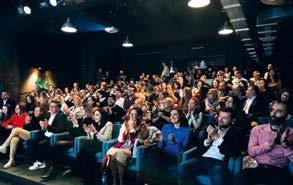
The NGO AmpliFY is the latest initiative to enhance the social impact of Romanian NGOs, developed by BCR Social Finance and supported by ERSTE Foundation and Romania’s BCR. More than 150 experienced social innovators, entrepreneurs and NGO founders met in Bucharest for the kick-off event on 7 December and became the first members of the AmpliFY community. Among them was Ana-Maria Crețu, Social Impact Investment Lead at ERSTE Foundation, who highlighted the importance of this initiative: »AmpliFY is a co-creation space that brings together technology, access to resources, matchmaking and new opportunities.« Ștefan Buciuc, CEO of BCR Social Finance, stated: »Impact is created step by step, starting from a culture, from being in the right place, in the right community. With AmpliFY, we want to bring about real, long-term change.« The number of the organisation’s members is expected to increase to 400 in 2024.
Ivana Dragičević publishes new book: Nesigurni

Ivana Dragičević, Europe’s Futures fellow 2022/2023, published her new book Nesigurni (Insecure) in 2023 with the publishing house Naklada Ljevak. It is based on her debut novel Nejednaki (Unequal) and looks in particular at how the pandemic has changed the world as we know it. Ivana Dragičević’s work, which she calls a »selfhelp manual« for humanity and humanism, is a collection of very personal stories that explore topics ranging from the green and digital economy, climate change, wars and migration to earthquakes, floods and other natural disasters. The book presentation at Zagreb’s Lauba House for People and Art on 19 December was also attended by the President of the Republic of Croatia, Zoran Milanović.
101
Photo – Office of the President of the Republic of Croatia / Dario Andrišek
Photo – BCR
Delve into the heart of contemporary European issues, as our Talk Europe! video series offers insightful interviews with prominent thinkers and doers from our community on topics ranging from Catalonia to Ukraine, politics to art. In the dynamic landscape of 2023, Talk Europe! tackled pressing issues such as the climate crisis and sustainable living, accountability and justice, and how populists found ways to entrench their power. In this year’s edition, Jovana Trifunovic´ also explored cultural themes, including feminism in former Yugoslavia, the role of art during state socialism, and the evolution of post-socialist culture after 1989.
102
Talk Europe! with Šejla Kamerić
Bosnian artist Šejla Kamerić talked about art, living through the war in the besieged city of Sarajevo, the various aspects of being homesick, women labour and the therapeutic effect of crocheting.
»It is good to constantly fight this idea or definition of what something needs to be, because this is imposed. Because art is not only everything that we can imagine it could be, it’s bigger than that.«

Here is the video:

103 Art encircles life
Justice cannot wait
Talk Europe! with Oleksandra Matviichuk
Nobel Peace Prize winner Oleksandra Matviichuk talked about accountability, the urgency of justice, defending the values of modern civilization and what it means to win the most prestigious award in the world.
»We live in a new century. We can’t wait. Justice must be independent of the magnitude of Putin’s regime’s power. We have to create a special tribunal now and hold Putin, Lukashenko and other war criminals accountable.«
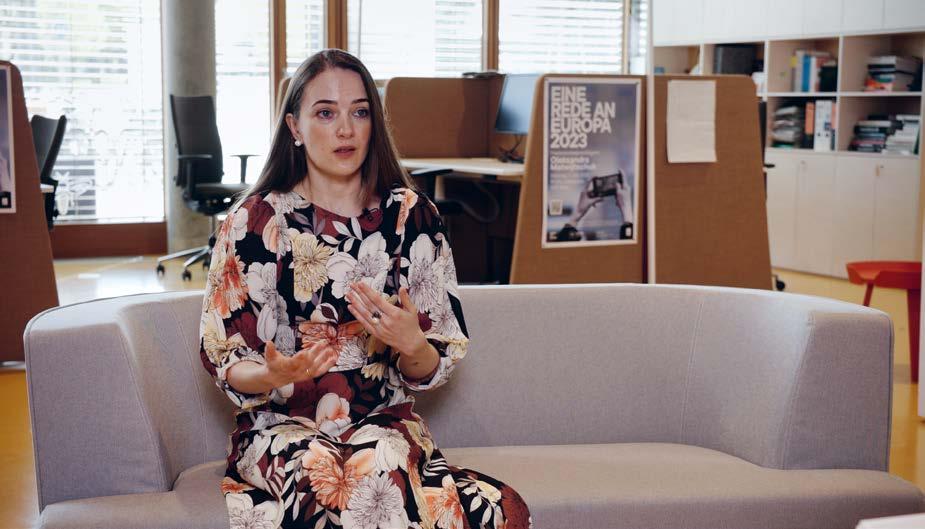
Here is the video:

104
Time
Talk Europe! with Kirsten Dunlop
Kirsten Dunlop, CEO at EIT
Climate – KIC, Europe’s largest public-private partnership focused on climate innovation, believes that we need to counteract the current narrative which suggests that living sustainably means giving up living well. Creating aspirational narratives might help bring about a mentality transformation and inspire people to act.
»Can we depict a future and an economy in which living sustainably is equivalent to living well? We need to learn to consume less energy, fewer materials, and fewer resources.«
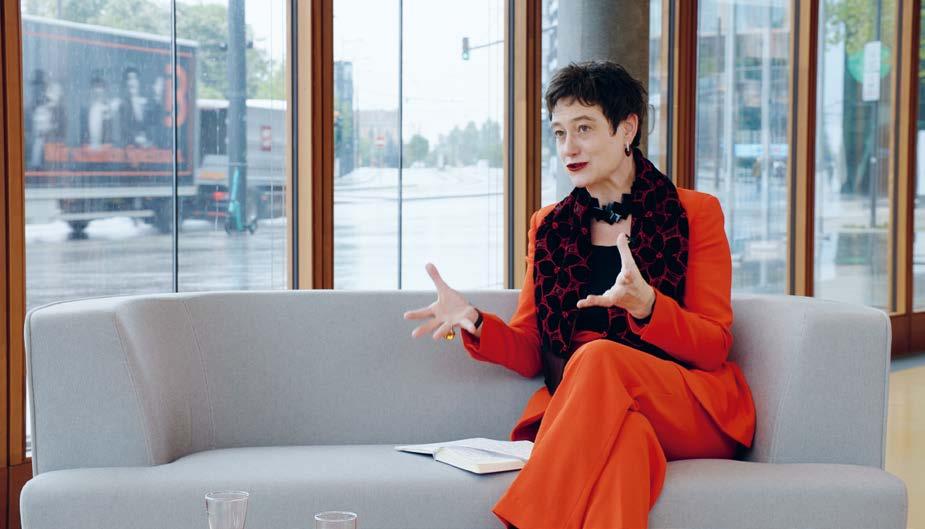

105
to rethink growth
Here is the video:
It’s elites who turn against democracy, not the people.
Talk Europe! with Jan-Werner Müller
Jan-Werner Müller on why it’s wrong to call Victor Orbán an illiberal democrat, how populists found ways to entrench their power, and why Putin’s Russia isn’t really an attractive ideological model for the Salvinis and Le Pens of Europe.
»Populations are not turning against democracy.
If you look at the cases where democracies have declined or are in the process of being abolished, the crucial factor has not been the people. The crucial factor has been the elites.«
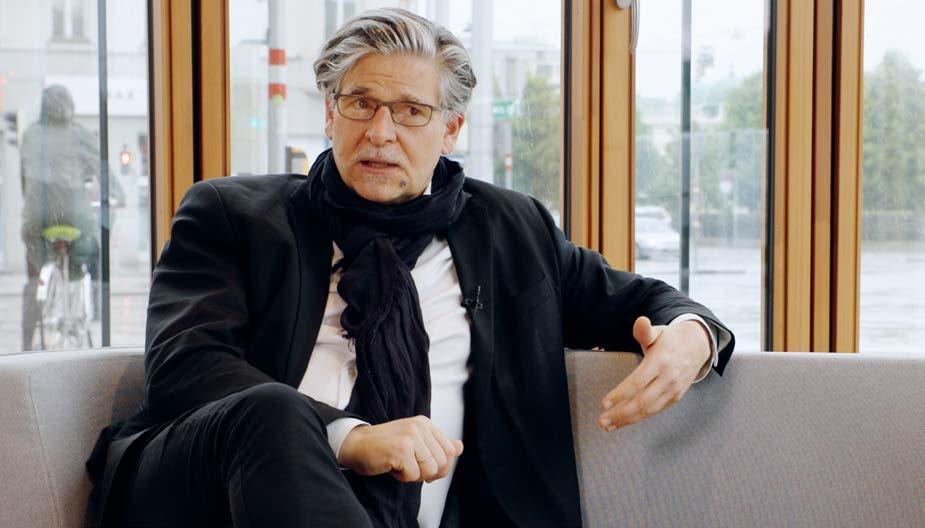
Here is the video:

106
Proletarians of all countries, who washes your socks?
Talk Europe! with Bojana Pejić
Bojana Pejić, art historian and winner of the Igor Zabel Award for Culture and Theory 2022, reflected on her lifelong research into the constituent elements of Eastern European art and culture, gender equality in Yugoslavia in the 70s, the moment she became a conscious feminist and some of her complex international
»There is no rule. And there is not one avenue how we arrive at the artwork. There are many. And I have chosen the feminist one.«

exhibitions, which critically marked our understanding of art during state socialism and post-socialist culture after 1989.
Here is the video:

107
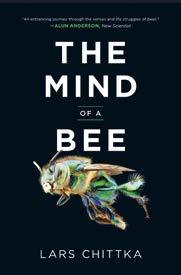
LARS CHITTKA
The Mind of a Bee Princeton, Oxford: Princeton University Press 2023, 334 pages.
In The Mind of a Bee, Lars Chittka draws from decades of research. Starting from the groundbreaking studies of Karl von Frisch (1886–1982), the explorer of the bee dances and their language, to Chittka’s own pioneering work, he argues that bees have remarkable cognitive abilities. He shows that they are profoundly smart, have distinct personalities, can recognise flowers and human faces, exhibit basic emotions, count, use simple tools, solve problems, and learn by observing others. They may even possess consciousness. Taking readers deep into the sensory world of bees, Chittka illustrates how bee brains are unparalleled in the animal kingdom in terms of how much sophisticated material is packed into their tiny nervous systems. A must-read not just for ERSTE Foundation Bees.
A selection of interesting new additions to the ERSTE Foundation Library in 2023, compiled by the head of the library, Jutta Braidt

CORINNE PELLUCHON
Verbessern wir die Welt! Die Sorge für Mensch, Tier und Natur
Translated from French into German by Ulrike Bischoff, Darmstadt: wbg Theiss 2023, 175 pages.
The book’s central message sums it up: »We can only tackle climate change and promote justice for all living beings if we fundamentally rethink and understand that we share the Earth with all humans and animals. Ecology and sustainability, animal rights and respect for people in all their vulnerability are inextricably linked, and each and every one of us can contribute to making our world a better place.« What seems naive and overly optimistic at first glance is nothing less than a radical ethic of enlightenment and appreciation. We wish the book many readers.
 ULRIKE LENTHE
ULRIKE LENTHE
Transkulturelle Pflege. Kulturspezifische Faktoren erkennen – verstehen – integrieren 4th edition, Vienna: facultas 2023, 200 pages. In German.
Carers and people in need of care often come from different countries and cultures, so, naturally, day-to-day care work is also multicultural. Language barriers and ignorance of other cultures can easily lead to misunderstandings that jeopardise the success of the care services provided. Transkulturelle Pflege provides knowledge about culture-specific orientation systems. It shows why foreigners feel, judge or act differently and how carers can see them as individuals in their culturally influenced environment and treat them with respect. With a wealth of background information from cultural studies, religious history, social anthropology, migration research and political science, this book answers questions that no-one interested in intercultural cooperation can ignore today. A must-read for anyone looking for orientation in the nursing and healthcare professions, for nursing and care institutions and for all those who attend to foreign-language clients in their day-to-day care work.
108 108
Library
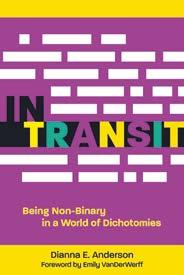 DIANNA
DIANNA
E. ANDERSON
In Transit. Being Non-Binary in a World of Dichotomies
Minneapolis: Broadleaf Books 2022, 178 pages.
For decades, our cultural discourse around trans and gender-diverse people has been viewed through a medical lens, through diagnoses and symptoms set down in books by cisgender doctors, or through a political lens, through dangerous caricatures invented by politicians clinging to power. But those who claim non-binary gender identity deserve their own discourse, born out of the work of the transsexual movement, absorbed into the idea of transgender, and now, finally, emerging as its own category. In tracing the history and theory on non-binary identity, and telling of their own coming out, non-binary writer Dianna E. Anderson answers questions about what being non-binary might mean, but also where non-binary people fit in the trans and queer communities.

STEFFEN MAU, THOMAS LUX UND LINUS WESTHEUSER
Triggerpunkte. Konsens und Konflikt in der Gegenwartsgesellschaft 5th edition, Berlin: Suhrkamp 2023, 532 pages. In German.
What are the trigger points that disrupt an actually existing basic consensus? The gender-neutral language, cargo bikes, or the speed limit on the motorway?
With the concept of trigger points, the authors seek to provide a more detailed understanding of escalatory dynamics, namely those sensitive areas of public discourse to which people react strongly and affectively. These potential causes of agitation are in turn crucial for discussing new (presumed?) societal divisions: in the climate issue, disputes about migration or in debates about gender-neutral language. The authors call this mechanism »affective polarisation«. Even though this study, focusing on Germany, at times appears awkwardly expressed (»arenas of inequality conflicts«), it is well worth reading.

TIM ALEXANDER HERBERGER (ED.)
Digitale Transformation und Nachhaltigkeit in der Finanzwelt. Aktuelle Fragestellungen und Perspektiven im Kontext des finanzwirtschaftlichen Risikomanagements Baden-Baden: Nomos 2023 (= Andrássy studies on European research, Vol. 29), 305 pages. In German.
Digital transformation and sustainability are key topics in research and academic discourse that also apply to the financial sector. Thus far, they have, however, rarely been linked to financial risk management content. This anthology compiled for the 2022 Budapest conference of the same name addresses the opportunities and risks of digital transformation and sustainability with regard to risk management. The broad definitions allow for a variety of perspectives on the topic.
109 109
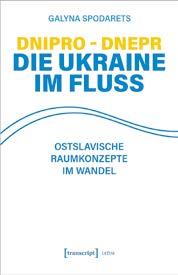
GALYNA SPODARETS
Dnipro – Dnepr. Die Ukraine im Fluss. Ostslavische Raumkonzepte im Wandel Bielefeld: transcript 2023, 405 pages. In German.
Since Russia’s invasion of Ukraine in February 2022, the Dnipro River has been in the focus of world attention. Ukraine’s longest river and the third largest in Europe, it is an important source of water but also a symbol of independent Ukraine. It is also important for Russia and Belarus. Galyna Spodarets takes a fresh look at European rivers and uses the Dnipro as an example to trace their diverse meanings. Drawing on a wide range of sources, she expounds the river as a place of Christian remembrance, of national Ukrainian myths but also as the site of the Chernobyl disaster or as a borderline separating East from West. From an interdisciplinary perspective, she traces the journey of this historical and cultural space from the Middle Ages to the post-Soviet era, allowing us to gain a deeper understanding of the present. The Kakhovka dam blast in June 2023 and the subsequent flooding of large parts of Ukraine are inscribed in the history of the river and the country as the most recent traumatic event.

SERHII PLOKHY
The Russo-Ukrainian War Dublin: Allen Lane 2023, 376 pages.
On 24 February 2022, Russia stunned the world by launching a full-scale invasion of Ukraine. In the midst of checking on the family and friends who were now on the front lines, acclaimed Ukrainian-American historian Serhii Plokhy inevitably found himself attempting to understand the deeper causes of the invasion, analysing its course and contemplating the wider outcomes.
The Russo-Ukrainian War is the comprehensive history of a conflict that has been smouldering since 2014, and that, with Russia's attempt to seize Kyiv, exploded a geo-political order that had been cemented since the end of the Cold War. With an eye for the gripping detail on the ground, both in the halls of power and down in the trenches, as well as a keen sense of the grander sweep of history, Plokhy traces the origins and the evolution of the conflict, from the collapse of the Russian empire to the rise and fall of the USSR and on to the development in Ukraine of a democratic politics.

EMILY PETHICK, KATHRIN RHOMBERG, WHAT, HOW & FOR WHOM/WHW, JILL WINDER (EDS.)
My Sweet Little Lamb (Everything we see could also be otherwise)
Dedicated to Mladen Stilinović. Berlin: Sternberg Press 2023, 456 pages.
My Sweet Little Lamb (Everything we see could also be otherwise), a series of exhibition episodes based on the Kontakt Collection and dedicated to the artist Mladen Stilinović, unfolded in Zagreb and London in 2016–2017. This publication, conceived as a »post-episode« of the project, presents extensive visual documentation of the exhibitions alongside newly commissioned texts by theorists and writers Branislav Dimitrijević, Miguel A. López, Oxana Timofeeva and Marina Vishmidt, as well as a conversation on exhibition making with curators Ekaterina Degot, Ana Janevski, Emily Pethick and Marion von Osten.
Drawing on the legacy of the Eastern European neo-avantgarde and the work of Stilinović in particular, these contributions grapple with urgent questions about the value of art and exhibition making.
110 110
Library
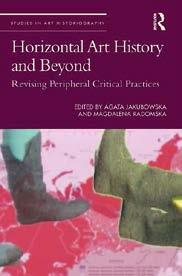
AGATA JAKUBOWSKA, MAGDALENA RADOMSKA
Horizontal Art History and Beyond. Revising Peripheral Critical Practices New York, London: Routledge 2023, 223 pages.
This book is devoted to the concept of horizontal art history. This proposal of a paradigm shift was formulated by the Polish art historian Piotr Piotrowski (1952–2015). It aims at undermining the hegemony of the discourse of art history created in the Western world. The concept of horizontal art history is one of many ideas on how to conduct non-hierarchical art historical analysis that has been developed in different geopolitical locations since at least the 1970s, parallel to the ongoing process of decolonisation. This book is a critical examination of horizontal art history which provokes a discussion on its original concept and possible methods to extend it. This is an edited volume written by international scholars who acknowledge the importance of the concept, share its basic assumptions, and are aware of both its advantages and limitations. The book will be of interest to scholars working in art history, art historiography and postcolonial studies.

SANDRO DROSCHL (ED.)
Stano Filko. A Retrospective
With contributions by Sandro Droschl, Lucia Gregorová Stach, Patrizia Grzonka, Christian Höller, Mira Keratová, Hans Ulrich Obrist, Boris Ondreička and Jan Verwoert Berlin: Hatje Cantz 2023, 256 pages.
An influential figure in Eastern Europe’s 1960s neo-avantgarde, Stano Filko synthesised Dada, Pop Art, Fluxus and Conceptual Art into a universalist vision of art and life. Influenced by subjects such as modernist architecture and mathematical algorithms but also by spiritual transcendence and the cosmos, he designed pneumatic objects and interactive environments, assemblages, text-based works, performances and happenings that attempted to circumvent state repression. Having fled from Czechoslovakia to West Germany in 1981, Filko exhibited at documenta 7 in Kassel in 1982, and then relocated to New York, where he took up Neo-Expressionist painting, embracing a rainbow-coloured chakra system, System SF, which he explored for the rest of his life. Not least thanks to his curiosity, experimental approach and self-criticism, Filko’s works sustain a character of contemporaneity and remain meaningful today.
ERSTE Foundation Library
Head: Jutta Braidt
Opening hours Monday – Thursday 10 a.m. – 5 p.m.
Write to us or book a guided tour of the ERSTE Foundation Library. +43 50100 15461 library@erstestiftung.org
ERSTE Foundation Library
Erste Campus, Bauteil F Am Belvedere 1 1100 Vienna
111 111
113 Financial Statements 2023
ERSTE österreichische Spar-Casse Privatstiftung
DIE
115 1. Foreign assets EUR 2023 TEUR 2022 EUR 2023 2,462,909.85 TEUR 2022 0 Off-balance-sheet items Balance sheet at 31 December 2023 DIE ERSTE österreichische Spar-Casse Privatstiftung 1. Cash in hand, balances with central banks 2. Sovereign debt instruments and bills eligible for refinancing with central banks
treasury bills and similar securities
other bills eligible for refinancing at central banks 3. Loans and advances to credit institutions a) repayable on demand b) other loans and advances 4. Loans and advances to customers 5. Bonds and other fixed-income securities a) issued by public bodies b) issued by other borrowers of which: own bonds 6. Shares and other variable-yield investments 7. Participating interests of which: in credit institutions 8. Shares in affiliated companies of which: in credit institutions 9. Intangible fixed assets 10. Tangible assets of which: land and buildings used by the credit institution for its own activities 11. Own shares and shares in controlling company of which: par value 12. Other assets 13. Subscribed capital called up but not yet paid up 14. Prepayments and accrued income 15. Deferred tax assets TOTAL ASSETS EUR 2023 0.00 0.00 1,274,650.05 14,028,991.67 0.00 152,919.25 0.00 350,910,248.05 0.00 0.00 0.00 TEUR 2022 0 0 18,043 0 0 142 0 338,153 0 0 0 EUR 2023 0.00 0.00 15,303,641.72 325,239.19 152,919.25 0.00 353,220,089.05 352,865,355.78 6,258.00 418,397.00 0.00 4,799,367.32 0.00 55,382.14 0.00 727,146,649.45 ASSETS TEUR 2022 0 0 18,043 318 142 0 341,105 339,552 0 467 0 5,205 0 52 0
a)
b)
704,883
1. Liabilities to credit institutions
a) repayable on demand
b) with agreed maturity dates or periods of notice
2. Amounts owed to customers
a) savings deposits of which:
aa) repayable on demand
bb) with agreed maturity dates or periods of notice
b) other liabilities of which:
aa) repayable on demand
bb) with agreed maturity dates or periods of notice
Securitised liabilities
a) bonds in issue
b) other securitised liabilities
a) provisions for severance payments
b) provisions for pensions
c) provisions for taxes d) other
Tier 2 capital pursuant to Part 2
I Chapter 4 of Regulation (EU) No 575/2013
Additional Tier 1 capital pursuant to Part 2 Title I Chapter 3 of Regulation (EU) No 575/2013 of which: compulsory convertible bonds pursuant to § 26 Banking Act (BWG)
186,819,337.99
116
3.
4. Other
5. Accruals and deferred income 6.
liabilities
Provisions
6a.
general banking risks
Instruments without a vote pursuant to
26a Banking Act (BWG) 9. Subscribed capital less par value of treasury shares 10. Capital reserves a) committed b) uncommitted c) other restricted reserves Carryover EUR 2023 0.00 0.00 0.00 0.00 0.00 0.00 0.00 0.00 102,146,666.70 0.00 0.00 0.00 312,253.00 790,168.00 0.00 0.00 0.00 79,147,249.86 0.00 0.00 TEUR 2022 0 50,280 0 0 0 0 0 0 0 102,147 0 0 312 331 0 0 0 79,147 0 0 EUR 2023 0.00 0.00 102,146,666.70
0.00
0.00 0.00 0.00
TEUR 2022 50,280 0 102,147 4,282 0 644 0 0 0 0 0 79,147 236,499 Balance sheet at 31 December 2023 DIE ERSTE österreichische Spar-Casse Privatstiftung LIABILITIES AND EQUITY Financial Statements
Funds for
7.
Title
8.
8b.
§
4,423,000.43
1,102,421.00
0.00 0.00 79,147,249.86
11. Retained earnings a) statutory reserve
b) reserves provided for by the articles c) other reserves d) other restricted reserves 12. Reserve pursuant to § 57-5 Banking Act (BWG)
Net profit or loss for the year 14. Investment grants a) COVID-19 investment premium
Off-balance-sheet items
1. Contingent liabilities of which:
a) acceptances and endorsements b) guarantees and assets pledged as collateral security
Commitments of which: commitments arising from repurchase agreements
Liabilities arising from fiduciary duties
4. Own funds pursuant to Part 2 of Regulation (EU) No 575/2013 of which: Tier 2 capital pursuant to Part 2 Title I Chapter 4 of Regulation (EU) No 575/2013
5. Own funds requirements pursuant to Art. 92 of Regulation (EU) No 575/2013 of which: capital requirements pursuant to Art. 92-1 of Regulation (EU) No 575/2013 a) Common Equity Tier 1 capital ratio b) Tier 1 capital ratio c) total capital ratio
Foreign liabilities
117
Carryover
13.
EUR 2023 145,228,257.23 0.00 395,099,054.23 0.00 0.00 TEUR 2022 145,228 0 323,156 0 0 EUR 2023 186,819,337.99 540,327,311.46 0.00 0.00 0.00 727,146,649.45 TEUR 2022 236,499 468,384 0 0 0 704,883 LIABILITIES AND EQUITY
TOTAL LIABILITIES AND EQUITY
3.
2.
EUR 2023 0.00 600,000.00 0.00 0.00 0.00 0.00 0.00 TEUR 2022 0 0 0 0 0.00 0.00 0.00 EUR 2023 600,000.00 0.00 0.00 0.00 0.00 3,647,333.44 TEUR 2022 0 0 0 0 0 0
6.
Income from securities and participating interests
a) income from shares, other ownership interests, and variable-yield investments
b) income from participating interests
c) income from shares in affiliated companies
8. General administrative expenses
a) staff costs of which:
aa) wages and salaries
bb) expenses for statutory social security contributions and compulsory contributions related to wages and salaries
cc) Other social security charges
dd) expenses for pensions and assistance
ee) reversal/allocation of pension provision
ff) expenses for severance payments and contributions to severance and retirement funds
b) other administrative expenses
118 1. Interest income and similar items of which: from fixed-income securities 2. Interest expenses and similar items I. NET INTEREST INCOME 3.
4. Commission income 5. Commission expenses 6. Net loss on financial operations 7. Other operating income II. OPERATING INCOME
9. Value adjustments
of asset items 9
10 less: Income from the reversal of investment grants 10. Other operating expenses III. OPERATING EXPENSES IV. OPERATING RESULT EUR 2023 300.00 0.00 45,214,216.40 49,400,000.00 3,174,331.72 2,464,683.69 549,038.73 39,463.12 87,773.86 0.00 33,372.32 4,591,365.60 TEUR 2022 3 0 40,259 60,760 2,021 1,545 368 19 67 0 22 4,028 EUR 2023 548,835.45 4,103,642.36 –
33,296.03 – 134.79 116,737.94 91,142,718.00
73,294.81 0.00 0.00 7,838,992.13 83,303,725.87 TEUR 2022 158 3,598 – 3,440 101,019 0 213 0 265 97,632 6,049 75 0 0
Income statement for the year 2023 DIE ERSTE österreichische Spar-Casse Privatstiftung Financial Statements
in respect
and
3,554,806.91 94,614,216.40 1.39
7,765,697.32
6,124 91,508
and allocations for provisions for contingent liabilities, commitments and securities held as current financial assets as well as value re-adjustments to loans and advances and provisions for contingent liabilities, commitments and securities held as current financial assets
Carryover
/ 12.
13. Balance of value adjustments to transferable securities / 14. held as fixed financial assets, participating interests and shares in affiliated companies as well as
re-adjustments to transferable securities held as fixed financial assets V. PROFIT OR LOSS ON ORDINARY ACTIVITIES 15. Extraordinary income of which: withdrawals from the special fund for general banking risks 16. Extraordinary expenditures of which: allocation to the special fund for general banking risks 17. Extraordinary result (subtotals from items 15 and 16) 18. Tax on profit or loss of which: income related to deferred taxes 19. Other taxes not reported in item 18 19a. Profit or loss from demergers VI. PROFIT FOR THE YEAR AFTER TAX 20. Changes in reserves of which: allocation to reserves reversal of reserves VII. PROFIT FOR THE YEAR AFTER DISTRIBUTION OF CAPITAL 21. Profit brought forward from previous year 22. Profits transferred on the basis of profit transfer agreement VIII. PROFIT OR LOSS FOR THE YEAR EUR 2023 0.00 0.00 – 7.84 0.00 0.00 TEUR 2022 0 0 0 0 0 EUR 2023 83,303,725.87 0.00 0.00 2,674,765.20 0.00 80,628,960.67 0.00 0.00 0.00 48.38 0.00 0.00 80,628,912.29 80,628,912.29 0.00 0.00 0.00 0.00 TEUR 2022 91,508 0 0 1,664 0 89,844 0 0 0 0 0 0 89,845 89,845 0 0 0 0 119
(IV. Operating result) 11. Value adjustments to loans and advances
value
Notes to the Financial Statements
2023 DIE ERSTE österreichische Spar-Casse Privatstiftung
122 1 General Information 1.1 Introduction 1.2 Structure of the financial statements 1.3 Liability of ERSTE Foundation for Sparkassen AG 2 Information on the Accounting and Valuation Principles 2.1 General standard 2.2 Valuation principles 2.2.1 Foreign currency debtors and creditors 2.2.2 Participating interests and shares in affiliated companies 2.2.3 Accounts receivable 2.2.4 Investments
Intangible assets and tangible assets 2.2.6 Liabilities 2.2.7 Provisions 3 Deviations from Accounting and Valuation Principles 4 Details on the Balance Sheet 4.1 Breakdown of receivables, deposits and payables by maturity 4.2 Amounts owed to or from affiliated companies and companies linked by virtue of an equity interest 4.3 Relations to affiliated companies 4.4 Participating interests and shares in affiliated companies 4.5 Transactions with related companies and persons 4.6 Investments 4.7 Financial instruments in fixed assets 4.8 Fixed assets
Interim corporation tax pursuant to section 22, paragraph 2 of the Corporation Tax Act (KStG) 4.10 Obligations to affiliated companies 4.11 Operating leases and rental obligations 4.12 Other liabilities 4.13 Deferred taxes arising from the conversion of legal form from Anteilsverwaltungssparkasse to private foundation 4.14 Provisions for taxes 4.15 Other provisions 4.16 Breakdown of capital reserves and retained earnings 4.17 Contingent liabilities 4.18 Other off-balance sheet items 5 Cash Flow Statement 6 Details on the Income Statement 6.1 Interest income and similar items 6.2 Interest expenses and similar items 6.3 Income from investments and participating interests 6.4 Auditor expenses 6.5 Allocation to retained earnings 6.6 Changes in ERSTE Foundation equity balance 6.7 Return on assets 6.8 Tax expense or tax income under the Minimum Taxation Act and foreign tax laws 7 Events after the Balance Sheet Date 8 Liquidity 9 Details on Boards and Staff 9.1 Number of staff 9.2 Loans to the managing board and supervisory board 9.3 Board remuneration 9.4 Names of board members Financial Statements 123 123 123 123 123 123 123 123 123 123 123 124 124 124 124 124 124 125 125 125 126 126 126 127 129 129 129 129 129 129 130 130 130 130 131 132 132 132 132 132 132 132 132 132 132 133 133 133 133 133 133
2.2.5
4.9
1.1 Introduction
The 2023 financial statements were prepared in accordance with section 18 of the Austrian Private Foundation Act (PSG) by analogy with the relevant provisions of the Austrian Commercial Code (UGB) and in consideration of the relevant provisions of the Austrian Banking Act (BWG) as amended.
Information and explanations that resulted from changes in applicable accounting provisions can be found in section 3 (Changes to the accounting and valuation principles). In addition, ongoing changes in the general environment due to geopolitical tensions and macroeconomic developments bear mentioning. There were no economic effects for the foundation against this backdrop. However, the going-concern assumption is not affected by these effects and remains appropriate.
When adding up rounded amounts and calculating rates of change, minor differences may occur compared to the calculation from the non-rounded calculation bases.
1.2 Structure of the financial statements
Due to the conversion of the legal form of »DIE ERSTE österreichische Spar-Casse Anteilsverwaltungssparkasse« to »DIE ERSTE österreichische Spar-Casse Privatstiftung« (hereinafter: ERSTE Foundation) and the associated retention of book value, the financial statements of ERSTE Foundation retain the structure stipulated under the Austrian Banking Act.
1.3 Liability of ERSTE Foundation for Sparkassen AG
The private foundation was created with the entry in the commercial register pursuant to article 1, section 7, paragraph 1 of the PSG. The Anteilsverwaltungssparkasse (share management savings bank) continues to exist as a private foundation pursuant to section 27b, paragraph 1 of the Savings Bank Act (SpG). The private foundation was entered in the commercial register at the Landesgericht Vienna as the commercial court on 19 December 2003 under company number 72984f and the name »DIE ERSTE österrei chische Spar-Casse Privatstiftung«.
2 Information on the Accounting and Valuation Principles
2.1 General standard
The financial statements were prepared in accordance with generally accepted accounting principles and the fair presentation concept, which stipulates that preparers provide the most accurate picture possible of the private foundation’s net assets, financial position and results.
The valuation of assets and liabilities is based on the principle of individual valuation, and the private foundation is assumed to be a going concern.
The principle of prudence was also applied.
2.2 Valuation principles
2.2.1 Foreign currency debtors and creditors
Foreign currency debtors and creditors, values and foreign currency cheques were valued using the ECB’s reference exchange rate.
Currency conversion income was recognised in the income statement.
2.2.2 Participating interests and shares in affiliated companies
Participating interests and shares in affiliated companies were recognised at initial value unless a write-down was necessary due to a probable permanent impairment (using the lower of cost or market rule).
2.2.3 Accounts receivable
Loans and advances to credit institutions and other accounts receivable were valued in accordance with the regulations in section 207 of the UGB. Discernible risks were accounted for through a corresponding value adjustment.
2.2.4 Investments
Investments (bonds and other fixed-rate securities, shares and other variable-yield investments) are valued according to their allocation to financial assets and depending on whether they are accounts receivable and financial instruments similar to accounts receivable (›FFIs‹) for the purpose of AFRAC Opinion 14:
– Investments that are FFIs are valued at amortised cost less impairments resulting from default risks. FFIs are debt instruments that are intended to be held to maturity and whose value is not potentially affected by risk and return structures that differ significantly from the default risks of the instrument.
123 1 General Information
–
Debt instruments held as fixed assets that are not FFIs and equity instruments held as fixed assets are valued at amortised cost and written down to the lower fair value if impairment is expected to be permanent (›moderate lower of cost or market rule‹). Investments are grouped to current or financial assets or to FFIs according to the organisational guidelines passed by the managing board.
Regarding fixed-rate securities with characteristics of a financial asset, if the initial value is higher than the repayment amount, the difference is written down pro-rata temporis pursuant to section 56, paragraph 2 of the BWG. There is no instance of a pro-rata temporis write-up of differences pursuant to section 56, paragraph 3 of the BWG. If, during a subsequent fiscal year, the reasons for write-down to the lower fair value no longer apply, the write-down loss is reversed.
Pursuant to section 189a(4) UGB, the fair value is the stock exchange price or market price; in the case of financial instruments whose market price cannot be readily determined as a whole, the value derived from the market prices of the individual components of the financial instrument or the market price for a similar financial instrument; if a reliable market cannot be readily determined for financial instruments, the value determined with the help of recognised valuation models and methods, provided that these models and methods ensure a reasonable approximation of the market price.
2.2.5 Intangible assets and tangible assets
Intangible assets and tangible assets were valued at their cost of acquisition or production, less scheduled linear amortisation or depreciation. Amortisation and depreciation periods have not changed during the reporting year. They are:
– four years (25%) for intangible assets, – between four and 15 years (between 25% and 6.67%) for other tangible assets. Low-value assets were depreciated in full in the year of acquisition and recorded as disposals.
2.2.6 Liabilities
Liabilities are recognised at the amount to settle the obligation.
2.2.7 Provisions
Provisions were measured at the best estimate of the amount to settle the obligation. Other provisions with a remaining term of more than one year are discounted at a market interest rate, which is the rate at which a company with a high credit rating can procure debt.
3 Deviations from accounting and valuation principles
No changes were made to the accounting and valuation principles versus the previous year.
4 Details on the balance sheet
The balance sheet values and shows individual balance sheet items according to section 2. The figures in the following notes, however, show book values without pro rata interest.
4.1 Breakdown of receivables, deposits and payables by maturity
Breakdown by residual terms of loans not repayable on demand, deposits not payable on demand, and obligations to credit institutions and non-banks not repayable on demand:
Loans and deposits not (re-)payable on demand Up to 3 months
Obligations not payable on demand
More than 1 year and up to 5 years
124
Financial Statements 31.12.2023 31.12.2022
EUR TEUR
14,300,000.00 300
100,000,00.00 100,000
Amounts owed by customers
4.3 Relations to affiliated companies
Relations to affiliated companies were managed under standard industry conditions.
4.4 Participating interests and shares in affiliated companies
Participating interests and shares in affiliated companies comprise shares in the following key companies and show the following shareholders’ equity and results according to the most recent financial statements available to us:
equity (as per UGB)
Company and headquarters
Erste Group Bank AG, Vienna
Pluralis B.V., Amsterdam
Fund of Excellence Förderungs GmbH, Vienna
Erste Social Finance Holding GmbH, Vienna
Sparkassen Beteiligungs GmbH & Co KG, Vienna
Sparkassen Beteiligungs GmbH, Vienna
Two Next GmbH, Vienna
Alles Clara Gemeinnützige GmbH, Vienna
30.06.2023 31.12.2022 31.12.2022 Founded 2023
The participating interests item on the balance sheet totals EUR 353,220,089.05 (previous year: TEUR 341,105) and comprises the shares in Erste Group Bank AG, Pluralis B.V. and Fund of Excellence Förderungs GmbH.
The participating interest in Erste Group Bank AG totalling EUR 350,910,248.05 (previous year: TEUR 338,153) increased through the purchase of 628,044 shares with a book value of EUR 20,713,251.68 and decreased through a further contribution to Sparkassen Beteiligungs GmbH & Co KG of 1,200,000 shares with a book value of EUR 7,956,000.00. This book value represents total holdings of 24,265,000 Erste Group Bank ordinary shares, which are managed – depending on their acquisition period – in three different custody accounts at different acquisition costs and which represent 5.65% of the share capital as at 31 December 2023 (previous year: 5.78%). The market value of this participating interest was EUR 891,253,450.00 at the end of the year as calculated from the closing price of EUR 36.73 on the Vienna Stock Exchange.
As ERSTE Foundation is not a superordinate credit institution (credit institution or financial holding company) in relation to Erste Group Bank AG, which would constitute a credit institution group for the purpose of section 30, paragraph 1 of the BWG, there is no need to include ERSTE Foundation in the companies to be consolidated according to the BWG. No consolidated accounts need to be prepared under commercial law either according to section 244 of the UGB.
On 18 July 2023, a 7.65% stake in Pluralis B.V. was acquired for EUR 2,500,000.00. A write-down of EUR 190,159.00 was recognised as at 31 December 2023.
The 42% participating interest in Fund of Excellence Förderungs GmbH was written down to EUR 0.00 in 2020 (previous year: TEUR 0) because it is restricting its business to existing contracts and has stopped taking on new business.
On 14 February 2023, an 11% stake in Erste Social Finance Holding was acquired from EB Erste Bank Internationale Beteiligungen GmbH at a sale price of EUR 836,275.00. As a result of this acquisition, the participating interest with a carrying amount of
125
to
affiliated companies
linked by virtue of an equity interest
4.2 Amounts owed
or from
and companies
Share of total equity (of which indirect) in % 11.70% (6.05%) 7.65% 42.00% 51.00% 50.85% 100.00% 100.00% 100.00% Shareholders’
10,986,839 28,004
7,411 1,459,939 50 657 n/a Last result TEUR 1,818,275 – 1,903 26 7 278,342 – 4 – 1,663 n/a Financial report per year 31.12.2023 31.12.2022 31.12.2022 31.12.2022
TEUR
– 22
Other accounts receivable 31.12.2023 EUR 0 83.23 31.12.2023 EUR 300,000.00 0 31.12.2022 TEUR 0 0 31.12.2022 TEUR 300 32 Affiliated companies
Companies linked by virtue of an equity interest
EUR 3,788,044.70 (previous year: TEUR 2,952) was reclassified to the ›shares in affiliated companies‹ item on the balance sheet.
The ›shares in affiliated companies‹ item on the balance sheet shows the participating interest in Sparkassen Beteiligungs GmbH & Co KG with a book value of EUR 347,438,028.78 (previous year: TEUR 339,482) for a total of 26 million EGB shares (previous year: 24.8 million shares). ERSTE Foundation indirectly holds 6.05% of Erste Group Bank AG’s share capital via Sparkassen Beteiligungs GmbH & Co KG (previous year: 5.77%). ERSTE Foundation therefore directly controls 11.70% as at 31 December 2022 (previous year: 11.55%). In accordance with the Preferred Partnership Agreement, ERSTE Foundation forms a syndicate of core shareholders with Sparkassen Beteiligungs GmbH & Co KG, the savings banks and their foundations, Erste Mitarbeiterbeteiligung Privatstiftung and Wiener Städtische Wechselseitige Versicherungsverein – Vermögensverwaltung – Vienna Insurance Group. Along with its syndicate partners, ERSTE Foundation directly and indirectly controlled 24.11% (previous year: 24.16%) of Erste Group Bank AG’s share capital.
The average valuation rate per Erste Group share for the shares that ERSTE Foundation holds directly and indirectly in the form of its stake in Sparkassen Beteiligungs GmbH & Co KG was EUR 13.89 as at 31 December 2023.
This item also includes the 100% stakes in Sparkassen Beteiligungs GmbH and Two Next GmbH, each of which has a book value of EUR 35,000.00 (previous year: TEUR 35), the 100% participating interest in Alles Clara Gemeinnützige GmbH, founded in 2023, with a book value of EUR 1,035,000.00, and the reclassified 51% participating interest in Erste Social Finance GmbH, which has a book value of EUR 4,322,327.00.
In 2023, shareholder contributions totalling EUR 4,030,000.00 were granted to Two Next GmbH, Alles Clara gemeinnützige GmbH and Erste Social Finance Holding.
As at 31 December 2023, write-downs of EUR 1,500,000.00 and EUR 995,717.70 were carried out on Two Next GmbH and Erste Social Finance Holding GmbH respectively.
4.5 Transactions with related companies and persons
There were no transactions with related companies and persons that were significant or unusual for the market.
4.6 Investments
Asset items 5 to 8 contain securities admitted to trading on the stock exchange, participating interests, and shares in affiliated companies, which are categorised as follows:
4.7 Financial instruments in fixed assets
The fair value is the amount that can be obtained from the sale of a financial instrument on an active market, or the amount that would be paid to purchase the same. Market prices are used for the valuation if they were available. In the absence of market prices, valuation models, particularly the present value method, were used.
126
Participating interests EUR 350,910,248.05 EUR 0 Listed Admitted to trading, Not listed 31.12.2023 Bonds and other fixed-income securities 31.12.2022 Bonds and other fixed-income securities Book value EUR 152,793.50 Book value TEUR 142 Fair value EUR 152,793.50 Fair value TEUR 142 Hidden charges EUR 0.00 Hidden charges TEUR 0 Hidden reserves EUR 0.00 Hidden reserves TEUR 0 Financial Statements
Description
Investments
a) Treasury bills and similar securities
b) Loans and advances to credit institutions
c) Loans and advances to customers
d) Bonds and other fixed-income securities
e) Shares and other variable-yield investments
Total Participating interests
Shares in affiliated companies
Intangible assets
a) Goodwill, added value from mergers
b) Other Total Tangible assets
a) Land and buildings
b) Plant and equipment
c) Leased assets
Total Shares in controlling company
480,505.98 480,505.98 0.00 913,634.75 0.00 913,634.75 0.00 713,651,392.56 Statement of
Total fixed and long-term assets 4.8
127 Additions 2023 EUR 0.00 0.00 0.00 0.00 0.00 0.00 23,213,251.68 4,901,275.00 0.00 7,152.00 7,152.00 0.00 24,048.81 0.00 24,048.81 0.00 28,145,727.49 Other 2023 EUR 0.00 0.00 0.00 0.00 0.00 0.00 0.00 0.00 0.00 0.00 0.00 0.00 0.00 0.00 0.00 0.00 0.00 Initial value as at 1.1.2023 EUR 0.00 0.00 0.00 200,000.00 0.00 200,000.00 341,306,696.37 342,636,028.78 0.00 473,353.98 473,353.98 0.00 910,763.69 0.00 910,763.69 0.00 685,526,842.82 Reclassification 2023 EUR 0.00 0.00 0.00 0.00 0.00 0.00 – 10,990,000.00 10,990,000.00 0.00 0.00 0.00 0.00 0.00 0.00 0.00 0.00 0.00 Disposals 2023 EUR 0.00 0.00 0.00 0.00 0.00 0.00 0.00 0.00 0.00 0.00 0.00 0.00 21,177.75 0.00 21,177.75 0.00 21,177.75 Initial value as at 31.12.2023 EUR 0.00 0.00 0.00 200,000.00 0.00 200,000.00
0.00
353,529,948.05 358,527,303.78
changes in fixed and long-term assets (Part 1 – initial value)
Fixed assets
changes in fixed
long-term assets
below
The statement of
and
can be found
and on the following pages.
Investments
a) Treasury bills and similar securities
b) Loans and advances to credit institutions
c) Loans and advances to customers
d) Bonds and other fixed-income securities
e) Shares and other variable-yield investments
Total Participating interests
Shares in affiliated companies
Intangible assets
a) Goodwill, added value from mergers
b) Other
Total
Tangible assets
a) Land and buildings
b) Plant and equipment
c) Leased assets
Total
Shares in controlling company
Total
0.00 0.00 47,206.50 0.00 47,206.50 309,859.00 5,661,948.00 0.00 474,247.98 474,247.98 0.00 495,237.75 0.00 495,237.75 0.00 6,988,499.23
128
fixed and long-term assets Statement of changes in fixed and long-term assets (Part 2 – accumulated depreciation and book values) Financial Statements Write-ups 2023 EUR 0.00 0.00 0.00 11,111.50 0.00 11,111.50 0.00 0.00 0.00 0.00 0.00 0.00 0.00 0.00 0.00 0.00 11,111.50 Write-downs 2023 EUR 0.00 0.00 0.00 0.00 0.00 0.00 190,159.00 2,495,717.70 0.00 894.00 894.00 0.00 72,400.81 0.00 72,400.81 0.00 2,759,171.51 Accumulated write-downs as at 1.1.2023 EUR 0.00 0.00 0.00 58,318.00 0.00 58,318.00 201,930.30 3,084,000.00 0.00 473,353.98 473,353.98 0.00 444,014.69 0.00 444,014.69 0.00 4,261,616.97 Accumulated write-downs
as at 31.12.2023 EUR 0.00 0.00 0.00 0.00 0.00 0.00 82,230.30 – 82,230.30 0.00 0.00 0.00 0.00 0.00 0.00 0.00 0.00 0.00
31.12.2023 EUR 0.00 0.00 0.00 0.00 0.00 0.00 0.00 0.00 0.00 0.00 0.00 0.00 21,177.75 0.00 21,177.75 0.00 21,177.75
EUR
Description
Reclassification
Accumulated write-downs Disposals as at
Accumulated write-downs as at 31.12.2023
0.00
Book value as at 31.12.2023
Book value as at 31.12.2022
4.9 Interim corporation tax pursuant to section 22, paragraph 2 of the Corporation Tax Act (KStG)
The Republic of Austria owes EUR 7,410,488.31 (previous year: TEUR 7,654) from the settlement of interim corporation tax.
As of preparing the financial statements, no prediction can be made as to whether or when the non-interest-bearing amount owed by the Republic of Austria from the prepayment of interim corporation tax can be offset against capital gains tax on grants. For this reason, the value of the amount has been adjusted to 50%.
The nominal amount receivable for unsettled interim corporation tax payments is EUR 243,540.16 (previous year: TEUR 275).
4.10 Obligations to affiliated companies
There were no significant obligations to affiliated companies not shown on the balance sheet.
4.11 Operating leases and rental obligations
For the following fiscal year, there are obligations of EUR 262,536.82 (previous year: TEUR 307) regarding leased tangible assets not listed on the balance sheet. These obligations total EUR 1,300,548.04 for the next five years (previous year: TEUR 1,536).
4.12 Other liabilities
Other liabilities included the following significant individual items:
Payroll liabilities
Outstanding invoices
Amounts owed to grants
4.13 Deferred taxes arising from the conversion of legal form from Anteilsverwaltungssparkasse to private foundation
Pursuant to section 13, paragraph 5(1) of the KStG, the conversion of legal form from the Anteilsverwaltungssparkasse to ERSTE Foundation is considered to have taken effect at the end of the conversion date, that is, as of 1 April 2003. The conversion date is the day on which the final balance sheet of the Anteilsverwaltungssparkasse was prepared according to section 27a, paragraph 6 of the SpG.
Pursuant to section 13, paragraph 5(2) of the KStG, the tax liability resulting from the conversion (for the differences between the taxable book values and the current values of the individual assets on the final balance sheet of the Anteilsverwaltungssparkasse) can be partially deferred until ERSTE Foundation assets are sold or otherwise disposed of, provided a corresponding application has been filed. This application was filed with the 2003 tax return.
The difference on the list results from the difference between the commercial value and the taxable value of Erste Bank der oesterreichischen Sparkassen AG (now Erste Group Bank AG) ordinary shares before the conversion and was calculated as follows:
The taxable value of Erste Bank der oesterreichischen Sparkassen AG shares was EUR 31.48 per share before the conversion (EUR 7.87 after the share split). The commercial value of the shares was calculated as the six-month average from October 2002 to March 2003, or EUR 61.10 (EUR 15.28 after the share split). The difference of EUR 29.62 (EUR 7.41 after the share split) was recorded as the difference for 19,831,809 shares (or EUR 587,418,182.58). Disposals in 2004, 2005, 2010, 2011, 2012, 2013, 2014 and 2015 reduced this to EUR 294,895,657.74. The difference for 1,500,000 shares was taxed in 2003.
ERSTE Foundation generates income primarily from capital assets and other income from the disposal of participating interests that, according to section 13, paragraph 3 of the KStG, are subject to interim tax of 12.5% up to and including 2010, an interim tax of 25% from 2011 to 2022 and an interim tax of 24% from 2023. No interim tax is collected if ERSTE Foundation makes grants on which it pays capital gains tax. An evidence account needs to be kept for interim tax paid and interim tax credits; the amount in this account is EUR 7,410,488.31 as at 31 December 2023.
4.14
Provisions for taxes
Deferred tax liabilities of EUR 312,253.00 arising from 2018 relate to operating expenses subsequently recognised during 2013–2015 that had been de-recognised as part of the 2008–2012 tax audit (completed in 2015). Any resulting back payments were recognised as a provision in 2018. The legal view of the tax audit was thus followed when calculating the tax expense, but its contents are not made public by ERSTE Foundation and are currently subject to legal appeal.
31.12.2022 TEUR 0 354 3,928
EUR 9,744.62 521,738.90
31.12.2023
3,891,516.91
152,793.50 353,220,089.05 352,865,355.78 0.00 6,258.00 6,258.00 0.00 418,397.00 0.00 418,397.00 0.00 706,662,893.33
EUR 0.00 0.00 0.00 152,793.50 0.00
EUR 0.00 0.00 0.00 141,682.00 0.00 141,682.00 341,104,766.07 339,552,028.78 0.00 0.00 0.00 0.00 466,749.00 0.00 466,749.00 0.00 681,265,225.85 129
The deferred taxes are based on temporary differences regarding accruals of other operating income, which are taxable pursuant to section 29 of the EStG. The provision for deferred taxes had a book value of EUR 0.00 as at 31 December 2023 (previous year: EUR 7.84).
4.15 Other provisions
Provisions for staff
359,268.00 14,000.00 416,900.00
790,168.00
4.16 Breakdown of capital reserves and retained earnings
Committed reserves were allocated to capital reserves as part of the change in legal form in 2023. This capital reserve balance results from assets originally endowed to the private foundation and is to be retained pursuant to section 27a (4), line 4 of the SpG. The balance may be reduced to cover disposal losses connected with the originally endowed assets or any income tax arising from conversion or disposal gains on those same assets.
4.17 Contingent liabilities
Erste Foundation issued a portfolio guarantee to Erste Group and its subsidiary banks in Central and Eastern Europe for credit risks totalling EUR 300,000.00 (previous year: TEUR 0) to enable these banks to help social enterprises grow and better serve civil society in their respective countries. This guarantee is subject to precisely defined conditions and strict reporting by these banks. No payments from this portfolio guarantee were required during the reporting year.
ERSTE Foundation also issued a portfolio guarantee to Zweite Wiener Vereins-Sparcasse for credit risks totalling EUR 300,000.00 (previous year: TEUR 0). In cooperation with Caritas and the immo humana association, Zweite Wiener Vereins-Sparcasse offers security deposits and microloans to enable people to rent flats and avoid evictions. This guarantee is subject to precisely defined conditions. No payments from this portfolio guarantee were required during the reporting year.
4.18 Other off-balance sheet items
There are no off-balance sheet items and no items that need to be disclosed according to section 237 paragraph 1(2) UGB that are required to evaluate the company’s finan cial situation.
130
Audit expenses Administrative expenses EUR Allocations 359,268.00 14,000.00 406,900.00 780,168.00 EUR 31.12.2022 114,962.00 14,000.00 202,500.00 331,462.00 EUR 31.12.2023
EUR Expenditure 114,612.00 13,391.38 161,213.94 289,217.32 EUR Liquidation 350.00 608.62 31,286.06 32,244.68 Financial Statements
Net income for the year
–/+ Gains/losses on investments
+ Value adjustments in fixed financial assets
+ Depreciation (operating)
= Operating cash flows
+/– Increase/decrease in inventories, trade debtors and other assets
+/– Increase/decrease in creditors (without banking liabilities and notes payable) and other liabilities
+/– Increase/decrease in short-term provisions
= Cash flows from operating activities
– Payments for investments in fixed assets
–/+
–/+
Acquisition/disposal of shares and other variable-yield instruments
Acquisition/disposal or non-cash issue of EGB shares
Sparkassen Beteiligungs GmbH & Co KG non-cash issue
Acquisition/disposal of EGB shares
– Investment in participating interests Pluralis B.V.
– Investment in shares in affiliated companies
Sparkassen Beteiligungs GmbH & Co KG
Erste Social Finance Holding GmbH (formerly good.bee Holding GmbH)
Two Next GmbH
Alles Clara gGmbH
= Cash flows from investing activities
+/– Deposits/payments from discharging/taking on banking liabilities
+/– Securitised liabilities
= Cash flows from financing activities
Grants
Net change in cash and cash equivalents
Balance of liquid resources at the beginning of the period
+ Balance of liquid resources at the end of the period
Total change in cash and cash equivalents
84,419,017.15 – 31,200.81 0.00 – 12,757,251.68 7,956,000.00 – 20,713,251.68 – 2,500,000.00 – 2,500,000.00 – 12,857,275.00 – 7,956,000.00 – 2,366,275.00 – 1,500,000.00 – 1,035,000.00 – 28,145,727.49 – 50,000,000.00 0.00 – 50,000,000.00 – 9,013,077.53 – 2,739,787.87 18,043,429.59 15,303,641.72 – 2,739,787.87 2022 EUR 89,844,814.76 53,443.00 1,610,467.86 74,584.79 91,583,310.41 – 425,266.01 – 2,538,429.53 – 99,799.19 88,519,815.68 – 4,268.79 150,000.00 – 26,798,528.68 11,922,000.00 – 38,720,528.68 0.00 0.00 – 13,506,000.00 – 11,922,000.00 0.00 – 1,584,000.00 0.00 – 40,158,797.47 50,000,000.00 – 100,000,000.00 – 50,000,000.00 – 9,471,709.52 – 11,110,691.31 29,154,120.90 18,043,429.59 – 11,110,691.31
131
–
2023 EUR
2,685,876.70 73,294.81
188,785.69
5 Cash Flow Statement 2023 including comparison to previous year
80,628,912.29 – 11,111.50
83,376,972.30 394,561.00
458,698.16
6.1 Interest income and similar items
Interest received amounting to EUR 548,835.45 (previous year: TEUR 116) results primarily from the investment of fixed-term deposits at Erste Bank der oesterreichischen Sparkassen AG and interest accrued on the evidence account for interim tax.
6.2 Interest expenses and similar items
Interest expenses totalled EUR 4,103,642.36 (previous year: TEUR 3,598) and primarily relate to interest from borrowings with credit institutions and the issued bond.
6.3 Income from investments and participating interests
Dividend income from shares held directly in Erste Group Bank AG totalled EUR 45,214,216.40 (EUR 1.90 per share) (previous year: TEUR 40,259 and EUR 1.60 per share), and dividend income from shares held indirectly through the participating interest in Sparkassen Beteiligungs GmbH & Co KG amounted to EUR 49,400,000.00 (EUR 1.60 per share) (previous year: TEUR 60,760 and EUR 2.60 per share).
6.4 Auditor expenses
Audit expenses for the 2022 year-end financial statements stood at EUR 13,391.38 (previous year: TEUR 12). A provision of EUR 14,000.00 was created for the 2023 fiscal year (previous year: TEUR 14). No other services were provided.
6.5 Allocation to retained earnings
Net income for the year of EUR 80,628,912.29 (previous year: TEUR 89,845) was already fully allocated to reserves.
6.6 Changes in ERSTE Foundation equity balance
Committed endowment as at 1 April 2003
Committed retained earnings as at 31 Dec. 2022 (or 2021) Plus allocations from 2003 to 2022 (or 2021) Less grants from 2005 to 2022 (or 2021)
Foundation equity on 1 January Less grants in 2023 (or 2022) Plus allocation in 2023 (or 2022)
Foundation equity as at 31 December Of which, committed reserves as at 31 December: Of which, free reserves as at 31 December:
31.12.2023 EUR
79,147,249.86 145,228,257.23 441,403,383.69 – 118,247,618.78
547,531,272.00 – 8,685,622.97 80,628,912.29
619,474,561.32 224,375,507.09 395,099,054.23 31.12.2022 TEUR 79,147 145,228 351,559 – 109,263 466,671 – 8,985 89,845 547,531 224,376 323,156
As at the balance sheet date of 31 December 2023, the equity balance of ERSTE Foundation stood at EUR 619,474,561.32 (previous year: TEUR 547,531) as shown above, without hidden reserves or hidden charges. This change in foundation equity results, on the one hand, from the allocation of free reserves for 2023’s net income of EUR 80,628,912.29 and, on the other hand, from the appropriation of reserves in the amount of EUR 8,685,622.97 through grants to beneficiaries according to section 3 of the foundation’s articles of association.
6.7 Return on assets
The return on assets, which is to be presented as the quotient of the annual result after tax (net income for the year) divided by the balance sheet total as at the balance sheet date, is 11.09% (previous year: 12.75%).
6.8 Tax expense or tax income under the Minimum Taxation Act and foreign tax laws
The Minimum Taxation Act (MindBestG) was published in the Federal Law Gazette in December 2023 and is applicable to fiscal years beginning on or after 31 December 2023. Given that the MindBestG does not apply in 2023, it has no impact on the private foundation this fiscal year.
7 Events after the balance sheet date
No noteworthy events occurred after the balance sheet date.
132 6 Details on the Income Statement
Financial Statements
8 Liquidity
ERSTE Foundation received a total of EUR 95 million in liquidity as a result of the dividend payment from Erste Group Bank AG in May 2023 and the distribution of profits from Sparkassen Beteiligungs GmbH & Co KG in October 2023.
This enabled the repayment of a further EUR 50 million in liabilities. The outstanding liability of EUR 100 million is not due until January 2027.
In addition, the foundation was able to distribute planned and approved grants to beneficiaries, and there is sufficient liquidity for the following fiscal year to service all liabilities, conduct planned activities and continue reducing debt as planned.
Erste Group Bank AG has announced that it will propose to the annual general meeting to pay a dividend of EUR 2.70 per share for fiscal year 2023.
9 Details on Boards and Staff
9.1 Number of staff
The foundation had an average of 24.82 staff (previous year: 17.20). This equates to a total of 29 employees (previous year: 20).
9.2 Loans to the managing board and supervisory board
No members of the managing board or supervisory board had any outstanding loans or advances.
9.3 Board remuneration
According to section 13 of the foundation’s articles of association, the members of the foundation’s managing board receive remuneration consistent with their tasks and with the situation of ERSTE Foundation, the amount of which is to be determined by the supervisory board, unless the member of the foundation’s managing board receives regular remuneration from Erste Group Bank AG or from one of the companies it controls.
Total remuneration for members of the managing board amounted to EUR 750,038.82 (previous year: TEUR 791). No remuneration was paid to former members of the managing board or their heirs.
Remuneration of EUR 80,000.00 was paid to members of the supervisory board in 2022 (previous year: TEUR 80). There is a EUR 10,000.00 provision for 2021 (previous year: TEUR 120). The remuneration for 2023 was recognised as a liability in the amount of EUR 80,000.00.
9.4 Names of board members
The following persons were active as members of the managing board: Boris Marte, Chair
Wolfgang Schopf, Deputy Chair
Martin Wohlmuth
Eva Höltl, M.D.
The following persons were active as members of the supervisory board:
Andreas Treichl, Chair
Dr Manfred Wimmer, Deputy Chair
Bettina Breiteneder
Maximilian Hardegg
Philipp Thurn und Taxis
Dr Johanna Rachinger
Dr Markus Trauttmansdorff
Barbara Pichler
Kurt Zangerle
The general assembly was made up of 118 members (previous year: 118) and 41 honorary members (previous year: 36).
Association director: Andreas Treichl
133
1 Economic Environment
Global economic growth weakened in 2023, primarily due to continued – albeit easing –disruptions in food and energy markets and continued restrictive monetary policy to curb high inflation. Rates of inflation fell but remained above target in many economies. The year was also marked by heightened geopolitical tensions and natural disasters. In addition to military conflicts – particularly the ongoing war between Russia and Ukraine and the Israeli-Palestinian conflict – the insolvencies of several regional banks in the United States and the insolvency of Credit Suisse – Switzerland’s second-largest systemically important bank – weakened investor confidence. Against this backdrop, the global economy achieved a growth rate of 3.1%.
Among developed economies, the United States surprised observers in a positive way with stable consumption and investment. The US economy grew by 2.5%, despite increased trade tensions with China, bank failures and the federal budget crisis, which led to the first downgrade of the country’s long-term government debt rating since 2011. Expectations for the eurozone were revised downwards over the course of the year. GDP there stood at 0.5% at the end of the year. Strong demand for services supported the service-orientated economies, particularly important tourism countries like France, Spain and Croatia, while the German economy weakened slightly. In Japan, growth recovered due to pent-up demand and the resurgence of car exports and tourism. Numerous emerging markets proved to be quite robust with the exception of China, whose economic growth remained below expectations. India performed better than other major emerging markets again. Labour markets remained robust, particularly in developed economies, with unemployment rates at historical lows.
The leading central banks continued their measures to combat inflation. The US Federal Reserve (Fed) raised its federal funds rate four times from 4.00% to 5.50% but indicated in December 2023 that the key interest rate had already reached its peak or was at least close to it. Meanwhile, the European Central Bank (ECB) increased the key interest rate for the monetary union six times from 2.50% to 4.50% over the course of the year. In contrast to the Fed, the ECB Governing Council did not make any concrete statements on forthcoming interest rate cuts. While the ECB’s securities holdings from the Asset Purchase Programme (APP) continued to decline steadily, its portfolio from the Pandemic Emergency Purchase Programme (PEPP) is set to be reduced by EUR 7.5 billion per month starting from mid-2024. Other major central banks such as the Bank of England and the Swiss National Bank also raised their key interest rates in 2023. At the end of 2023, overall inflation was below the peaks seen in 2022, not least due to a drop in food and energy prices over the course of the year. All members of the eurozone recorded single-digit inflation rates at the end of 2023.
Austria’s economic performance was weaker than originally expected and below the European Union average. The weakening trend was broadly based, with private consumption and investment activity showing particular weakness. Private consumption suffered from the decline in disposable household income, although this was partially offset by various subsidies. A decline in investment activity was particularly pronounced in the construction sector, with the exception of the infrastructure segment. Exports, driven by the mechanical engineering, chemicals and food sectors, were even stronger at the beginning of the year and contributed to economic growth. Tourism developed very well, with overnight stays during the summer season reaching their highest level in decades. Agriculture also performed well, but it did not make a significant contribution to GDP. Overall, the Austrian economy shrank by 0.7%.
Inflation began to fall in Austria at the beginning of 2023. Annual inflation peaked at 11.2% in January 2023. Average inflation was 7.7%, which was above the EU average. The Austrian labour market remained stable throughout the year. The unemployment rate was 5.1%. The general government deficit fell from 3.5% of GDP to 2.7%, which was mainly due to the expiry of COVID-19 measures and dynamic growth in tax revenue.
The economies of Central and Eastern Europe recorded a significant slowdown compared to the previous year. Growth forecasts were revised slightly downwards over the course of the year as the economy was affected by falling but stubbornly high inflation and a restrictive monetary policy environment. Private household consumption remained subdued throughout the year. Exports suffered from restricted growth among the region’s main trading partners, negatively impacting industrial production. The decline in foreign demand was most evident in countries that are heavily dependent on the German economy, such as the Czech Republic and Hungary, while Slovakia’s exports developed favourably thanks to easing supply chain problems and further investment in the automotive industry. Following the strong build-up of inventories during the previous year, stock levels fell in most CEE countries. In Romania and Hungary, agricultural production made a positive contribution. Croatia once again benefited from very good growth in the tourism sector and recorded the best economic performance in the region. Overall, 2023 GDP growth rates among the CEE economies ranged from –0.9% in Hungary to 2.5% in Serbia.
134 Status Report 2023
Labour markets remained very robust despite the economic downturn, with countries such as Hungary and the Czech Republic posting the lowest unemployment rates in the European Union. Central banks continued their restrictive monetary policy in view of higher inflation rates, which caused inflation in every CEE country to fall into the single-digit range by the end of the year. This dynamic decline made it possible to ease monetary policy in some non-eurozone countries. For example, the Hungarian and Czech national banks implemented their first interest rate cuts in the last quarter of the year. The CEE countries implemented a series of measures to support private households and companies, including a cap on electricity and fuel prices as well as direct energy subsidies. Special taxes on profits and separate bank taxes were introduced in a number of CEE countries such as Hungary, Slovakia and Romania. The Czech koruna depreciated against the euro, but most other CEE currencies remained relatively stable over the course of the year. Croatia became the 20th member of the eurozone on 1 January 2023.
2 Foundation Purpose: Philantropic Activity
ERSTE Foundation emerged in 2003 from Erste Österreichische Spar-Casse Anteilsverwaltung, the legal successor to Erste Österreichische Spar-Casse. In 1819, this savings bank association opened Vienna’s first bank for people who previously had no way to plan for their future. The foundation inherited its commitment to people from its founders. According to the foundation’s governing document, the purpose of the foundation is to maintain a shareholding in Erste Group Bank AG as well as »to promote the savings bank idea and the savings bank system, business and technology, science and art, research and innovation, culture and education« (including school education, adult education and vocational training, environmental protection and much more). The governing document indicates that ERSTE Foundation is to make grants of financial resources to specifically defined beneficiaries in »pursuit of charitable, benevolent or ecclesiastical purposes«. ERSTE Foundation therefore invests a portion of its dividends in the region in which Erste Group operates. In its foundation strategy, it has defined its specific goals as supporting those who care about financial health for all, socially disadvantaged groups, the preservation of democracy in Europe and the creation of free spaces for contemporary culture.
Following the pandemic years and the year that brought war back to Europe with the second Russian invasion of Ukraine, 2023 has often been described as a year of multiple crises. The rise of populist parties, growing irritation in public discourse, unusually high inflation and, finally, the war in the Middle East have weighed heavily on many people. For some the burdens have been mental and material, while others have also suffered physically.
ERSTE Foundation considers strengthening civil society to be one of its core tasks, hence it provides special support to its partner organisations in times of crisis. In addition to that, ERSTE Foundation held Bee Day, its first official community meeting, in May 2023. The event’s inspiring programme was designed to give the foundation’s network of NGOs, artists, scholars and colleagues from Erste Group a realistic and optimistic view of a challenging future.
The foundation brought back A Speech to Europe after suspending the series in 2020 due to the coronavirus pandemic. For 2023’s speech it brought in Ukrainian Nobel Peace Prize winner and human rights lawyer Oleksandra Matviichuk.
The following are further examples of charitable activities in 2023 from the foundation’s focus areas (for detailed descriptions, see the content section of this annual report):
Financial health for all
In 2023, ERSTE Foundation acquired a majority stake in Erste Social Finance Holding (ESFH) and therefore also assumed responsibility for the further development of social banking and impact investment. In both areas, close cooperation with Erste Group, the second shareholder in ESFH, continues to be important for success. Financial education is now also part of this organisation with the Erste Financial Life Park (FLiP), which is set to experience strong growth in the coming years.
The Social Impact Bond implemented by ESFH in Carinthia (Austria) ended successfully after three years. In cooperation with the NGO atempo, it was possible to reintegrate women into the labour market after they experienced a long period without paid employment.
Empower those who care
The NGO Academy had good reason to celebrate. Both of its partners, the NPO Institute from the Vienna University of Economics and Business and ERSTE Foundation, marked the 10th anniversary of this unique training institution with a TEDx conference, plus a party to which all alumni were invited. Another highlight from 2023 was the launch of a Master’s degree programme for NGO Academy graduates.
The Alles Clara app successfully completed its pilot year and brought other partners on board. Since 2007, the savings banks, savings bank foundations and ERSTE Foundation have been working together to support the Austrian hospice movement . It celebrated its 30th anniversary in 2023, which Erste Campus honoured with an exhibition.
135
Stand up for a democratic Europe
ERSTE Foundation broke new ground with an impact investment in a mixed fund with a charitable objective. Pluralis acquires shares in publishers of daily newspapers in Eastern Europe that are at risk of being appropriated. The goal is to guarantee media diversity and editorial independence through stable ownership structures. This marks the first time that the foundation is investing in shares with a social purpose. In another first, high-reach media are receiving support in the ›Independent journalism and media freedom‹ focus area. Europe’s Futures, a collaboration with the Institute for Human Sciences to explore the key risks and issues facing Europe and its liberal democratic order, welcomed its sixth generation of fellows in 2023. Many of them were involved in the second Time to Decide Europe Summit, which focused this time on European geopolitics and the war in Ukraine, European democracy as well as the economy, energy and the environment as fuels for the future. ERSTE Foundation was once again one of the main partners at the European Forum Alpbach and contributed to the ›Bold Europe‹ theme with several public events.
Create spaces for contemporary culture
The New York Times called it »the exhibition of the year« – the 2023 Kyiv Biennial, which was conceived as a European event and realised in Ukrainian cities and the EU in collaboration with leading European art institutions. The main exhibition took place in Vienna and was organised by tranzit.at.
In late summer, the Kontakt Collection opened the fourth station of its exhibition and performance project ›Collective Exhibition for a Single Body‹ in Bucharest. Held in the National Art Museum of Romania’s Gallery of European Art, attendees viewed artistic gestures that originated in Eastern Europe in the 1960s and 1970s and reappear in various works from the Kontakt Collection.
3 Financial Instruments and Risk Management Goals
Market risk from the participating interest in Erste Group Bank AG: Holding a qualified participating interest in Erste Group Bank AG is defined in the foundation’s mission.
The participating interest in Erste Group Bank AG represents ERSTE Foundation’s key asset. This creates an income dependency on dividends distributed by Erste Group Bank AG and an associated risk of suspended dividends. This risk last materialised in fiscal year 2020 when no dividends were paid to ERSTE Foundation on the basis of the ECB’s recommendations to credit institutions on dividend distributions. Erste Group began paying a dividend again in 2021.
Interest rate risk from borrowings and issued bonds: All issued bonds have a fixed interest rate. There are no other liabilities.
Liquidity risk: Interest payments for loans as well as their amortisation will be financed in the long term mainly through dividend income from the participating interest in Erste Group Bank AG. Sufficient liquidity is available until the payment of the upcoming dividend for the 2023 fiscal year. This liquidity is invested in short-term term deposits (each with a term of one month) at Erste Group Bank AG.
There is no foreign currency risk and minimal credit risk from accounts receivable (EUR 200,000.00).
4 Changes in the Balance Sheet
The assets arising from the balance sheet conversion of DIE ERSTE österreichische SparCasse Anteilsverwaltungssparkasse will remain permanently dedicated to ERSTE Foundation and are to be retained. Grants may only be allocated from income generated by ERSTE Foundation. Assets result primarily from dividend income generated by the stake in Erste Group Bank AG.
4.1 Balance sheet
Total assets grew during the reporting period by TEUR 22,263 from TEUR 704,883 to TEUR 727,147.
4.1.1 Assets
Loans and advances to credit institutions
Demand deposits amounting to TEUR 1,275 (previous year: TEUR 18,043) and a fixed-term deposit of TEUR 14,029 (previous year: TEUR 0) were held mainly at Erste Bank der oesterreichischen Sparkassen AG.
Loans and advances to customers
This item represents a loan to Erste Social Finance Holding GmbH, in which ERSTE Foundation has a participating interest. The loan, which totalled TEUR 325 including accrued interest (previous year: TEUR 318), was granted to carry out the Ministry of Social Affairs’ Social Impact Bond – Perspektive: DIGITALISIERUNG.
136
Investments
This item amounting to TEUR 153 (previous year: TEUR 142) consists of bonds (investments) from SLSP Social Finance, s.r.o., which appreciated by TEUR 12 in 2023.
Participating interests
This item increased by TEUR 12,115 and stands at TEUR 353,220 (previous year: TEUR 341,105). This effect can be explained by the reclassification of Erste Social Finance Holding GmbH to the balance sheet item ›Shares in affiliated companies‹, the acquisition of shares in Pluralis B.V., and the purchase of 628,044 and transfer of 1,200,000 Erste Group Bank shares.
ERSTE Foundation directly held 24,265,000 shares (previous year: 24,836,956 shares) in Erste Group Bank AG as at the balance sheet date, with a book value of TEUR 350,910 (previous year: TEUR 338,153). Along with its syndicate partners and Sparkassen Beteiligungs GmbH & Co KG, the foundation directly and indirectly controlled 24.11% (previous year: 24.16%) of Erste Group Bank AG’S share capital. The average book value of directly held shares is EUR 14.46 per share (previous year: EUR 13.61).
The participating interests item also includes the new holding in Pluralis B.V. bought in 2023, with a book value of TEUR 2,310 (previous year: TEUR 0), and the holding in Fund of Excellence Förderungs GmbH (42% stake), which has a book value of TEUR 0 (previous year: TEUR 0).
Shares in affiliated companies
ERSTE Foundation holds 26 million (previous year: 24.8 million) of its Erste Group Bank shares, or 6.05% (previously 5.77%) of Erste Group Bank AG’s share capital, via Sparkassen Beteiligungs GmbH & Co KG, valued at TEUR 347,438 (previous year: TEUR 339,482).
This item also includes the shares in Sparkassen Beteiligungs GmbH, valued at TEUR 35 (previous year: TEUR 35), and in Two Next GmbH, valued at TEUR 35 (previous year: TEUR 35).
In 2023, the participating interest in Erste Social Finance Holding GmbH (51% stake) was reclassified to this balance sheet item following the acquisition of an additional stake of 11%. The company was also granted shareholder contributions and now has a book value of TEUR 4,322 (reported under ›Participating interests‹ in previous year: TEUR 2,952).
Alles Clara Gemeinnützige GmbH was founded by ERSTE Foundation with a memorandum of association dated 11 September 2023 and entered in the commercial register on 15 September 2023. ERSTE Foundation holds 100% of this company. In 2023, a shareholder contribution of EUR 1,000,000.00 was granted, which has a book value of TEUR 1,035 (previous year: TEUR 0).
Other assets
This item amounts to TEUR 4,799 (previous year: TEUR 5,205) and primarily comprises a receivable from taxation authorities, which stands at TEUR 3,705 (previous year: TEUR 3,827) from the evidence account for interim tax.
4.1.2 Liabilities and equity
Liabilities to credit institutions
As at 31 December 2023, this item had a book value of TEUR 0 (previous year: TEUR 50,280). This item does not include any accrued interest (previous year: TEUR 280).
Securitised liabilities
This balance sheet item is unchanged from the previous year and has a book value of TEUR 102,147 (previous year: TEUR 102,147). This item also includes accrued interest of TEUR 2,147 (previous year: TEUR 2,147).
Other liabilities
This item amounting to TEUR 4,423 (previous year: TEUR 4,282) contains grants promised but not yet disbursed of TEUR 3,892 (previous year: TEUR 3,928) as well as other liabilities of TEUR 531 (previous year: TEUR 354).
Provisions
Provisions of TEUR 1,102 (previous year: TEUR 644) relate to TEUR 313 of taxes (previous year: TEUR 312) as well as staff and other costs totalling TEUR 790 (previous year: TEUR 331).
Reserves
Foundation equity (capital reserves and retained earnings) stands at TEUR 619,475 as at 31 December 2023 (previous year: TEUR 547,531) after grants to beneficiaries totalling TEUR 8,686 (previous year: TEUR 8,985) and after an allocation to reserves of TEUR 80,629 from the net gain for 2023 (previous year: TEUR 89,845).
The free reserve includes TEUR 314 (previous year: TEUR 0) in unutilised funds from the 2023 grant budget as at the reporting date. These funds will be available for grants in 2024 in addition to the current 2024 budget.
137
4.2 Income statement
ERSTE Foundation’s main sources of income during the last fiscal year stemmed from shares in Erste Group Bank AG and interest from the investment of foundation assets. Specifically, this consisted of dividend distributions of TEUR 94,614 (previous year: TEUR 101,019) and interest income of TEUR 549 in the 2023 fiscal year (previous year: TEUR 158).
Net interest income
This item had a surplus of interest payable over interest received amounting to TEUR 3,555 (previous year: TEUR 3,440).
Operating income
This item (including net interest income mentioned above) totalled TEUR 91,143 (previous year: TEUR: 97,632) and essentially consists of the dividend distribution of TEUR 94,614 (previous year: TEUR 101,019) from Erste Group Bank AG.
Operating expenses
This item totalling TEUR 7,839 (previous year: TEUR 6,124) consists of staff costs of TEUR 3,174 (previous year: TEUR 2,021), administrative expenses totalling TEUR 4,591 (previous year: TEUR 4,028) and write-downs totalling TEUR 73 (previous year: TEUR 75).
Balance of the revaluation of investments valued as financial assets as well as of participating interests and shares in affiliated companies or income from the revaluation of investments valued as financial assets
This item stands at TEUR 2,675 (previous year: TEUR 1,664) and comprises on the one hand the write-offs of Two Next GmbH of TEUR 1,500, of Erste Social Finance Holding GmbH of TEUR 996 and Pluralis B.V. of TEUR 190 and, on the other hand, the impairment loss reversal of the bond of SLSP Social Finance, s.r.o. of TEUR 12.
Profit for the year
The net profit for the year of TEUR 80,629 (previous year: TEUR 89,845) was allocated in full to the balance sheet reserves.
5 Outlook for 2024
The core shareholder syndicate, which consists of ERSTE Foundation, the savings banks and their joint subsidiary, Sparkassen Beteiligungs GmbH und Co KG, Erste Mitarbeiterbeteiligung Privatstiftung and Wiener Städtische Wechselseitiger Versicherungsverein, held a 24.11% stake in Erste Group Bank AG as at 31 December 2023. The syndicate members aim to further increase their stake over the medium term.
ERSTE Foundation still has liabilities in the form of a EUR 100 million privately placed, fixed-rate bond that matures in January 2027. ERSTE Foundation has no other liabilities. There are plans to repay the bond in January 2027 from Erste Group’s dividends. A significant portion of the dividends that are expected from 2023 is to be reserved for this purpose. Erste Group announced it will pay a dividend of EUR 2.70 per share for fiscal year 2023. Payment of the dividend is planned for June 2024. For 2024, a decision was made to slightly increase the grant budget by EUR 1.0 million versus 2023 to continue to put greater focus on projects with a high long-term impact in the international non-profit sector. Another moderate increase in administrative and staff expenses is planned.
Vienna, 15 April 2024
The Board:


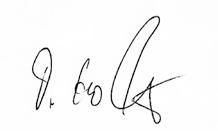
Dr. Med. Eva Höltl

138
Mag. Boris Marte
Wolfgang Schopf
Mag. Martin Wohlmuth
Association Members of »DIE ERSTE österreichische Spar-Casse Privatstiftung«
ANGYAN Dr. Thomas
ATTEMS Mag. Dr. Johannes
ATTENSAM Ing. Oliver
BADELT Univ.-Prof. Dr. Christoph *
BARTENSTEIN MA MMag. Dr. Ilse * (resigned 11 May 2023)
BERCHTOLD-OSTERMANN Mag. Dr. Eleonore *
BLAHUT Mag. (FH) Stephan
BLEYLEBEN-KOREN Dr. Elisabeth
BREITENEDER Mag. Bettina
BRETSCHNEIDER Dr. Rudolf
BURGER Dr. Ernst *
CATASTA Mag. Dr. Christine
CLARY UND ALDRINGEN MBA Dkfm. Maximilian
DRAXLER Mag. Christiane
DÜKER Dipl.-Bw. Gabriele
EBERLE Doraja
EGERTH-STADLHUBER Mag. Dr. Henrietta
EISELSBERG Dr. Maximilian
ERSEK Mag. Hikmet
FEYL Dr. Peter *
FLATZ Dr. Alois M.
FRITZ Dr. Dipl.-Ing. Michaela
GATNAR Anton
GEIGER Ing. Franz *
GLATZ-KREMSNER Mag. Bettina
GLAUNACH Dr. Ulrich
GRUSZKIEWICZ Mag. LL. M. Jan
GÜRTLER Dkfm. Elisabeth
GUTSCHELHOFER Univ.-Prof. Dr. Alfred
HAFFNER Dr. Thomas M.
HAGG MSc Valerie
HAINZ Dr. Bernhard
HARDEGG Dipl.-Ing. Maximilian
HAUSER Dr. Wulf Gordian
HEINISCH Dr. Michael
HIMMELFREUNDPOINTNER Friedrich
HOFFMANN MBA Monika
HÖLLINGER Mag. Dr. Susanne
HÖLTL Dr. Eva
HOLZINGER-BURGSTALLER MMag. Gerda
HOMAN Mag. Jan
HORNSTEIN-TOMIĆ Dr. Caroline
HUMER Rudolf
KALSS Univ.-Prof. Dr. Susanne
KANTA Mag. Helene
KAPSCH Mag. Georg *
KLEINITZER Dr. Peter*
KNECHTEL Dr. LL. M. Gerhard
KOLLMANN Mag. Dagmar
KÖPPL-TURYNA Priv.-Doz. Dr. Monika
KRAINER-SENGER-WEISS LL. M. Dr. Elisabeth
KRISTEN Dkfm. Dr. Walter
KUCSKO-STADLMAYER Univ.-Prof. Dr. Gabriele *
KÜHNEL MA Mag. Mariana
KUHNERT Dr. Caroline
KWIZDA Dkfm. Dr. Johann F.
KWIZDA MBA Mag. Johannes Eric
LAMEZAN-SALINS Dr. Dominik
LANDAU DDr. Michael
LASSHOFER Mag. Robert
VON LATTORFF MBA Philipp
VON LATTORFF Tatjana
LIEBEN-SEUTTER Christoph *
LOUDON Dr. Ernst-Gideon
MAIR Professor Dr. Johanna
MARENZI Dr. Stefan
MARTE Mag. Boris
MAYR-HARTING Mag. Clemens
MECHTLER Mag. Bernhard
MÜLLER Univ.-Prof. Dr. Markus
NEUNTEUFEL Ing. Johann (resigned 23 Nov 2023)
NIMMERVOLL Dr. Maximilian
NISS MBA Dr. Therese
OBERHAMMER Univ.-Prof. Dr. Dr. h. c. Paul
PIRKER DDr. Horst
PLACHUTTA Mario
POLSTERER-KATTUS Dr. Ernst *
PORTISCH Mag. Franz
PRÜLLER MSc Franz Karl
RACHINGER Dr. Johanna
RATH Mag. Philipp
REUTTER Dr. Georg
ROBATHIN Dr. Heinz
RÖDLER Dipl.-Ing. Mag. Friedrich
SALM-REIFFERSCHEIDT Dr. Franz
SCHEER Markus
SCHELLHORN Dr. Franz
SCHNEIDER Dr. Graham Paul *
SCHOPF Wolfgang
SCHÜSSEL Dr. Wolfgang *
SCHUSTER Walter
SKOPEK Martin
SORGER MBA Dipl.-Ing. Felix
SPALLART Dr. Michael
SPALT Mag. Bernhard *
STEIN-PRESSL Mag. Susanne
STICKLER Dipl.-Ing. Friedrich
STIMPFL-ABELE Dr. Alfons
STRADIOT Georg
SUTTER-RÜDISSER Prof. Dr. oec. Michèle F.
SZCZEPANSKI Valerie
TANRIYAR Suzan
TAPPEINER Univ.-Prof. Dr. Gerhard
THEISS Mag. Johannes
THURN UND TAXIS MBA Mag. Philipp
TRAUTTMANSDORFF Dr. Markus
TREICHL Mag. Andreas
TUMA Zdenek
UHER Dr. Thomas *
UMDASCH MBA Mag. Stefan
UNTERBERGER Dr. Andreas
WALLMANN Tom
WEINZIERL Mag. Christine
WEISER Dr. Stefan
WENCKHEIM Christiane
WIMMER Dr. Manfred
WOHLMUTH Mag. Martin
WOLF Dr. Richard
ZEILER Gerhard
ZIMPFER MBA Univ.-Prof. Dr. Michael
* inactive
140
(as at 31 Dec 2023)
HONORARY MEMBERS
BENISEK Walter
BLAHUT Dkfm. Dr. Dietrich
CESKA Dr. Franz
DORALT em. Univ.-Prof. Dr. Peter
ESSL Prof. Karlheinz
FÖLLSS Mag. Herwig
FUCHS Dkfm. Dr. Konrad
GALLE Dr. Klaus
GEYER Dr. Günter
GLEISSNER Dr. Friedrich
GÜRTLER Dr. Rudolf
HARMER Dr. Gustav
HAUMER Dr. Hans
HUTSCHINSKI Dipl.-Ing. Werner
JONAK Friedrich
KARNER Dr. Dietrich
KESSLER Dr. Heinz
KURZ Dr. Otto
LÖWENTHAL-MAROICIC Dr. Franz
MANG em. o. Univ.-Prof. Dipl.-Ing. Dr. Dr. h. c. mult.
Herbert
MARENZI Dr. Heinrich
MARSONER Dkfm. Dr. Helmut
MITTERBAUER Dipl.-Ing. Dr. Dr. h. c. Peter
NIEDERSÜSS Rudolf
PAMMER Dr. Ernst
RAIDL Dkfm. Dr. Claus J.
RAUCH Franz
RUSTLER Dr. Peter
SCHIMETSCHEK Herbert
SCHMITZ Dr. Richard
SCHNEIDER Dr. Georg-Jörg
SCHWARZENBERG Karl Fürst zu (deceased 11 Nov 2023)
SENGER-WEISS Dkfm. Heidegunde (deceased 19 Oct 2023)
SENGER-WEISS Dipl.-Ing. Paul
STREISSLER Dr. Erich
TAUS Dr. Josef
TUPPY em. Univ.-Prof. Dr. Dr. h. c. Hans
ULRICH Dr. Wolfgang
WALDSTEIN Georg
WIESMÜLLER Dr. Heinrich
WINCKLER Univ.-Prof. Dr. Georg
ZEIDLER Mag. Dr. Franz
ZERDIK Dr. Michael
Honours 2023
35-years’ membership (joined 3 Oct 1988)
GALLE Dr. Klaus
HUTSCHINSKI Dipl.Ing. Werner
KESSLER Dr. Heinz
MITTERBAUER DipI.-Ing. Dr. hc. mult. Peter
SCHMITZ Dr. Richard
141




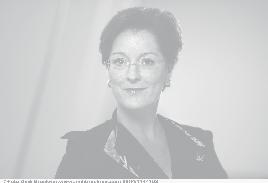

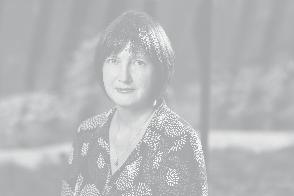






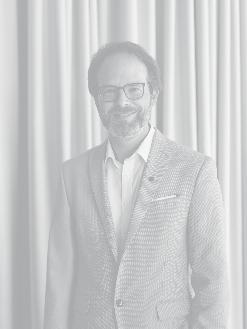


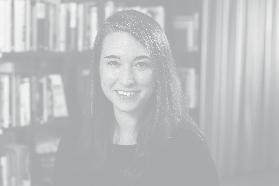




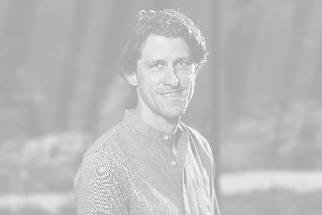
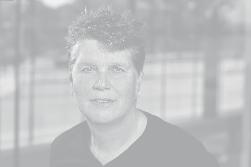



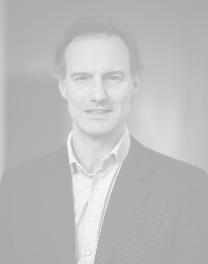




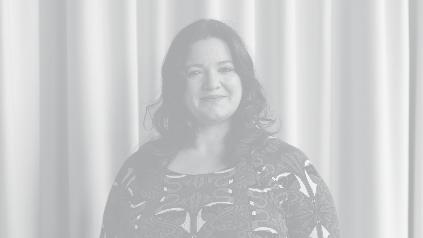
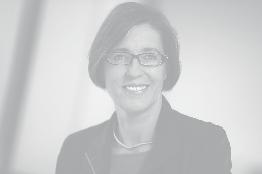
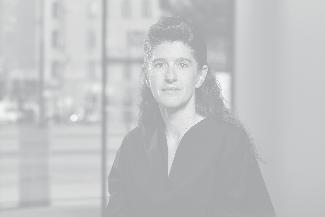
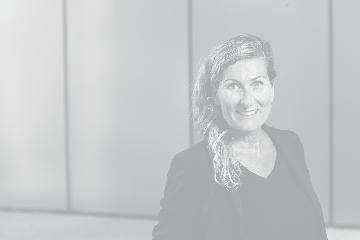
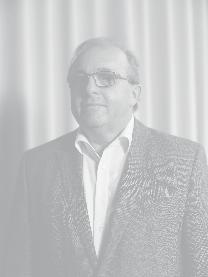





ERSTE Foundation Boards and Team
Supervisory Board
Andreas Treichl, Chair
Manfred Wimmer, Deputy Chair
Bettina Breiteneder
Maximilian Hardegg
Barbara Pichler
Johanna Rachinger
Philipp Thurn und Taxis
Markus Trauttmansdorff
Kurt Zangerle
Barbara Kampits, Assistant to the Chair of the Supervisory Board
Managing Board
Boris Marte, CEO
Wolfgang Schopf, Deputy CEO, CFO
Eva Höltl
Martin Wohlmuth
Franz Karl Prüller, Senior Advisor to the Board
Beatrix Beck, Assistant to the Board
Franziska Tamussino-List, Assistant to the Board
Project Management
Yana Barinova, Project Manager, European Policies and Ukraine
Florian Bauer, Director of Social Finance, Sustainability and Innovation
Ana Maria Cretu, Social Impact Investment Lead
Ursula Dechant, Grant Manager
Katrin Klingan, Curator
Hedvig Morvai, Director of Strategy and Europe
Barbora Orlíková, Project Coordinator
Rauno Pello, Head of Design and Research Manager
Marianne Schlögl, Strategic Partnerships Manager
Nicole Traxler, Social Innovation Manager
Heide Wihrheim, Project Manager
ERSTE Foundation Library
Jutta Braidt, Head
Communications
Maribel Königer, Director of Communications, Journalism and Media
Martina Bachler, Press Officer for the Managing Board and Supervisory Board
Sarah Hayes, Communications Expert
Miroslava Krása, Communications Specialist
Gerald Radinger, Communications Expert
Jovana Trifunović, Communications Expert
Finance, Law & Organisation
Sabine Altmann, Office Manager
Emma Liebhart, Office Manager
Simona Rhomberg, Counsel
Johannes Steiner, Office Manager
Ľubica Vopičková, IT Coordinator and Accounting Administrator
Eva Zalesky, Board Meeting Manager
143
(as at 31 Dec 2023)
PUBLISHING DETAILS
Publisher
DIE ERSTE österreichische Spar-Casse Privatstiftung
Am Belvedere 1, 1100 Vienna office@erstestiftung.org www.erstestiftung.org
Editors
Maribel Königer (editor-in-chief), Martina Bachler, Dani Mühlbacher, Miroslava Krasa, Gerald Radinger, Jovana Trifunović
Authors
Martina Bachler, Jutta Braidt, Maribel Königer, Jana Lutz, Oleksandra Matwijtschuk, Dani Mühlbacher, Natalie Tocci, Ovidiu Ţichindeleanu, Jovana Trifunović, Alexander Whitcomb, Martin Wohlmuth
Design
Atelier Anna Liska
Art Direction & Graphic Design Assistants: Lucia Průša, Marlene Posch
Photo Editing
Mario Rott
Proofreading
Barbara Maya
Translations
Barbara Maya, Douglas Fox, Communicate for you © ERSTE Foundation, Vienna 2024
Photos, if not marked differently © ERSTE Foundation
144













 Photo – Richard Tanzer/APA
Photo – Richard Tanzer/APA































































 European Commission President Ursula von der Leyen with US President Joe Biden (right) and Indian Prime Minister Narendra Modi at a Partnership for Global Infrastructure and Investment event during the G20 Summit in New Delhi on 9 September 2023.
European Commission President Ursula von der Leyen with US President Joe Biden (right) and Indian Prime Minister Narendra Modi at a Partnership for Global Infrastructure and Investment event during the G20 Summit in New Delhi on 9 September 2023.
















































































 ULRIKE LENTHE
ULRIKE LENTHE
 DIANNA
DIANNA



















































